#but the parts that are like 'and therefore an alien intelligence would find it impossible to comprehend' are weird and bad
Explore tagged Tumblr posts
Text
tbqh it's weird as hell to me that there's this given understanding about fictional aliens that they'd be surprised or confused by adaptability, but like, as far as we know and understand that is a fundamental quality of life itself not life on earth. In order to become a spacefaring species any spacefaring alien would've had to survive whatever space threw at them for billions of years as well as whatever their planet in specific threw at them, even the 'good' planet we know about is pretty fucking hostile to life. It's just implausible to me that like, among all the possible sapient species we'd be unique or interesting for the level to which we have the ability to adapt to situations, something that any biological creature of any origin would also need to survive long enough as a species to figure out how space works.
#I mean I also understand this is a common way to frame the mundane as interesting by stripping the normalcy of it#IDK I think the 'humans as space orcs' meta has gone too far#Like it's fine to examine humanity through that lens I think it's good to examine things like that#But then when you give that lens its own actual life you need to think a bit more for it to stay coherent#In many cases I think it completely ignores that it's making sweeping implications about non-human intelligences#In ways that just don't fucking make any sense#IMO at least#IDK I'm not positive I'm saying this in a way that makes sense but I'm right#What I'm saying is the parts of those posts that're like 'this is a neat thing about humans' are good and cool IMO#but the parts that are like 'and therefore an alien intelligence would find it impossible to comprehend' are weird and bad#Just seems like a really self-satisified way of looking at ourselves#Like you really think that no other alien species might IDK have a few instincts left over from the pre-sapience days?#They all just sprung from the stars fully formed beings of pure reason and science?#Just us we're the only cool ones in the whole fuckin galaxy huh
56 notes
·
View notes
Text
come be a season 12 truther with me; or what if dean and cas got together offscreen
Originally, I wrote this post to celebrate “Galaxy Brain” airing as Berens & Glynn gave us “The Future.” It’s been a while since that episode aired, and some things have changed about this meta. As such, there are multiple versions of this post floating around, so make sure to go back to the source for the most up to date version. For all intents and purposes, this post functions as a meta manifesto not unlike shipping manifestos from days of LJ past. In keeping with that tradition, this post is a close reading of Dabb Era Destiel in which I argue that by using narrative gaps, queer coding, and romance tropes, Dean and Cas are shown to be in an established relationship. Although beyond the scope of this post, it’s worth pointing out that keeping Destiel mostly off screen was a way for the creatives to bypass network censorship while still remaining true to the characters.
This post is divided into three sections. Section I focuses on giving an overview of why earlier seasons of Supernatural aren’t as compelling as season 12 as a turning point for Dean and Cas’s relationship. That said, special consideration is given to 09.06 “Heaven Can’t Wait” as a potential rest stop in our journey due to it’s significantly placed narrative gap as well as themes in the episode. However, this post isn’t going to examine season 9 trutherism in depth, though it does coexist with and allow for it. Section II analyses season 12 and proposes a timeline and justification for the shifting Destiel dynamic. Finally, Section III will offer an analysis of how Dean and Cas’s relationship has changed dramatically from previous seasons in a way that is most like the shift from a “will they or won’t they” pairing to an established one.
Before I move to Section I, I’d like to note something this post takes for granted: Dean and Cas are the main romantic subplot of Supernatural, and, in fact, their relationship is elevated to main plot for both characters in season 15. This post won’t argue about the canonicity of Dean and Cas’s feelings for each other, therefore, and so won’t spend time looking at many Destiel defining moments. I’d also like to make clear that this post also takes for granted that Destiel is being intentionally developed by the writers starting with Carver’s Era, and more so in Dabb’s.
I. Why Seasons 4 through 11 May Not be It
The tl;dr. here is that while there are many moments throughout these seasons that Dean and Cas could potentially get together, none of those moments are ideal for a bunch of reasons that can be summed up as really bad timing. I also think the narrative is actively pushing them towards a moment that works. We get plenty of stepping stones, especially once we hit seasons 8 through 11 (and 11 most of all).
Seasons 4 & 5:
I know there’s been a lot of get together fics over the years set in this time period, but I just don’t see it. Do I see them being intrigued and drawn to each other? Yes. Do I think either Cas or Dean would act on it? Nope. I’m not arguing anything re: Dean’s feelings, but with everything going at the time I find it hard to believe he’d pursue anything with his angel friend. Most importantly here, though, is that during this time Cas was still very alien and other. There was too much angel in him, and while he obviously came to care about Dean (and Sam) very much, I just can’t see him navigating the realm of human relationships. That said, seeing human!Cas in “The End” is the first we see of potential developments for how Cas could behave without his angelness interfering. Being human changes Cas a lot, beyond even his experience existing among humans, though that of course matters too. This development will be important later /wink.
Seasons 6 & 7:
Before anything else let me just recognize that if we could see some sexual tension in seasons 4 & 5, these two seasons come with our first taste of romantic tension. The pining! Also note the difference between season 4 Cas and season 6 Cas in terms of behaviour. He is much less the angel we saw in that barn in “Lazarus Rising.” In season 6, we have a Cas making misguided decisions guided entirely by his emotions – namely, not wanting to involve Dean with the war in heaven – which is peak human, honestly. Put a pin on how sad Dean is in both seasons with Cas’s absence. Finally, put a pin on this being our first moment of Cas doing things on his own to spare Dean and it not ending well (soulless!Sam, Cas “dying” after Leviathan) because this is *the* hurdle in their relationship (along with Dean’s lashing out and self-worth issues). With all this said, the marked distance between Dean and Cas in these seasons negates the possibility of them entering into any kind of relationship. Much like seasons 4 and 5, there’s too much going on.
Season 8:
Ah, yes, the summer of purgatory. If you thought we had pining before…! I think we’re all very clear on season 8 being a turning point for the show, not only because new showrunner, but we also get the bunker. TFW now has an HQ, which pretty soon becomes home. Yes, Baby will always be home, but the bunker becomes the *unmovable* safe haven that Baby couldn’t be. The bunker is a place to coalesce, and for all the amazing things Baby is, she is not that. The acquisition of the bunker marks a shift in the psychology of the show: with the stable home space we can start to imagine domesticity, a place to come home to, the stuff of ordinary living. Most of all, the bunker is emblematic of security, of safety –keep this in mind, as we go forward.
This season also continues to see Cas go down the path of independently solving his problems instead of asking for help from Sam and Dean (his family in a way heaven never was) – note that the better together issue is at play in different ways with Sam and Dean also, but I digress. I also want to point out disastrous instance #2 of Cas’s insistence on figuring it out on his own: he loses his grace, and the angels fall. As for Dean, season 8’s focus for him has much to do with Sam, and them coming face to face with their issues with codependency, which hit catastrophic levels with the gates of hell and Gadreel plots.
So despite all the deliciously angsty get together purgatory fics and spec, there’s too much distance between Dean and Cas on Cas’s part due to his guilt over betraying the Winchesters in s6 plus slaughtering angels plus unleashing Leviathan. We do see Dean being more emotionally open with Cas and continue to voicing his wish that Cas would just stay with him and Sam, and let them help. It’s clear as day how much Dean cares. The timing is still bad, though.
Before moving on to next season, let’s take a moment to appreciate that this is the season Dean admits being kinda done with one night stands because “always with the adios.” Remember the bunker as a sign of stability? Yeah. I wouldn’t say Dean is craving a relationship, exactly, but I think we can see that he does want something more (ahem also I’m nodding to Cas refusing to stay put just cause).
Seasons 9 & 10:
The most important thing to happen between this two seasons is Cas’s stint as a human for an extended period of time. There’s been plenty of spec and meta written over the years about the effects of being human on Cas’s grace (a proto-soul now maybe?). What we can say for sure, regardless, is that Cas is much more humanized once he becomes an angel again. The understanding he gets from being human doesn’t go away once he regains his angel powers. You’ll notice that while we still see some of season 4’s characterization, Cas is not the same as he was – he is alien to angels now and is more intelligible to humans. Additionally, in an interesting reversal from previous seasons, we now get to see the depth of Cas’s feelings for Dean (thanks, Metatron) as well as seeing him be more open emotionally, while Dean does most of the pushing away (first because of Gadreel, then because of the Mark of Cain). In short, the timing is still bad as Dean and Cas are largely kept apart both physically and emotionally.
9.06 Heaven Can’t Wait
This episode is my white whale, friends. While I’ve come to fully subscribe to the idea that something did happen between Dean and Cas during the fanfic gap, I don’t actually think it’s feasible that it marked the start of a relationship -- be it sexual or romantic. My reasoning here is quite simple: the timing is bad. Were it not for external events (Cas regaining his Grace and Dean taking on the MoC), the course would have likely differed. Furthermore, Dean’s guilt over making Cas leave the bunker as well as Cas’s own hurt and self-loathing pose a significant and as yet insurmountable obstacle, which is easily seen with how Dean and Cas’s character trajectories go separate ways.
YMMV on what exactly happened between them in that Motel, but something definitely did. Perhaps one day I’ll have a proper s9 trutherism post to link to here for more details (likely won’t be written by me, though).
10.16 Paint It Black
From the point Dean gets the MoC until the end of season 10, anything between him and Cas is quite impossible due to distancing, to say the least. Again, yes, the fic is really good, but alas. One of the reasons I’m bringing up this episode in particular is because of the confession scene. One, it’s a rare bit of explicit emotional honesty from Dean, and two, it tells me that while he and Cas may be well aware of the Thing™ between them, it’s still uncharted waters. It’s scary, and murky, and they’re unsure how to navigated it or if they should even try. Makes sense, too, there’s been A LOT going on since s6. Anyway, he’s the full confession:
You know, the life I live, the work I do…I pretty much just figured that that was all there was to me, you know? Tear around and jam the key in the ignition and haul ass until I ran out of gas. I guess I just thought sooner or later, I’d go out the same way that I live – pedal to the metal, and that would be it. […] Now, um… recent events, uh… make me think I might be closer to that than I really thought. And…I don’t know. I mean, you know, there’s – there’s things, there’s…people, feelings that I-I-I want to experience differently than I have before, or maybe even for the first time. […] Yeah, I’m just starting to think that… maybe there’s more to it all than I thought.
Can I just say, first, that this confession keeps me up at night because we never actually see anything done with it explicitly? I mean, obviously, I think we do in fact see the effects of this confession in the show, otherwise I wouldn’t be writing this behemoth, but still, like. Damn. Ok, so, remember when I brought up that thing in season 7 about Dean being kinda done with hook-ups? Here’s where that led us. We’re seeing a Dean here who wants more than what he has convinced himself he gets to have. He wants more than dying bloody. And when he talks about wanting to experience people and feelings differently, well, that says a lot not just on the queer coding front or the romantic front. I mean, jfc, Dean is accepting the idea that he can have more in life than just hunt until he drops, and he’s specifically talking about experiences at the interpersonal level.
Do you ever see a character having an epiphany and find yourself wanting to cry because this is it right here. Dean is just blatantly admitting he wants more and maybe he can make himself be open to that (!!!), which all culminates in season 11, so…
Season 11:
The pining is still here, but it’s worse now since it’s the whole plot? It’s been *checks calendar* 5 years of this. How are any of us still kicking I don’t know. Your slow burns could never. Cool worth noting points: Cas says yes to Lucifer (bad decision #2.5, lots of mitigating effects_I don’t actually hold it against him that much but Dean is another story & not entirely rational at this point); for the first time since the early days, Dean and Cas are on equal grounds: they’ve both fucked up a lot and have hurt each other. The issues this season are outside their dynamic. Amara and Lucifer here serve as externalizing forces for Dean and Cas’s problems: Cas checks out with Lucifer because he thinks it’s the only way he can help, Dean is caught up in the turmoil of Amara, the emblem of absence and avoidance of struggle. We do get something like an affirmation from the two of them to each other via Dean calling Cas his brother (and I want y’all to consider the historical queering of that statement, and Cas’s “I could go with you.” It feels like we’re headed to them being on the same page. By the end of the season, though, it feels like we’re getting a clean slate: Mary is back, nobody died, no end-of-the-world in sight, no interpersonal crisis. We’re also getting a new showrunner, so. No wonder. We’re gearing up for something, but I’m getting ahead of myself. What this season does that is super important is that it sets up the stage for the possibility of an actual relationship between Dean and Cas, something that has, up until this point, been pretty much impossible.
11.04 Baby
Y’all know what I’m about to quote here, right? That conversation between Dean and Sam about having something with someone who understands the life. Here we still have Dean reverting to the idea that it’s impossible, which is a direct contrast to the openness in 10.16. It’s understandable, though, considering there’s been little reason to think anything like that would be possible (see all the mess and poor timing from seasons past). The quote in question, though, marks a continuing development regarding the issues Dean is struggling with this season:
DEAN: Piper? That’s awesome. Heather. One-night wonders, man. Shoot, we’re lucky we still get that at all. SAM: Really? You don’t … Ever want something more? DEAN: I’m sorry, have you met us? We’re batting a whopping zero in domestic life, man. Goose eggs. SAM: You don’t ever think about something? Not marriage or whatever. But … Something? You know, with a hunter? Somebody who understands the life?
We wouldn’t be talking about this stuff all these years after Sam and Dean had a serious relationship if it wasn’t important, right? Also who else do we meet this season? That’s right! Eileen! And doesn’t that hit different with season 15 hindsight? And who does Dean have that understands the life? Whose stories have been intricately connected to his? Right now, this is all conjecture. A pipe dream Sam is revisiting, and Dean is skeptical about. Except, well. Look at what we get in “Into the Mystic” and “The Chitters.”
11.11 Into The Mystic
I’m bringing up this episode as a cross reference to “Paint It Black” as well as to complement the talk from “Baby,” and to show, again, that, for all the closeness between Dean and Cas, there’s still a marked distance they haven’t yet bridged. There’s still truths they haven’t told each other. Thanks Mildred for the delicious exposition:
Darlin’…If there’s one thing I’ve learned in all my years on the road, it’s when somebody’s pining for somebody else. […] Oh, don’t try and hide it now. Follow your heart. Remember?
11.19 The Chitters
And here we see some validation to Sam’s imagining of a possible future with someone else. We actually see hunters who not only are married, but they both make it out alive. Jesse and Cesar get their happy ending. They make the dream come true. And the reality of it important not just for Dean to see, but Sam too.
Dean: [with realization] Oh, so … [points back and forth to Jesse and Cesar] Cesar: Yeah. Dean: Okay, that’s… Cesar puts his beer bottle on the table and looks at Dean, while Jesse is being silent. Dean: What’s it like, settling down with a hunter? Cesar: Smelly, dirty. [turns to Jesse] Twice the worrying about getting ganked.
I’d like to point out, too, that the fear of getting ganked is thematic when it comes to the tension between Dean and Cas. More on this when we hit s13.
Alright, now, having said that, let’s take a look at season 12. Bear in mind, this is the official start of Dabb’s era, even if he kinda began taking over in season 11, and the change in vibes is obvious. In fact, 12 jumped out at me as a turning point, in hindsight, after getting smacked by the domesticity of seasons 13 and 14.
II. Why Season 12
[Out of date section. Update coming soon when spoons. After significant debate, I’ve altered the definitive start of Dean and Cas’s friend-with-benefits-with-mutual-pining relationship to between 12.02 and 12.03. I briefly explained why here, and yes it’s a shitpost--still true tho.]
Finally, the promise land, y’all. Getting right to it: what s11 was for Dean in terms of setting up the relationship stage, s12 was for Cas. In its initial beats, any way. That is, until the Kelly debacle, this was the longest Cas has been around the bunker and with the exception of seasons 13 and 14, it’s one of the first times we get to see how Cas might actually fit into the bunker-as-home. Things seem remarkably chill. Of course, we’ll notice that there’s still a lot of baggage hanging around because despite Dean and Cas being in a more stable place, they haven’t actually dealt with their interpersonal problems. I didn’t single out directly this episode, but do keep in mind Cas’s declaration in 12.09 First Blood as far as how much the Winchesters matter to Cas & how we also see Dean and Cas be particularly singled out with them seating together in the backseat of the Impala. What we also see this season is Cas trying to prove he is worthy of this family, his family. He’s not fighting for heaven or to right some grievous wrong (a la s8). No, this season he’s fighting to spare the Winchester, to bring them a win. To bring Dean a win. The major disconnect is that Dean (and Sam & Mary) already sees Cas that way, he doesn’t think Cas has anything to prove. And just maybe, Cas starts believing that too – or, at least, believing it enough.
12.10 Lily Sunders Has Some Regrets
This episode, oh my god, the goodness. In the wake of 12.09 we have Dean and Cas in a tiff because Cas mistake #3 (killing Billie and “cosmic consequences”), this is a pattern. Twice the worry of getting ganked, etc etc. But where this episode really shines is through the contrast between Ishim’s obsession with Lily and Cas & Dean’s mutual affection for each other. Ishim sees no difference here and, to him, Cas’s feelings for Dean are a human weakness. Returning to my point about human!Cas, this episode underscores that Cas’s increasing humanity is what puts him in the place where he can want what Dean wants instead of either being too alien to get it (see s4 & 5) or unable to experience it properly (Ishim).
12.12 Stuck in the Middle (With You)
Cas’s trajectory culminates here with the whole I love you (@ Dean), I love all of you (@ Winchesters). Let’s note too that Cas is dying here, in a way that is much more human than going up in light. This declaration of different types of love is entirely human. It’s also a definitive step wrt to Cas and Dean’s relationship because of what happens in 12.19. This. is. it. Oh, and, of course, let’s not forget to point to Dean’s face when Cas says that “I love you,” and how terrified he is that Cas is dying. Might make one rethink some things, hm?
12.19 The Future
This episode is simply hella suspicious, and all the kudos to Berens and Glynn for writing it. It’ll haunt me forever. Consider watching it again and just questioning everything. So. Weird things:
1. Dean’s reaction to Cas no getting in touch as opposed to Sam’s. Dean is pissed, which is Dean-speak for worried out of his mind. Sam is very worried, too, and puzzled, but he’s mostly expressing his relief that Cas is back. But Cas has gone awol before, but this time Dean is much more worked up about it; Sam takes note of this, too. Now, let’s imagine that maybe the events of 12.12 led to something happening between Dean and Cas. Then Cas decided to leave to find a lead on Kelly, but eventually Cas decides to work with Heaven and goes radio silent. For days. Having taken a chance, and something having happened between them, how would Dean react to Cas just going poof and not contacting him – despite Dean having called Cas multiple times.
2. Cas knows about the Colt. Ok, nothing off there. But when he goes to Dean’s room to talk, right after Dean leaves we see Cas looking around briefly. Like he know Dean would keep it in there. Maybe Cas had looked other places already. Who knows. What we do know is that eventually he does find the Colt not only in Dean’s room, but under Dean’s pillow. Sam didn’t even know the Colt wasn’t in the safe. So how did Cas know?
3.“He came into my room and he played me.” So, this quote right there, makes it seem like some seduction for personal gain, right? But can you see Cas actually doing that if they hadn’t gone there previously? For Dean not to suspect anything and go with it? There’s plenty of plausible deniability here, but the gaps in time in the narrative make me question what is there in those spaces. The scene where Cas tried to give Dean the mixtape back doesn’t read like “playing,” so it’s about a different interaction. Hm. Hmmm.
4. Dean and Cas’s brief conversation in Dean’s room is clearly Dean just wanting Cas to stay, so they can work (and be) together – because they’re better that way. Which, yeah, truth, but also ow.
5.And most importantly: When did Dean give Cas that mixtape??? How did that happen?
Sequence of events: Cas tells Dean he loves him – Dean is clearly shook by it – Dean gives Cas a mixtape (romantic gesture, often a declaration of feelings; in true Dean speak too lolsobs) – Cas goes awol - Dean acts like he got ghosted by his new bf -?????- Cas somehow knows the Colt is under Dean’s pillow – "He went into my room and he played me."
What am I supposed to do with that, hm? Like. Y’all realize they probably had some emotionally constipated getting together moment, right? Something that Dean clearly initially thought meant things were gonna change, now. Something that Cas couldn’t allow to happen until he could give Dean a win. Y’all are seeing this, yeah? I’m not saying they slept together and were full of feelings, except that’s kind of what I’m saying. But YMMV, there are other possibilities beyond sex. The full of feelings isn’t up for debate, though, even if the whole thing is informed by ridiculous amounts of miscommunication.
III. Seasons 13 through 15 As Established Relationship
Regardless of what happened in season 12, exactly, I can’t shake the feeling that something did happen, and something did change. My reasoning here is actually really simple: in comparison to previous seasons, Dean and Cas’s dynamic shifts significantly come season 13. I know some folks have been disappointed with some of season 13 and then season 14 for having dialed back on the destiel side of things. And, hey, maybe there’s truth to that in terms of backstage stuff, but I also want to point out that...well, the dialing back isn’t quite dialing back is it? Let’s look at 13 a little more closely:
Season 13:
So I said the deancas dynamic changed, right? I also think that change caught us unaware because the pivotal turning point that would cue us in never happened on screen as well as being subsumed by Cas’s death and Jack’s birth. But if I ask you about deancas in season 13 what would come to mind? Grief arc? Brokebacknatural? How domestic Dean and Cas are? There’s just something easy about their relationship after Cas returns from the Empty. The tension we’d grown so familiar with over the years is gone. Actually, it feels like we skipped the getting together bit of their relationship and went straight to established relationship and parenting. Some of the most peak married deancas moments we see circulating? Season 13, (and 12.10). It’s a lot, and it’s different, and it’s amazing.
13.01-13.05
Dean’s grief mini-arc. He was acting like a widower. Here’s me vaguely gesturing towards the mapping of Jonh, Mary, Dean, and Sam onto Dean, Cas, Sam, and Jack. And the reunion? I can’t help but be giddy at the song choice: “it’s never too late to start all over again.” To. Start. All. Over. Again. I’m just saying.
13.06 Tombstone & 13.16 Scoobynatural
I’m not going at length about these episodes, I just want to point out that they reveal that Dean and Cas have a whole thing going on off screen: they watch movies together, Cas knows about Dean being an angry sleeper, Cas seems to have been aware of the Dean-cave before Sam was. It’s little things like this that are examples of the narrative gaps surrounding Dean and Cas that have cropped up over the years. I don’t think it’s unreasonable to wonder what else could be hiding there. And when did the movie nights alluded in “Tombstone” happen? Maybe in season 12 when Cas in hanging around the bunker? The same period when Dean and Cas seem to be coalescing into something safer and more stable? Something that we never see come to a head because plot happens and Cas dies? Something that is immediately taken back up once Cas is alive again?
Season 14:
Overall, this season is more of what we got during 13, but it had two high notes I wanted to single out before ending this already too long post.
14.15 Peace of Mind
Look me in the eye and tell me Dean and Cas talking in the kitchen about Jack doesn’t read like husbands talking about their child. Look me in the eye and tell me Cas just texting Dean to gossip about Sam isn’t couple-y as hell.
14.18-14.20
Ah, yes, the divorce arc. Awful. Terrible. The culmination of Dean’s problem in all this: he lashes out, he pushes Cas away, his anger is alienating. Cue all of us suffering. But while Dean is clearly in the wrong in how the deals with his feelings, let’s not pretend some of his anger doesn’t come from a long established, and unaddressed, rift between him and Cas, which had its last traumatic turn when Cas died in s12. Dean isn’t being rational here: he saw Cas doing something on his own, and he saw that his mother is dead. What else could happen? Why won’t Cas just trust they can work as a team? What if Cas died again? And why should Cas put up with Dean’s behavior without knowing the cause? How can any relationship work this way? But notice how caught in the middle Sam was during all this. Notice how Jack is running off and acting out. The whole family is falling apart. Divorce arc, indeed.
Season 15:
But what about what we’re building up in 15? That seems like it could be a getting together plot, too, right? Well, yeah. It could very well be. But I’d argue the tension we’re seeing isn’t a will-they-or-won’t-they because they already have. We’re are watching a getting back together plot! The tension is, instead, will-they-or -won’t-they use their words to talk about the baggage that has kept them from truly being confident about their relationship. That’s the crucial step in their togetherness that they’re still missing, which is also the bedrock of the divorce arc that spanned twelve fucking episodes -- y’all, that’s half a season.
And technically? We’re not even done with yet because Cas never let Dean finish his prayer/confession in purgatory. What’s more, Cas hasn’t grappled with his role in the breakdown of their relationship, either: that he keeps going off on his own and getting hurt (and getting other people hurt), and Dean has to deal with the fallout. The deep emotional understanding, the truly being on the same page is what we’re on the edge of our seats for. We’re waiting to see what else Dean had to say, and what will happen when Cas’s deal with the Empty comes to light.
Finally, could we still have this plot without Dean and Cas having gotten together off screen? Sure, but I think the stakes are higher if they already did have something between them. If they actually have an established romantic relationship going on. Something real and tangible and as of yet much too fragile.
"...you asked what about all this is real. We are."
#destiel#deancas#supernatural#spn#spn meta#this thing is gargantuan yikes#anyway enjoy? let's chat#my writing#this thing is half meta half my adhd unleashed
433 notes
·
View notes
Text
Ramblings and crazy theory time about GK chap 266 “Pinky Finger Bones”
So... with this chapter we begin digging into what happened in the past. Into what happened to Wilk... but also into what happened to Tsurumi.

He clearly stared into the abyss and the abyss stared back at him... but what’s worse is that Tsurumi became much more scary than the abyss itself.
By the way you might notice a resemblance with the quote “He who fights with monsters should look to it that he himself does not become a monster. And if you gaze long into an abyss, the abyss also gazes into you.” [‘Beyond Good and Evil’ Friedrich Nietzsche] which loosely means “When you confront evil, make sure it doesn’t influence you.”
Well, it’s clear Tsurumi not only let himself influence, he sadly became worse than the ‘monster’ he was fighting.
But let’s go with order.
The cover… is more like part of a flashback scene.
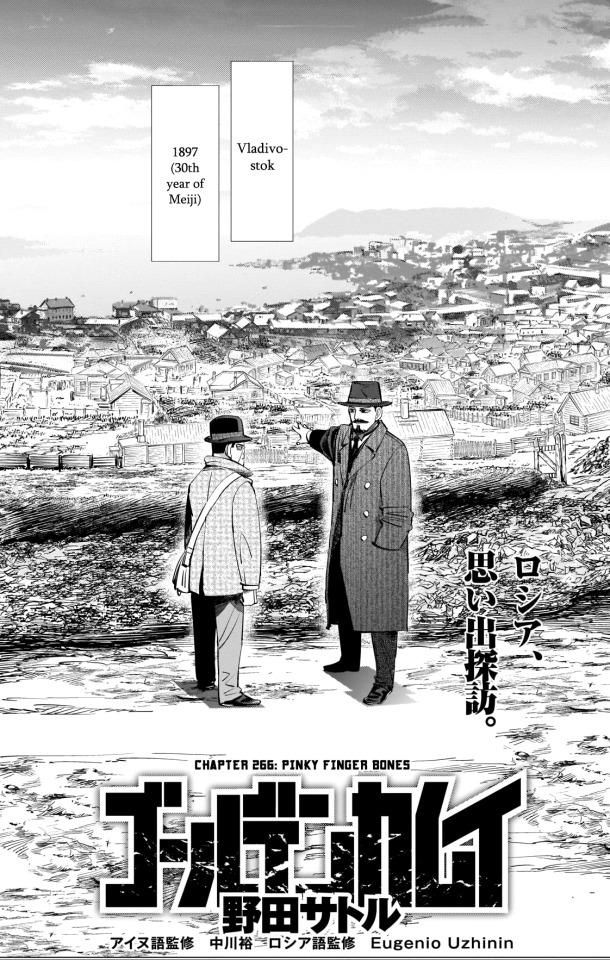
It shows Tsurumi and Tsukishima in Vladivostok, in 1897. Therefore we’re at the point in which Tsukishima was released from jail and was working as an intelligence officer with Tsurumi in Russia.
They are shown alone, but it doesn’t necessarily mean they went there alone, as Tsurumi could have other men with himself, to create a spy network. Or not.
We’ll find out only if it’s relevant to the plot so, for now, I’ll let it on hold.
Anyway Tsurumi and Tsukishima talk of how, since Vladivostok is the only Russian port that doesn’t freeze and can be used all year round, it’s a strategically vital point for Russia but also for Japan. Central had made appoint to let Tsurumi know they need to conquer it if they go at war with Russia.
At that point a Russian man spot Tsukishima and starts asking him if he is Japanese and knows a man named Hasegawa who disappeared without a trace 6 years ago.
As Tsukishima struggles to understand what he says (he’s clearly not well versed in Russian yet) the man talks about the bodies of Hasegawa’s wife and daughter, but we don’t get to hear what he says about them.
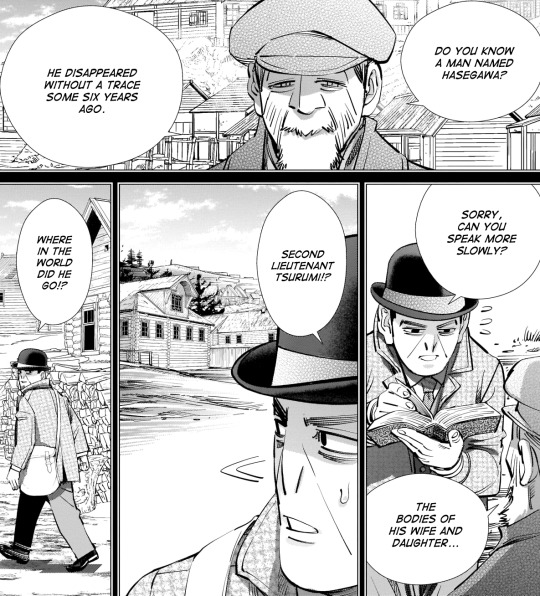
Tsukishima turns to discover Tsurumi has disappeared and, searching him, he finds him in front of Hasegawa’s burned photo studio.
Tsurumi’s expression, which Tsukishima can’t see, is interesting. His eyes are shadowed by the brim of his hat (while Tsukishima aren’t) and his eyes are stretched thin, many stress lines under them.
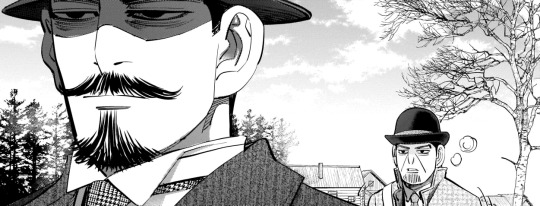
He’s probably lost in painful memories, which are likely now wrapped by the hate he feels for who caused his tragedy.
When Tsukishima reads on the sign ‘Hasegawa photo studio’, he realizes it’s the name the Russian was talking about. I’ll be honest, the coincidence is a little too forced. I mean, to have a random Russian guy asks to a random Japanese (let’s remember Vladivostok HAD a Japanese district so Japanese people is not that impossible to spot there) if they knew Hasegawa who disappeared 6 years ago and, COINCIDENTALLY, this Japanese is with the guy who, in the past, was Hasegawa, a guy who apparently doesn’t hear the question and marches straight to Hasegawa photo studio (they weren’t that close, Tsukishima lost sight of Tsurumi and had to search for him) so that Tsukishima can connect some dots back then and a lot more in the present is... well, way too providential.
It would be different if that Russian had a reason to check all the Japanese he were to spot and had done so for 6 years but no reason is given. We aren’t told he was Fina’s relative (Fina has a family to whom she was supposed to return the day she died)... and therefore pretty invested in the tragedy and it’s clear he’s not part of the secret police or he wouldn’t give Tsukishima random details. Tsukishima isn’t even standing near Hasegawa’s house at the time he was questioned, so it was possible to speculate they knew each other.
That guy who spoke with Tsukishima was just a Russian who woke up that morning and decided, spotting some Japanese, to ask him about a guy who disappeared 6 years ago for... no apparent reason beyond plot convenience.
But okay, let’s go on.
We’ve left Tsukishima connecting the photo studio with the guy the Russian mentioned, relying to Tsurumi the Russian guy mentioned ‘something’ about that man’s wife and daughter.
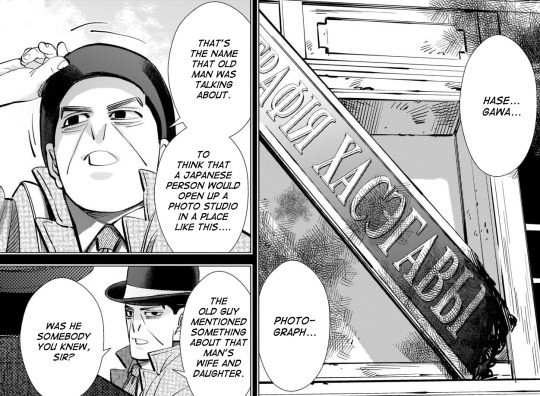
At this point I wonder if there’s a reason why we aren’t told what that something is. I would think that the fact that their bodies got burned up in the fire wasn’t something to discuss or wonder about but maybe... there’s more?
I don’t know.
Anyway Tsukishima wonders if Tsurumi knew Hasegawa, which really, seems logical enough as Tsurumi came there to watch his burned shop and Tsurumi denies it, saying there’s plenty of Japanese people in Vladivostok (which again make weird how the Russian guy asked them if they knew about Hasegawa). Tsurumi then claims Hasegawa should have been odd for wanting to open a shop away from the Japanese district, his eyes hidden by the brim of his hat and I facepalm here because he’s basically lampshading that Hasegawa had to be a spy for wanting to do so...

which seems uncharacteristically careless from him... unless he wanted Tsukishima to actually question him further... to push him to talk because maybe he too needed to talk but couldn’t... but Tsukishima is evidently ignorant in spy matters so he doesn’t get the hint.
He doesn’t lot go though, as Tsukishima remembers Hasegawa was Tsurumi’s mother’s maiden name, whom he noticed when Tsurumi went to pay his respect to her grave.
Tsurumi compliments for Tsukishima’s good memory and deflects Tsukishima’s suspicions saying it’s a common name in Niigata.
So we’ve some info about Tsurumi to ponder about, like how his mother is dead and how he was an Hasegawa so there’s to wonder if he was related to the ‘Hasegawa senior’ which whom he supposedly came in Russia as a teenager.
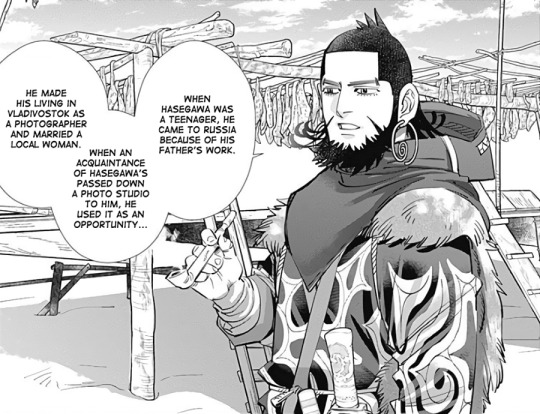
Was the guy his father using his mother’s maiden name? Or a maternal uncle? Can it be there was originally an Hasegawa Koichi and Tsurumi and him swapped (swapping identity with someone was a common spy technique)? If that’s the case was Kouichi a cousin of Tsurumi?
Or the guy never existed and it’s just a cover story? Hard to say, interesting to speculate.
Anyway we jump back to the present and to Tsukishima, a vein popping on his check, connecting the dots and realizing ‘that Hasegawa’ was actually Tsurumi.
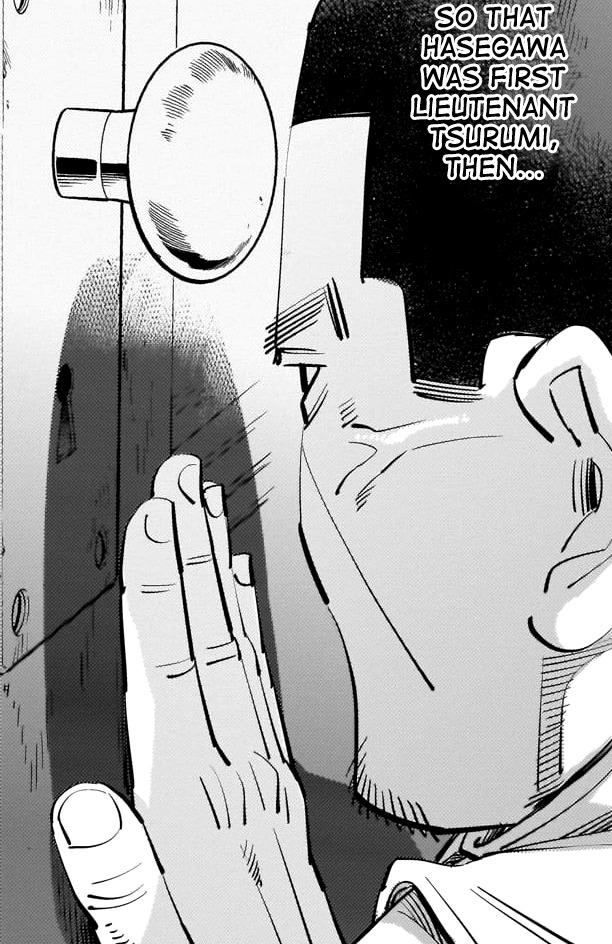
Tsurumi then goes and says that 50 years ago some of the more extremist Ainu gathered up a great quantity of gold dust and were planning something... and here I pause again.
So, does this mean whose extremists did take a part of the hidden gold? Or that they were the gold’s guardians, aware of where it was hidden?
If it happened 50 years ago, unless the gold was stolen by the hideout, this means the extremists were the same guys who knew about the hideout. So, Ariko’s father could have been one of them as well as Asirpa’s grandfather (my bet is he’s the one who knew where the gold was).
Anyway the Ainu’s plan in order to fight the shogunate was to get a captain of the imperial Russian navy to divert Russian warships, munitions and such to them... and I think Tsurumi is exaggerating matters a bit because it’s really not enough to own warships, you also need men to drive them and I’m not sure how many Ainu there were who could do it but whatever, maybe back then was easier to pilot warships and use them to go to battle... but still, I kind of feel it would be complicate for him to ‘smuggle out’ Russian warships... I mean they aren’t exactly of the size you might ‘lose track of them’.
Going on.
To explain why the Russian captain would be willing to do so, Tsurumi says it’s common among soldiers who’re stationed far from central command to do as they prefer, which is something Tsurumi is intimately familiar with as he’s doing the same in Hokkaido.
However everything ended when the ship on which was the Russian captain crashed into a passenger ship in what’s called the “Russian warship Kalevala incident” of 1867 (which is completely fictional as no such thing happened in the real world) in which both ships sunk carrying everyone on board with them.
Timeline wise 1867 is also the year in which there’s the restoration of the imperial rule, with the Boshin war starting in 1868.
According to Tsurumi, since the Ainu lost the Russian captain willing to sell them weapons they should have felt at total loss about what to do with the gold.
Tsurumi then claims Wilk came in Hokkaido to search for that gold so that this was the start of everything that happened afterward.
Asirpa asks Sofia if this means it was Tsurumi the one who taught Wilk, Kiro and Sofia Japanese.
We can’t see Sofia’s face, as she’s holding her head down, but she’s sweating and panting, thinking back to when she held little Olga.
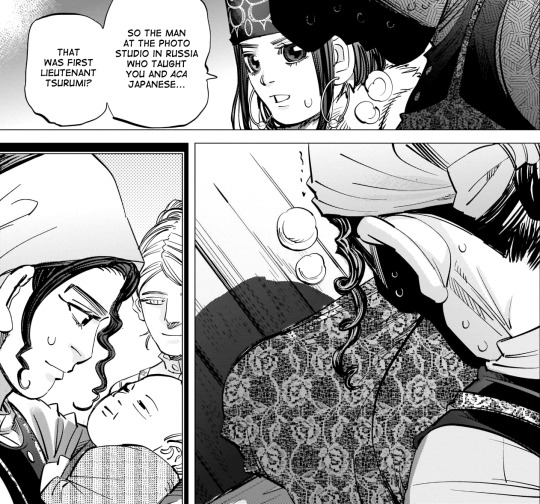
Clearly that incident of which she felt responsible still weight a lot on her, like an open wound that never healed... which in a way makes her similar to Tsurumi. Tsurumi though is trying to get revenge for that incident... while Sofia is trying to make up for it.
She then notices that Tsurumi has moved really close to her, his hand still holding the finger bones of Old and Fina, rubbing them.
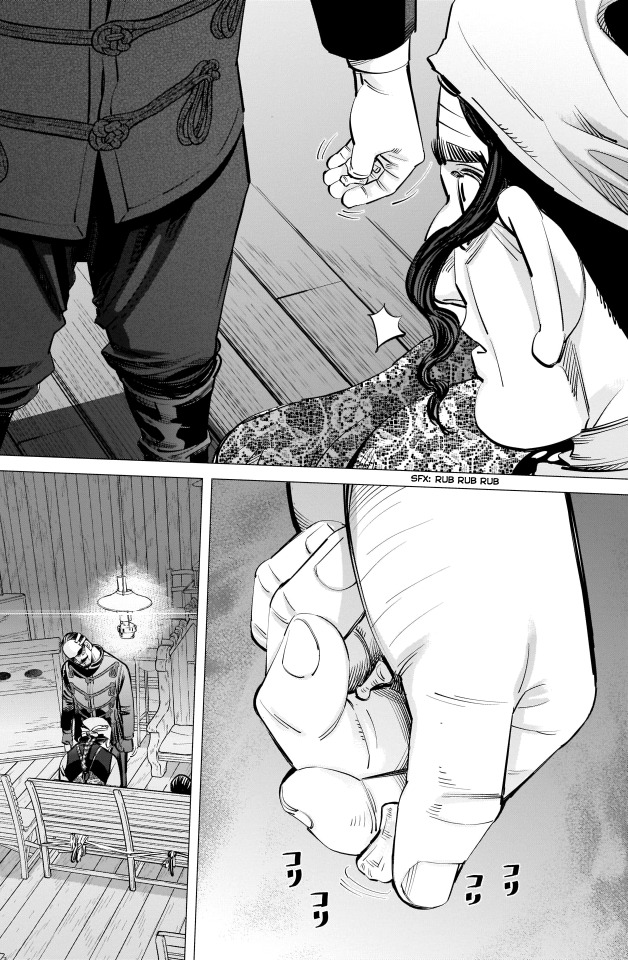
We can see Tsurumi’s head is inclined on a side, in a way that reminds me of how Usami looked at the dead horse... although Usami was tilting his head on the opposite side.
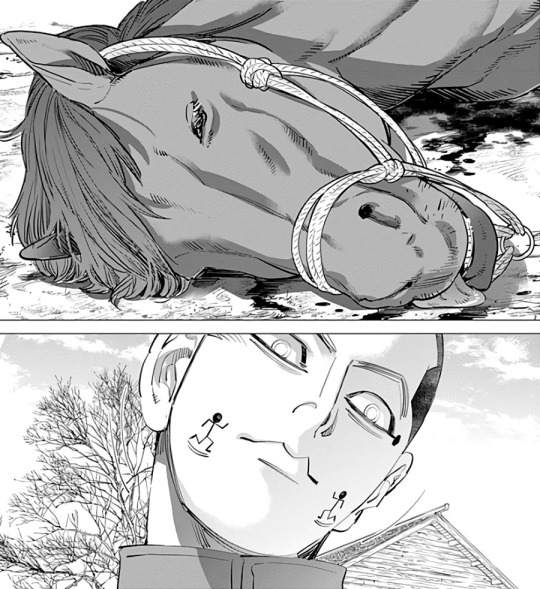
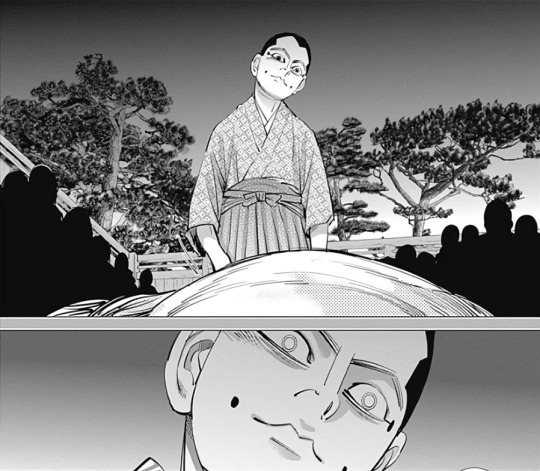
In normal body language, tilting the head on a side indicates sincere interest and curiosity... and it can fit both situations too... only Noda also makes it creepy, as if both Usami and Tsurumi were interested yet completely detached, as if they were watching something alien to them, the angle being just a little bit too much to feel natural.
Tsurumi then goes on claiming that, on the day his wife and child died, he was the only one the secret police was after and if Fina hadn’t picked up Wilk’s wanted poster she wouldn’t have come back. Tsurumi through tried to date the blame to even sooner, claiming that if Wilk and co had never gone to his photo studio, his wife and child might not have been killed.
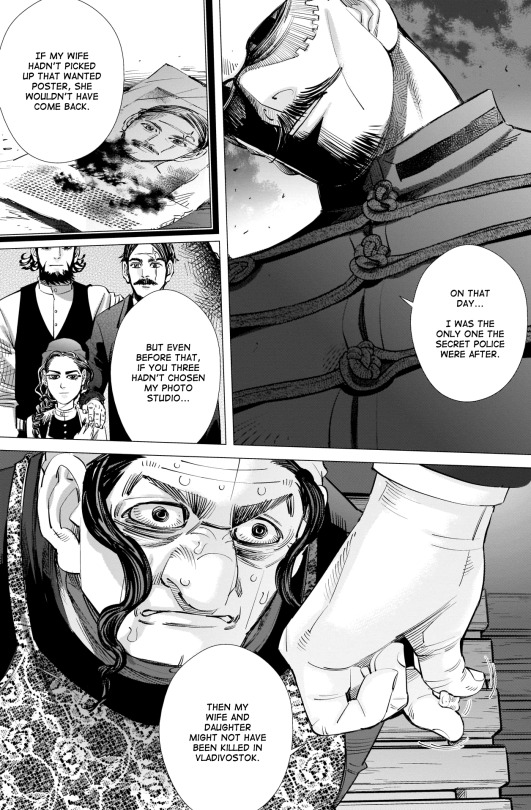
Sofia’s eyes are locked on Tsurumi’s hand rubbing that finger bone, as if she were hypnotized... and I’ll repeat what I said before.
Sofia has spent all those years after the death of Fina and Olga trying to make amends. As she believes her cause will bring benefit to the Russian people (and therefore to people like Sofia and Olga), she continued to fight for it, giving up on Wilk, the man she loved and on ‘happiness as a woman’ all to fight for her cause and atone for that innocent lives who died that day.
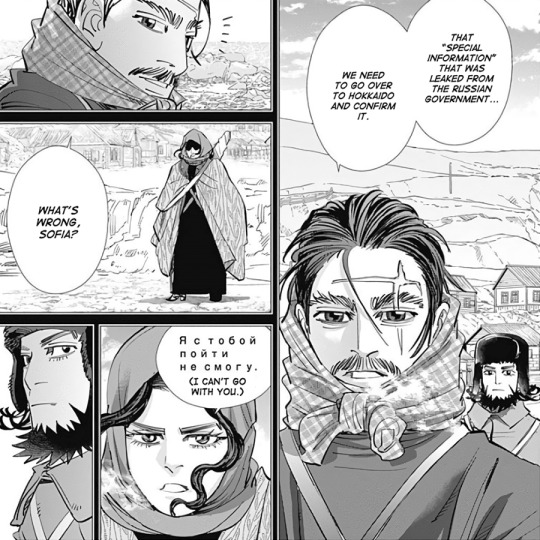
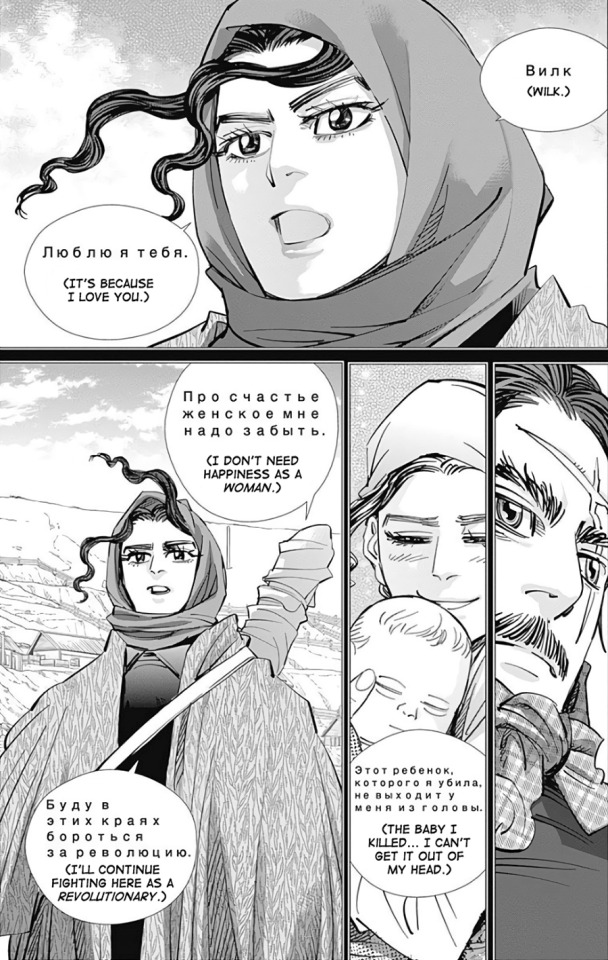
Of course meeting Hasegawa again and being blamed fully for those deaths is a big blow to her, it’s the trauma, the sin, she never overcome but tried to by doing something constructive, something she believed would be positive for the others.
It’s worth to remember Sofia came from aristocracy, she didn’t need a better Russia to live an easy life, she could have just continued being a pampered princess and instead she devoted herself to improving her country.
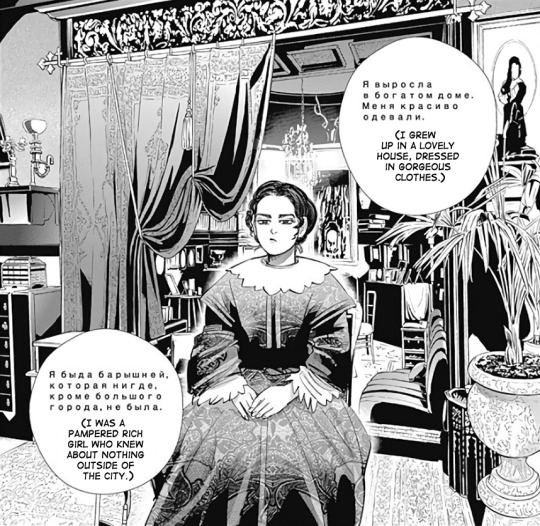
We can argue the methods she chose might not be the best, and how they put in danger innocent people, but the aim is selfless.
On the other end we’ve Tsurumi, whose family fell in disgrace... likely short after the Meiji restoration and possibly due to it.
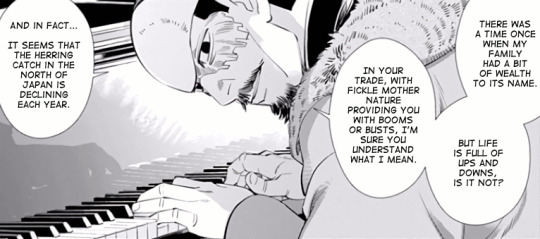
He went in Russia as a spy probably in an attempt to prove himself and improve his and his family’s life, likely married in order to have a cover but ended up falling in love with Fina and he clearly adored his daughter, Olga.
Still he continued his job as a spy even if that put in danger his own beloved family, he continued teaching Japanese to Wilk and Co even if he knew they were partisans and, ultimately, for some reasons, he get discovered by the secret police.
Somehow he finds out they’re coming from him so, instead than denouncing himself, he sends away Fina and Olga without explaining Fina nothing.
Even if she promised not to, Fina could have gone back for other reasons, it was coincidence it was just because she saw the wanted poster.
When Wilk and Co shows up at Tsurumi’s house HE LET THEM IN, before telling them they can’t come anymore. He could have denied them entrance and send them away, he could have told them he was a wanted man and the secret police was about to jump on him but no, he let them in.
When the secret police arrives he doesn’t just hand himself to them but stop to talk with them at the door, knowing inside he has three revolutionaries who will realize the police is circling the house and that will feel threatened. When they start attacking the police he doesn’t tell them the truth but let them discover it from the Russian policeman and then he hands them a machine gun so that they can fight the police.
Tsurumi was an ACTIVE cause of the incident as much as Wilk and Co if not MORE because he has something to lose and that he was exposing to risk, Fina and Olga.
Yet now he’s shifting all the blame to Wilk’s party, trying to use Sofia’s sense of guilt to get leverage on her and force her to be cooperative so that he could get the gold and get revenge over Central.
Now... I’m positive that Tsurumi suffered A LOT for the death of Fina and Olga, that it was traumatic for him... but while Sofia is trying to make up for it, Tsurumi is just trying to take revenge, trying to frame the death of his beloved ones as something that has a meaning because it becomes an helpful step in his climbing to get the gold and the control of Hokkaido.
In fact, and I’ll flash forward a bit, Tsurumi wants to know what purpose his wife and daughter served in the world, claiming they died because of Wilk and Co and therefore they should give him some sort of compensation.
In this way he uses his own loss to extort information from Sofia so that he could accomplish his goal.
Mind you, all this is a way to cope with pain that’s similar to Sekiya’s, who wanted to know why his daughter had to die, but, differently from Sekiya who was completely blameless for his child’s death, which was merely an incident he had no control over, Tsurumi was also actively to blame for his wife and child’s death and he’s trying to cope with his pain by shifting the blame on others and by trying to turn those deaths into meaningful steps on the way to his original goal, improving his own life.
Ironically, as he loved Fina and Olga, it’s unlikely reaching his original goal will bring him solace, it’s another copying mechanism to excuse himself, if he can justify his wrongdoing to them as a necessary step on the way to his goal, he believes he will feel better... which is clearly a lie. This is not the way to cope with such a traumatic event but it’s a common mistake, an attempt to dim the pain by not coping with how he’s responsible for his own loss.
I pity him for how terrible his pain should be... but there’s no turning around how his way to cope with it IS terrible in any possible way.
But let’s go back a little to Tsukishima and Koito who’re eavesdropping on the conversation.
Tsukishima remembers how, during the war they tried getting control of Vladivostok... and how Tsurumi told him they should expand the territory for Japan’s sake and that they should make certain that their comrades were sleeping in Japanese soil. Now though he (and Koito if his white irises and vein popping are to be taken as a hint) is pissed off because he fears Tsurumi’s goal is just his own personal way of mourning his wife and daughter...
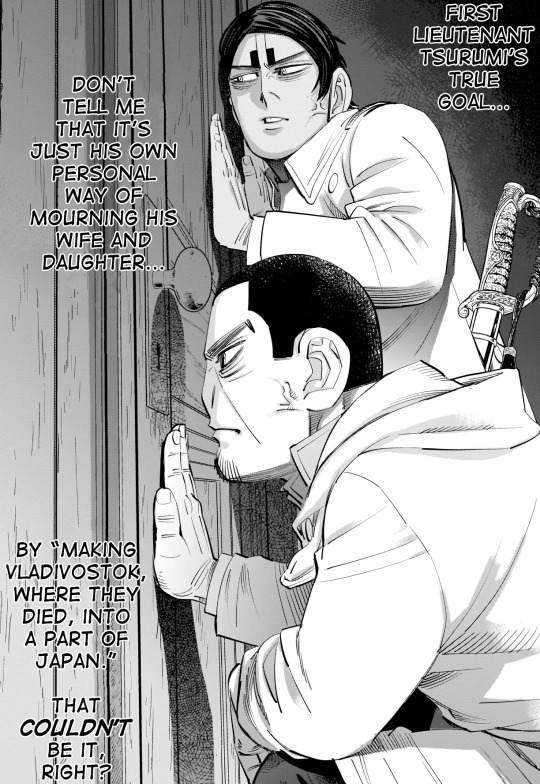
...and I facepalm again. Hard.
Now, okay, Koito can be pissed off, he made clear he uphold certain values and that he believed Tsurumi was doing it for a selfless reason only, the well being of his own soldiers, plus he had never experienced being poor so he can’t understand why people would want to be rich. He’s young, he was used and lied at but still wanted to trust Tsurumi to be more noble than he was so okay, he can be angry.
Tsukishima though was okay with tailing after Tsurumi even when he didn’t know which is true goal was...
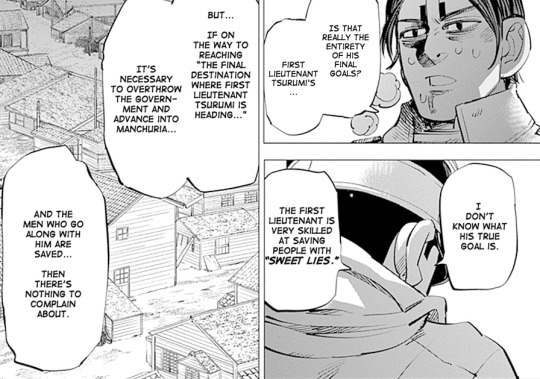
...even when he believed Tsurumi might not have a true goal...
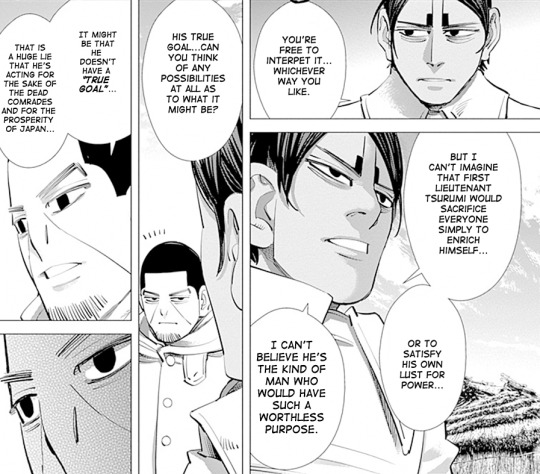
...just because he wanted to believe what Tsurumi was doing would benefit the ones following him... and now he is upset because Tsurumi had a goal... but one that was beneficial to Tsurumi? How was Tsurumi not having a goal better?
And how this change the game, really?
If Tsurumi’s actions were genuinely better for the men in the 7th, they remain beneficial regardless of Tsurumi’s ultimate goal, which isn’t meant to harm them, after all.
And just because Tsukishima decided to sacrifice his love story with Igogusa (which, Tsurumi’s lies or not, was something Tsukishima decided on his own)... well, this doesn’t mean everyone has to do the same as him.
But whatever, as anticipated before, Tsurumi used Sofia’s sense of guilt to ask her to tell him and Asirpa what happened in Hokkaido. He’s clearly talking about the Nopperabou incident and he explains he believes Sofia should know about it due to the letters she got from Kiroranke.
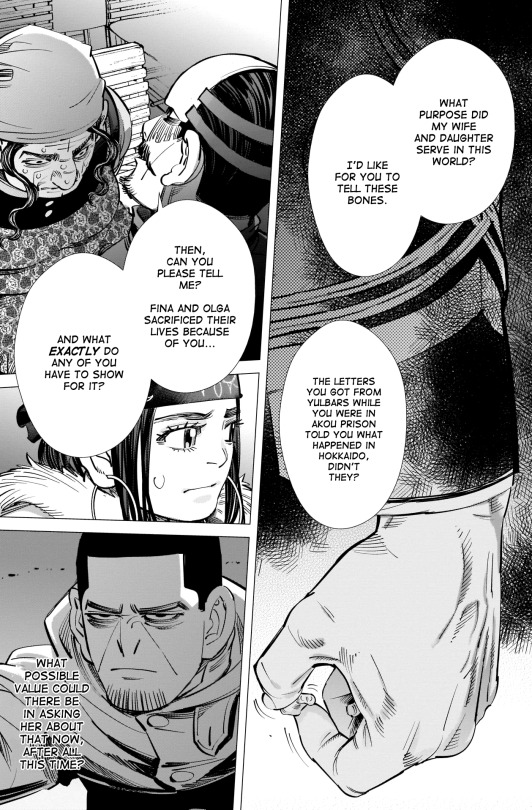
Well, the good thing in all this is that, if Tsurumi is asking her about the incident, this seems to hint that, as I speculated, he doesn’t know exactly what happened (unless he’s sure Kiro had false info which he relied her... but I doubt that’s the case).
In his anger, Tsukishima fails to understand that asking Sofia about what happened in the Nopperabou incident might:
- give Tsurumi clues about where the gold was (the incident took place when the Ainu moved the gold)
- tell him if there’s more people involved who could try to get into Tsurumi’s way
- make Asirpa feel guilty for the dead Ainu and more prone to help Tsurumi,
All this of course depending on what truly happened back then... but I think Tsurumi has some theories in this regard and he’s asking merely because he thinks Sofia’s words, which Asirpa won’t question because Sofia wouldn’t have any reason to lie, would be beneficial to him.
Sofia starts crying at all this, breaking down and admitting what we already knows, that Kiro believed ‘Wilk changed’.
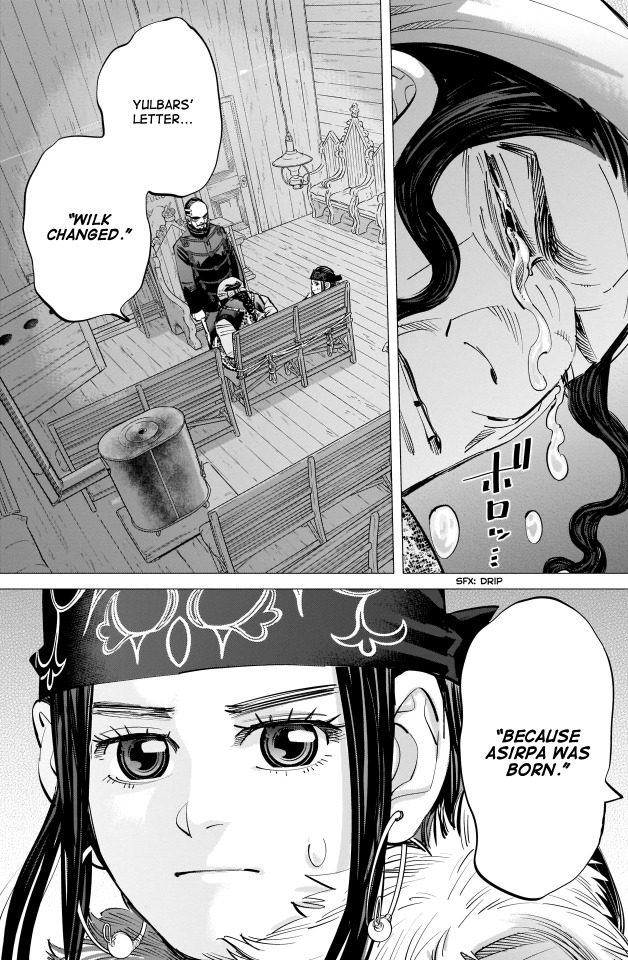
The only new addition to all this is that it confirms Kiro believed Wilk changed because Asirpa was born... but this doesn’t really tell us if Wilk changed the day Asirpa was born or later, as the change could have been gradual and we saw that Kiro seemed to have a good relationship with Wilk after Asirpa’s birth
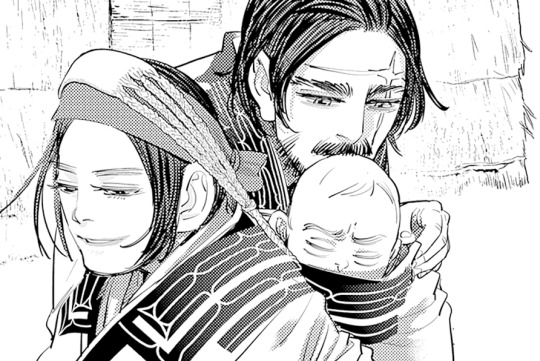
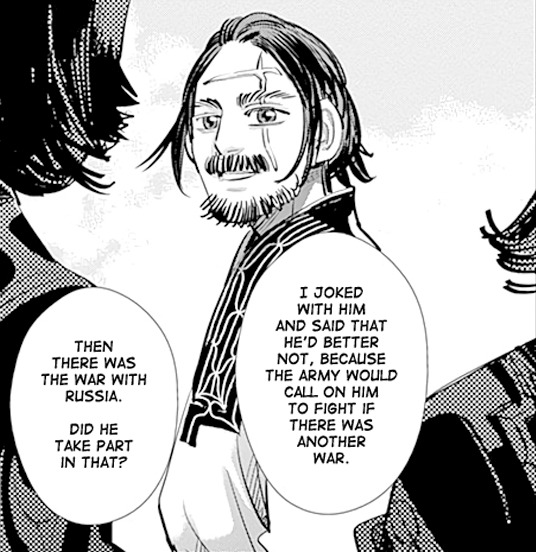
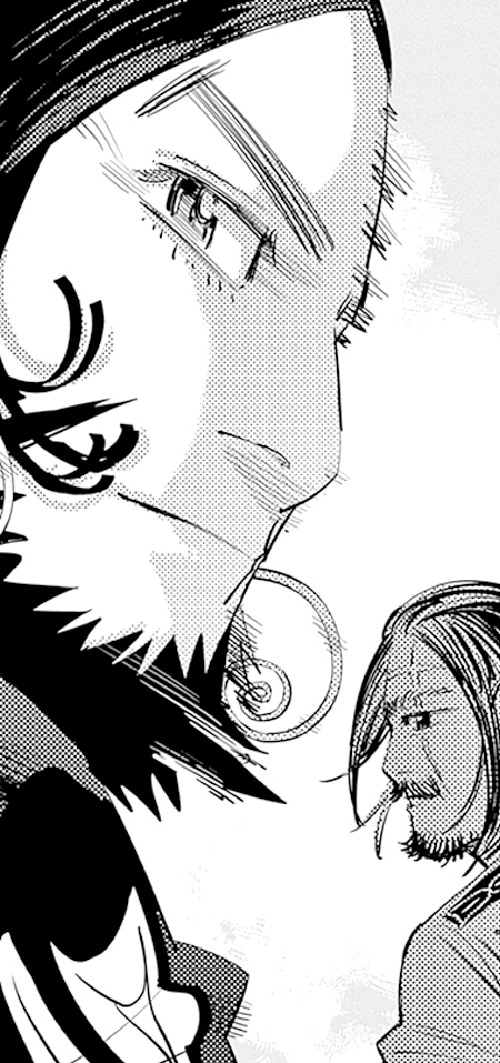
(and we know, for Wilk’s own admission, he wanted to raise Asirpa to be a guerrilla fighter capable of leading the Ainu...
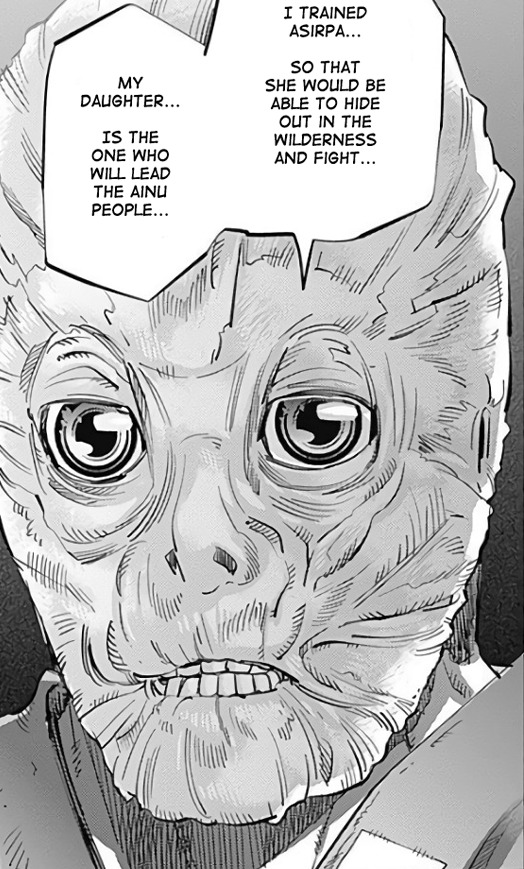
...and taught her how misplaced sympathy could become a weakness and who’s weak gets eaten, how they can’t hesitate to kill (a bear cub) for fear of being cruel or they’ll die (of starvation)).
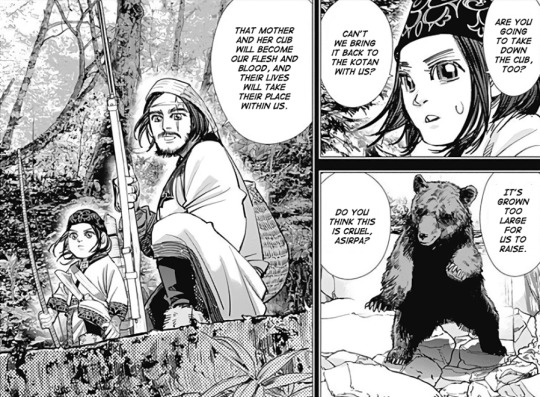
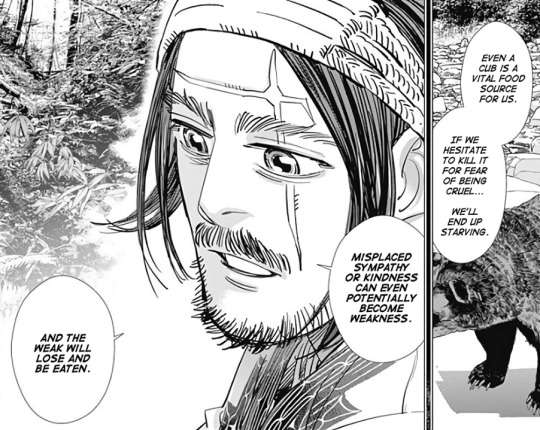
Kiro also said Wilk saw a light in Asirpa, a light of hope for the Ainu,
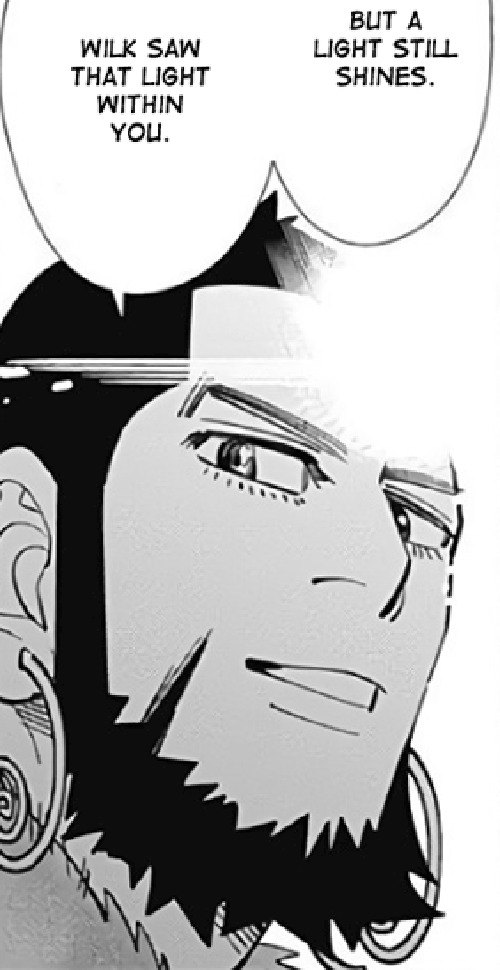
...which also fits with how Kiro himself entrusted the future to Asirpa and Sofia,
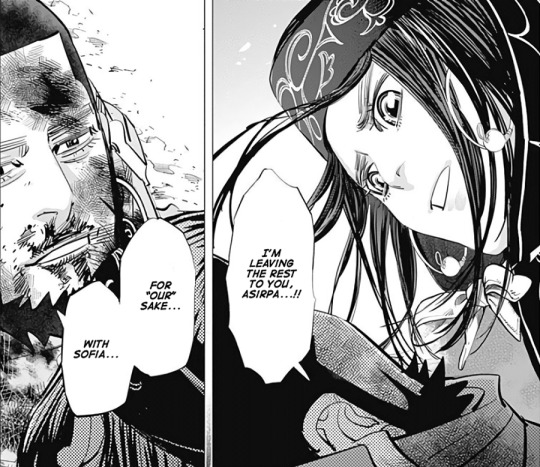
...and how Asirpa’s name means ‘future’.
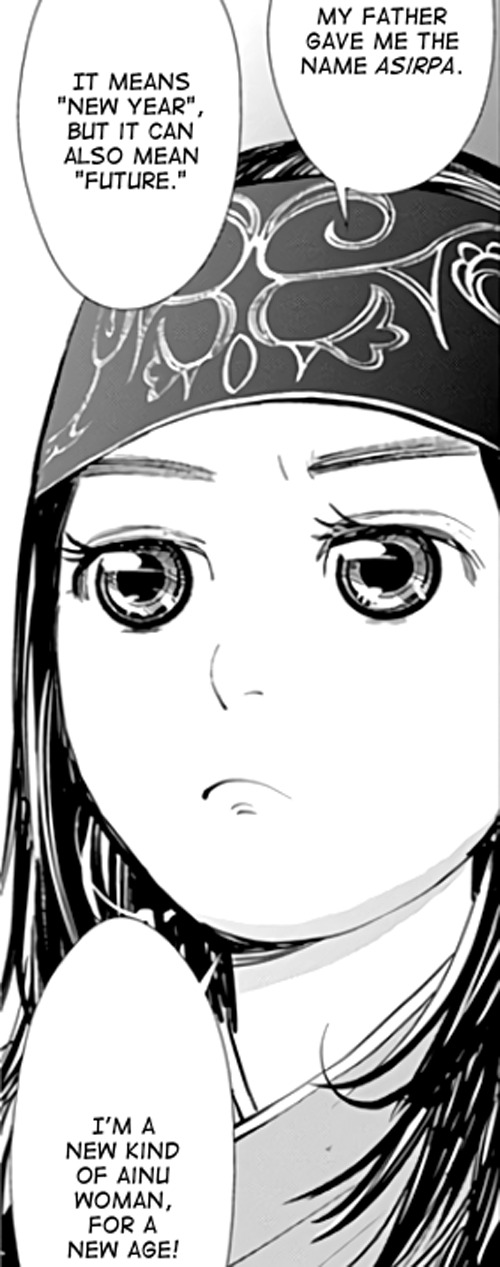
Long story short, we still don’t know anything new as it was clear Asirpa ended up affecting Wilk but how and why Kiro believed this constituted betrayal worth killing him is completely up to speculation.
I stand my ground on the fact I believe if Kiro thought Wilk had to die, it was because he believed Wilk betrayed the partisan cause, which, among partisans, has always been a crime punishable with death.
Still I genuinely doubt Asirpa’s birth caused Wilk to turn into a pro-imperialist or that it caused him to stop caring about the minorities... and since Kiro didn’t try to kill him prior to the Nopperabou incident, I’ll say the problem didn’t exactly start with Asirpa’s birth.
On the other side I don’t think Kiro is lying, he genuinely believed Wilk changed.
We’re clearly missing how Wilk changing became something that caused or was connected to the Nopperabou incident and made him worthy of being killed later, without even being questioned.
Ogata hinted that Kiro might have been afraid Wilk would reveal something about Kiro to Sugimoto...
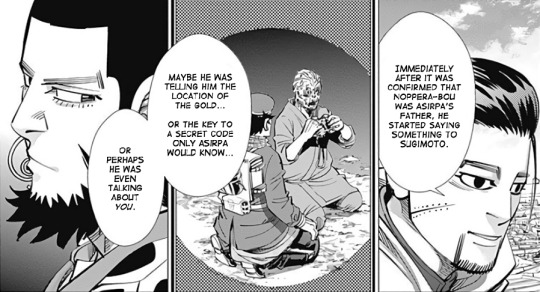
...but I somehow have troubles seeing Kiro killing all those Ainu since Kiro seemed reluctant to kill Inkarmat, who was clearly a big hindrance and didn’t want Sugimoto, who was a potential hindrance, to be shoot.
Besides Kiro clearly didn’t know where the gold was, so I’ve troubles thinking he would just murder all those Ainu without even trying to get info from them.
Could it really be possible Wilk make a 180° turn and wanted to hand the gold to the Japanese even if, apparently, when he was arrested, he was trying to escape in Karafuto with the gold so that he could bring it to his companions?
Or did he wanted to hand it to the Japanese authorities because he came to believe the Ainu, the partisans and the revolutionaries wouldn’t know how to use it to benefit their cause and would only make matter worse?
Difficult to believe so as, even if we’re to assume he decided that fighting was wrong, the gold could be used in small parts to improve Ainu’s life by buying necessities for them if times were to become harsh (just think at how the locust attack damaged Kirawus’ village food resources... if they had some gold they could have bought the missing food).
Or was Wilk trying to use it to BUY the Ainu’s freedom from the Japanese, not with weapons but with the gold itself, buying the whole Hokkaido island in Boutarou’s style, therefore betraying the Russian cause as they would remain to their own devices? It would seem an aiful naive plan from him besides it was hinted he still wanted to pursue his own dream of a far east federation for minorities by how he clung to those gold coins up till the time he was captured.
But still, we’re missing some big piece of the puzzle... which we don’t get in this chapter as the story kind of goes back a little to show us Sugimoto and Shiraishi in the bottlecar, just out of the church Sugimoto is in.
They had seen Koito get into the church, meaning they got there before Tsurumi started speaking with Sofia and Asirpa.
Shiraishi would like to rush in to rescue but Sugimoto is uncharacteristically prudent, saying Shiraishi they should go call Hijikata, because if they rush in they could be in numerical disadvantage.
Shiraishi though is worried of what Tsurumi could do to Asirpa but Sugimoto insists Tsurumi should know he can’t rely on information gotten with torture so, differently from Tsukishima, he figured out Tsurumi will try to get information from her of her own free will slowly.
Shiraishi is still worried and references how Tsurumi behaved oddly in the volume version of what happened in Karafuto (because in the magazine version the poor guy actually acted in a pretty normal way) then notices Sugimoto is actually wishing badly he could rush in and decides Sugimoto might be right.
Honestly I should give kudos to Sugimoto for managing to figure this out. From after Tsurumi got his hands on Asirpa he had been uncharacteristically smart, analyzing his opponent (Tsurumi) and understanding his moves, from how Tsurumi wouldn’t part with Asirpa to how he wouldn’t torture her but try to get info out of her willingly.
On a sidenote actually you can get reliable info through torture if you manage to keep control of your victim (meaning if he lied to you torture will just start all over) or if you’ve someone to use to blackmail that person but whatever, let’s go on.
Sugimoto and Shiraishi decide them to go call Hijikata, slam the car against a pole and fly out of it.
The chapter ends here but if Nikaidou is really around there to keep guard as Tsurumi told him to do...
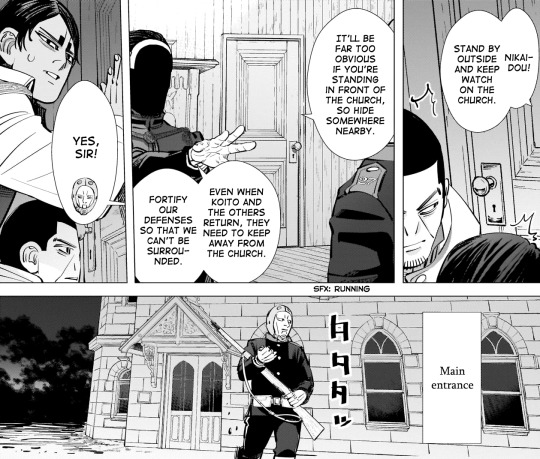
...and spot Sugimoto we can count on him to go in berserk mode, scream ‘SUGIMOTO SAICHI! MY NAME IS NIKAIDOU KOUHEI. YOU KILLED MY BROTHER! PREPARE TO DIE!’ and reveal to everyone how Sugimoto and Shiraishi are there, possibly interrupting the whole interrogatory and letting us wonder for many more chapters WHAT IN THE WORLD HAPPENED DURING THE NOPPERABOU INCIDENT. So please Nikaidou, don’t be around or scream discreetly. We don’t really want you to bother Tsurumi, Sofia and Asirpa NOW.
#Golden Kamuy#Tsurumi Tokushirou#Asirpa#Sofia#Tsukishima Hajime#Koito Otonoshin#Hasegawa Olga#Hasegawa Fina#Kiroranke#Wilk#Sugimoto Saichi#Shiraishi Yoshitake#Hijikata Toshizou#Golden Kamuy Ramblings and Theories
40 notes
·
View notes
Text
Truth Seekers spoilers
okay so I have a lot of thoughts surrounding the characters Dave and Jojo and I’m gonna talk about them under the cut so don’t look any further if you haven’t watched the show yet and don’t want to be spoiled!!
so... what exactly ARE Dave and Jojo?
I think we have three main options: gods (more specifically God and Satan), angels and/or demons, or aliens, and there’s a decent bit of evidence for each thing/stuff that could be interpreted to link to each thing, and I’m gonna delve into that in this post. So buckle up lads this is gonna be a long one.
First I’m gonna go over the possibility that they’re aliens since that is the one I personally think is least likely since most, if not all, of the evidence that suggests that they’re aliens is linked to Dave and not Jojo. Anyway, Alien Evidence: - Dave pulls out the Pioneer Plaques to show Jojo what he based his human appearance on. So they could be aliens that came across the Pioneer spacecraft and decided to investigate Earth further - Dave himself is a huge Carl Sagan reference, as listed by this tumblr post here, so his appearance could have been a result of him being inspired by one particular human he happened to like a lot (similar to how he appears to like Gus and Astrid a lot) - the slogan on the side of Gus’ van says “connecting worlds”, and we can safely assume that that is Smyle’s slogan, the slogan of the company that Dave is in charge of. So this could be a similar situation to The Network in The World’s End in the sense that Dave could be an alien aiming to connect different intelligent civilisations throughout space. Although it definitely seems like Dave isn’t seeking to aggressively convert and control these civilisations that he connects like The Network... right? I’m fairly confident that he’s supposed to be a Good(TM) character and not some surprise twist villain but y’know we’ll never know
So yeah while there is definitely some stuff to suggest that this mysterious pair are aliens, I personally don’t think they are since I’ve found more evidence suggesting that they are something else. They appear to be too in tune with Earth, the creatures inhabiting it, and “the other side” that souls pass on to after animals and humans die just to be aliens from another world that are observing the planet. Plus the use of the phrase “Super Being” for some reason doesn’t feel alien to me, because unless they’re very self entitled aliens (and Dave definitely doesn’t give off that vibe) then I don’t think they would consider themselves as above humanity, which is the energy that the phrase “Super Being” gives off. I heard that phrase and interpreted it as meaning ‘beings that are above humanity and above human comprehension’. Aliens for the most part are depicted as being just another race of beings, not above humanity despite how much further advanced they are. There is the possibility of Dave being the only alien of the two but then how did these two creatures meet? It just doesn’t feel right since they both appear to be on the same level as each other and have some kind of mutual understanding as if they were both the same thing, not two different creatures.
Anyway next I’m going to move onto the things suggesting that they’re angels and/or demons. This seems more plausible to me than aliens but I’m still not 100% sure on this one but I will say that there is a lot of evidence/interpretations that could suggest both this possibility and the possibility of them being gods. Angel/Demon Evidence: - the name ‘Jojo’ could be a link to the angel Jophiel - there is a mention of a ‘bigger picture’ so we could have a Good Omens-type situation where there is a plan in motion that both Dave and Jojo are a part of and are making sure that it is played out - the “what did you come as?” “same as always, a man” bit obviously suggests that their actual forms are definitely not human and probably not even humanoid (whereas an alien would be at least humanoid in some capacity). Bibically accurate angels do not look human/humanoid in the slightest, and demons, while a bit more humanoid than angels, are still very animalistic in appearance. Also, imagine an innocent angel that has never pried to look at what a human ACTUALLY looks/acts like suddenly panics about having to look and act like a human and pulls up that one thing the humans sent out to the aliens as a reference and goes entirely on that (listen I really like Dave he seems like such a Good Boy who isn’t the brightest but he’s trying his best) - Dave’s aversion to swearing, links to the theme of purity which is obviously an angel thing. Plus ‘Good’ characters will often have a trait of being against swearing to reinforce the idea that they are Good and Pure - Gus makes a comment about Dave “never not being [at Smyle HQ]” so he’s clearly there all the time, which could suggest a lack of needing to go home and do basic human functions such as eat and sleep etc (I do want to bring up that an alien still would probably need to continue with some kind of basic functions that have similar purposes). Plus while he does have a coffee cup on his desk, it’s only filled with pens - in a similar vein, Jojo appears to spend all of her time in the abandoned Happy Eater, and even though it’s an abandoned restaurant, it’s been abandoned for over 20 years and therefore won’t have any edible food still in it (except for the crisps but let’s be real Elton why did you try and get those out they’re probably horribly out of date). The still steaming cup of tea/coffee and the crisps in the vending machine I feel like were put there by Jojo to play to the gang’s curiosity and prompt them to explore further and find her
there are a few things here that could also be used to suggest that they are gods/God and Satan, plus there’s a few more bits that would also go in this section but I’m saving them for the next bit. Anyway there’s the stuff pointing to them being either both angels or Dave being an angel and Jojo being a demon, and there’s plenty more evidence compared to the amount of things that suggest that they’re aliens.
Finally we have the things linked to the idea of them being gods of some kind, or more specifically God and Satan. This is the idea that I am the most sure of. Gods/God and Satan Evidence: - as I mentioned already, the idea of the ‘bigger picture’, but instead they are the ones in charge of carrying this out. This feels more likely especially when considering the way that Jojo talks about her ‘use’ of Toynbe. Plus the way that the two go about doing everything, the ambiguous vibe that the two are either having the equivalent of a friendly card game against each other or are actually on opposite sides. Consider the placement of the rose in the field and the planting of the cameras etc - also as mentioned earlier, the implication that Dave never leaves Smyle HQ and Jojo stays in the abandoned restaurant. Also I want to add on the fact that neither of them appear to have cars, like Dave outright says “I don’t have a car” and yet knows how to drive the one he borrows, and there’s no sign of a car at Jojo’s hideout. Plus the way she doesn’t make any kind of journey and just appears in Dave’s office: he doesn’t look up to see who’s walking through the door and there is no shot of Jojo walking through the door, he simply smiles as if he senses her presence appearing in the room before looking at her - Dave wears blue, white, and grey clothing, which are also the same colours used in his office, and the lighting whenever he’s in shot is always either bright and white or a light blue, especially in that last scene where Jojo and Dave are chatting in his office; every time the camera is on him, the lighting of the shot is always blue. White especially is associated with holiness and purity, as well as being a colour that is associated with God, angels, and heaven. Blue is similar in the sense that heaven is always depicted with white clouds and bright blue skies, as well as blue often being a colour used to represent ‘Good’ characters - speaking of colours, Jojo is also linked to certain colours, with those colours being red and black (but primarily red). The abandoned restaurant is dark and barely lit, and her hideout in the basement is primarily lit with red lighting, both in the scene where she encounters the Truth Seekers gang and at the end where she rings Gus and orders that guy to send a cleanup crew. Also, once again in that last scene, she not only is wearing a black item of clothing, the lighting of her shots are always red to oppose Dave’s blue lighting. Red obviously is synonymous with hell, evil, the Devil/Satan, sin etc. Red is also often used to represent villains and evil characters, and black is similar with its themes of darkness and it’s use for villains. I like to think that Jojo got that blue rose for Dave partially to mock him, especially when considering that apparently blue roses are often used to symbolize mystery or attaining the impossible. (Also I want to point out that we already know that these boys do love their colour coding/theming as evidenced by the Cornetto Trilogy) - once again I’ll bring up the phrase “Super Being”, which really does sound like a phrase that a god who is very much above humanity would use, like that just screams ‘gods’ to me - I used this as alien evidence but Dave looking like Carl Sagan could also be applied to him being a god and just deciding to base his appearance on a human he liked a lot - same with the “connecting worlds” slogan, since I think that part of Dave and Jojo’s game/contest involves experimenting with and/or influencing the boundaries between the ghost realm and the living realm, this slogan could have something to do with that - the way that Jojo says she “shouldn’t have used [Toynbe]”, which reminds me of the story in the Bible where the Devil tempts Jesus, except Toynbe succumbed to the temptation and “focused too much on the immortality” - speaking of that line in particular, it also makes me think that Dave and Jojo are the ones ‘in charge’ of whatever game or contest or battle that the two are having, as I mentioned already. But that line, as well as other things, also gives the impression that they are alone in this, like Dave isn’t just one of many angels or a god with loads of angel lackeys to do things for him, and the same goes for Jojo. They do appear to have human ‘lackeys’ to do more basic tasks such as Jojo requesting the cleanup crew and Dave having a company with human employees, but overall the humans are unaware of what is really happening. Whatever thing that these two have with each other, whether they’re friends having a casual game or are on opposing sides and having a serious battle of some kind but are remaining friendly with each other because there isn’t anyone else like them, it definitely feels like these two are pitting against each other alone, with nobody else who really knows what is happening
Overall, I think the two are some kind of higher entities that are above humanity yet they are still very strongly linked to and woven into the fabric of the Earth and the human race, so like they’re not outsiders to the mechanisms/forces of the planet. They seem more knowledgeable on the ghost realm/afterlife than humanity is, but whether they can actually control/influence it is still a bit of a mystery, like part of their game/contest could be one big experiment with the living realm and the ghost realm. Who knows? Not us, since season 2 isn’t going to be a thing, so I’m just gonna theorise until I die /j
So there ya go, all of my current evidence and thoughts on what the hell is going on with Dave and Jojo. I will probably update this post if I come up with/find any more things to add, probably by reblogging it. Also of course do feel free to reblog and add your own theories!
#my brain apparently remembered that it did English A Level while writing this all out#but yeah these two characters have captivated me#literally have been thinking about them 24/7 for the past few days#especially Dave I really like him#NO not just because he's played by Simon Pegg#truth seekers#truth seekers show#amazon prime#jojo74#truth seekers dave#truth seekers jojo#simon pegg#nick frost#beef speaks
17 notes
·
View notes
Photo
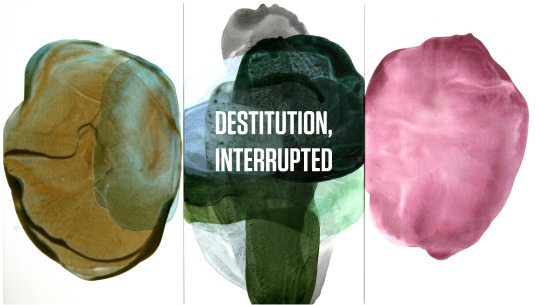
QUARANTINE LETTER #1
This is the first in what we hope will be an ongoing epistolary exchange between comrades living through conditions of quarantine. Responses and other reflections on the present moment can be sent to: [email protected]
***
Destitution, interrupted
1. The theorists have agreed: the current interruption is the outcome of well-established logics of capital, crisis governance, and alienation. Giorgio Agamben writes, “humans have become so accustomed to living under conditions of perennial crisis and emergency that they do not seem to realize that their life has been reduced to a purely biological condition stripped not only of all social and political dimensions, but likewise of its human and affective dimensions.” An article in Lundimatin on March 19 insisted that “the economy is the devastation”, but whereas this was “a theory before last month…now it is a fact.” Another article from the same issue reminded us that “the catastrophe is always already here”—from the floods and fires of California, to the atmospheric asphyxiation of non-human life, to the warming oceans and melting icecaps—and, if there is a difference today, it is only that “we are now obliged to open our eyes.” Finally, as if to carry this logic to its outer limits, a recent letter from Jacques Camatte proposed that “what we are now witnessing is the outcome of [a] vast phenomenon that has developed over thousands of years, stretched between the two great moments during which the threat of extinction asserted itself.” [1] The Coronavirus, it would seem, is nothing other than the protracted outcome of civilization itself.
While it is certainly right to insist that conditions of the present are an extension of the conditions of the past, this chorus of continuity misses something essential. Our world is certainly decomposing, but the song is not exactly the same.
Two years ago, a friend stated that, “the constitutive heterogeneity of the real is given to us under the mask of unity, homogeneous unity. To superficial perception, the mask is the real itself. To allow the mask to falter, is therefore to risk vertigo.” [2] In January, this mask still resembled the form it had assumed in recent years: a tumultuous but for the most part intelligible field of global political polarizations. The world, and our place within it, still felt within reach.
By March, the ruling institutions had been forced into a roundly reactive posture. It is by no means clear that the Coronavirus can be compared to a typical economic crisis or natural disaster, nor has the response been limited to an ordinary state of exception. After all, at least for a moment, rulers and ruled alike were pushed on to the back foot, their certainties shaken, as the virus usurped the position of global antagonist. Institutions on which the reproduction of this world depends have been perfunctorily suspended: employment, imprisonment for misdemeanors, evictions; even the DOW Jones seems up for grabs.
The dislocation of the social fabric has been far deeper than anything we have known. The veneer of normalcy fell away at a shocking speed. Actions that were once the very substance of normalcy now feel like experiments. And if we are honest, the ethical and political lines are not exactly what they used to be.
2. Three months ago, what concerned us and much of the world was the tally of forty-seven countries: the newspapers announced “a new global wave of revolt.” From France to Hong Kong, riots, occupations and blockades erupted with a ferocity and longevity unknown in living memory.
Successful revolts do not only undermine existing powers— they also allow their participants a capacity to participate more fully in the world. If we have come to think of revolt as a destituent force, this is not only because revolt splinters and fragments the social fabric into asymmetrical camps, but also because it returns us to earth, placing us in contact with reality. Destitution is rightly thought of either as a double movement or as a single process with two sides. On the one hand, it refers to the emptying-out of the fictions of government (its claim to universality, impartiality, legality, consensus); on the other hand, a restoration of the positivity and fullness of experience. The two processes are linked like the alternating sides of a Möbius strip: wherever those usually consigned to existing as spectators upon the world (the excluded, the powerless) instead suddenly become party to their situation, active participants in an ethical polarization, the ruling class is invariably drawn into the polarization and cannot avoid exhibiting its partisan character. The police become one more gang among gangs.
Needless to say, our situation today is different. We are living through a halfway destitution, a destitution interrupted. Every party has returned to earth-- yet without entering a world. The advent of COVID-19 has drained standard narratives and roles of their force. The logics holding this world together have been revealed as the arbitrary and mechanical operations that they are. Yet because it was neither “we” nor “they” who pulled the e-brake, but a perfectly inhuman virus, the standstill of historical time lacks the festival that usually accompanies it— the collective intelligence and confidence that comes with being the agent plunging normal time into disorder. In the absence of an agent, the truth of this moment remains stubbornly negative: our lives materially prostrate to supply chains as far flung as they are brittle, our world a conduit of reciprocally perilous immunity and disease.
3. Under ‘normal’ circumstances, participants in political events are never solely agents, but always also patients at the same time—we affect and are affected, we are changed by what we do and what is done to us, whether by police or one another. To have an active hand in our own deposition, to become anyone by participating in a common power with no name, is the mark of those movements and moments of eruption we’ve felt close to over recent years.
By contrast, our one-sided passivity in the face of this global event generates a vertiginous sense of being outpaced by the change around us. To be patients but not agents has meant that the dislocation of social life has occurred at a speed that makes it all but impossible to metabolize.
In their 1956 text, “A User’s Guide to Détournement,” Debord and Wolman observe that the subversive power of a détournement is “directly related to the conscious or semiconscious recollection of the original contexts of the elements.” This dependency of subversion on the memory of the subverted is not limited to the case of art but is, they argue, merely “a particular case of a general law” applicable to all action upon the world.
If the radical interruption of normal life we are undergoing has been so disorienting, this is because it is unfolding like a botched détournement, one whose force or potential is neutralized by its very radicality. We are swept into the new with such disarming speed that we cannot recall what preceded it. The tissue of normal life has been punctured, yet the cancellation was so rapid that we have been unable to register the distance traveled between the “original contents” of normal life and the world we now inhabit: a violence too sudden, too terrible even to be liberating, numbs us to the subversive effects it nevertheless carries out. The upending of the world becomes a strangely pacified process, reduced to a disorienting and disempowering experience: an inhuman velocity, less an event than a jump-cut, an excision of memory, a vertical severing of time itself.
In the long run, the vertigo will settle into more acute polarization. When it does, our inability to recalibrate will play to the benefit of the ruling powers. It insulates them against the subversive shock of what the virus has compelled them to do—less by the so-called “Corona socialism” than by the radical demobilization of the labor force that has accompanied it. Meanwhile, we float in an empty time; unable to seize upon and decide it, we wait for the suspension of history to reach its conclusion.
However, as Furio Jesi understood well, suspended time often requires a “cruel sacrifice” before it can conclude itself. [3] If our only experience of this event is as a “blip” of confusion and panic amidst an unbroken chain of administered life, when the time finally comes for an imperial reboot, the reversion to normalcy (or worse) will find no argument or exteriority to oppose it. That we remain dazed and out of step with the world gives our enemies free reign to reintroduce historical time on terms amenable uniquely to them, as the recent murders of activists during the quarantine lockdown in Columbia have already begun to attest. [4]
For now— at least for a moment—we are all here on earth, in the desert solitude of collective uncertainty:
To have been on earth just once —that’s irrevocable. / And so we keep on going and try to realize it, try to hold it in our simple hands, in our overcrowded eyes, and in our speechless heart. (Rilke)
However paradoxical, perhaps our task over the coming weeks is to slow down the pace of change, to impose a rhythm allowing us to participate once again in the subversion and reinvention of the world on our own terms.
-August and Kora
Chicago, March 24, 2020
*******************
[1] Giorgio Agamben, “Clarification,” published on the column Una voce, on Quodlibet.it website; (Anonymous), “Coronavirus: Apocalypse and Redemption,” Lundimatin #234, March 19, 2020; Anonymous), “What the Virus Said,” Lundimatin #234, March 19, 2020; Jacques Camatte, “Letter from Camatte to a Friend in the North,” 3.20.2020. English translations available here: ill-will-editions.tumblr.com
[2] Moses Debruska, “Preface,” in Josep Raffanel i Ora, Fragmenter le monde (Paris: Divergences, 2018), 19. Our translation.
[3] “Every true change in the experience of time is a ritual that demands…a determinate cruel sacrifice.” Furio Jesi, Spartakus. The Symbology of Revolt, Trans. Alberto Toscano (Seagull, 2014), 61-63.
[4] “Colombian death squads exploiting coronavirus lockdown to kill activists,” The Guardian, 3.23.2020. https://www.theguardian.com/world/2020/mar/23/colombian-groups-exploiting-coronavirus-lockdown-to-kill-activists
86 notes
·
View notes
Photo
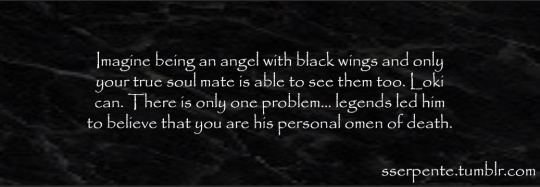
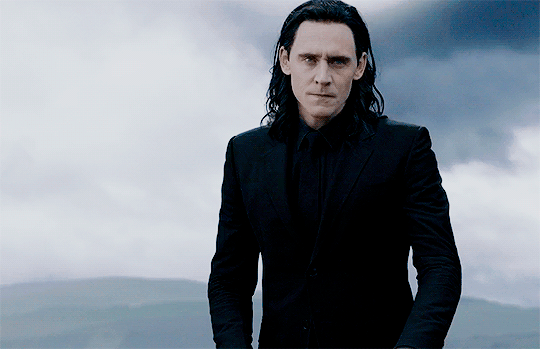
A/N: Request from anon. I loved the concept… and then I couldn’t stop writing and it went so well with some other ideas I had and it escalated and ahhh, you guys were supposed to get this Imagine three days ago. Anyway… enjoy reading! ♥ Words: 4628 (oops) Warnings: gore/blood, fluff (the combination doesn’t sound right, now does it)
Here’s an extra warning: I got a bit inspired by “Coriolanus” so there will be a very bloody and graphic scene… stuff I usually don’t write myself. As I said though, I really got inspired by the play so I just went along with it, if anything to not repeat myself with this one scene we all hate so much. It thus also might rip open the wounds Infinity War caused. Therefore, the scene will be marked with “*” at the beginning and the end in case you prefer to skip it.
-
“It’s a myth.”
“It’s not a myth. They are omens of death.” Thor argued. Grinning smugly, he leaned back and took a sip of his beer.
Tony buried his face in his hands. “You know I started believing in many things when you fell out of the sky to help us fight aliens but… there’s a line. ‘Black angels’? With shimmering wings? Please, Point Break.”
“Well, you wouldn’t know. They say only those before their imminent death can see their wings.”
“Have you ever seen an angel then?”
“No! I told you, they are omens of death. Volstagg’s father… he saw one. He swore he did. One week after, he perished.”
“Coincidence.”
Loki rolled his eyes. He had known before that mortals were ignorant and refused to face reality, Stark’s stubbornness however surprised even him. Many creatures shared their stories in the Old Norse myths, stories which his mother had told him before bed when he was a child.
Angels… omens of death. Black, shimmering wings… they said whoever saw one before death, their soul would leave their body contently… that they were of such beauty it would not compare to any other being in the nine realms. As a young boy, Loki had told Frigga he wanted to see one for himself—and Frigga chided him for wishing for such an atrocious thing.
-
Shivering, you wrapped your black coat around yourself tighter. You had bought it from a street market for little money which you had stolen from a peasant. High up in the sky, you were never cold. You were free. Those human sensations were downright irksome.
Perhaps it was your own fault you had ended up on Midgard of all places. Stranded and stripped off most of your powers, they had cast you out and forced you to live a mortal life—knowing you would never find friends on a planet inhabited by beings that would not grow half as old as you.
Perhaps you should have joined your people when they swore their allegiance to the purple titan. But you knew you would have made the wrong decision. What Thanos wanted was impossible—and you sincerely hoped he would fail. His lackeys were already spreading dread, fear and death across the planet. You had seen them lurking about, watching his evil plans unfold and wreak havoc when it was fun.
A high-pitched scream ripped you from your thoughts. Turning straight on your heel to see what had caused it, your instincts kicked in. Altruistically saving humans wasn’t high on your priority list, kicking Thanos’ monkeys’ arse, however, was. It felt good to ram your poisoned dagger into their hearts… and it least gave you some satisfaction.
You frowned when you reached the dimly lit alley, scanning the area to analyse the situation. Somebody had beaten you to it. Clenching your fists, you recognised both Tony Stark and Captain America along with a raven-haired man with a sharp jawline and the most stunning blue eyes you had ever seen—Loki, God of Mischief.
Thanos’ lackeys were nowhere in sight. Instead, what part of the Avengers… and Loki put up with was a dirty burglar who seemed to have tried to rob a young woman who was currently shaking on the cold ground like autumn leaves in the wind.
“Are you alright, Miss?” You heard Steve Rogers ask her humbly, all the while the burglar—terrified for his life—scrambled to his feet, abandoning the knife he had held. Loki rolled his eyes. With but one effortless movement, he kicked him in the stomach the moment he attempted to run and proceeded to grab his collar to lift him off the ground.
“Please, please… please don’t kill me!” The burglar whimpered. You suppressed a chuckle.
“Let him go, Reindeer Games.”
“Let him go? What did we intervene for? Mercy? I disagree…”
“Nope. FRIDAY has already saved his fingerprints and appearance. The police will get him soon enough. Now let him go. I think he peed his pants.”
Loki’s face distorted when he spotted the wet spot between the burglar’s legs. Disgusted, he did as he was told and threw him back to the ground. He swallowed thickly before hurrying away clumsily. Then, he looked up—and his blue eyes locked with yours.
Paralysed, he captured you in his both scrutinising and fascinated gaze. Your lips parted when you realised that he could see your wings. Dark, shimmering and as soft as a crow’s feather dress they framed your form—petite compared to his—and complimented both your (Y/H/C) hair and (Y/E/C) eyes. You were beautiful.
Neither of you paid attention to the young woman who had stood again by now, approaching Loki timidly. Her ‘thank you’ went unnoticed even when Steve called his name.
“Who are you?” You blinked, reluctantly tearing your eyes away from Loki’s to face Tony Stark.
“(Y/N)… my name is (Y/N). I am what other beings would refer to as… a black angel.”
Tony snorted. “You’ve got to be kidding me.”
-
One heated discussion after your confession led to another and Captain America and Iron Man—for Loki had remained completely silent—decided to take you back to the compound to speak to Thor. You did not take kindly in spilling your secret to strangers. Hundreds of years ago, humans, Asgardians and other species had hunted you down for amusement, using poison to make your wings visible and cutting them off to sell them on the black market—an ironic name, really.
But this… was different. Loki—the Loki, God of Mischief and Lies, Trickster… son of Laufey and Farbauti and Prince of Asgard—he could see your wings. Legends had been told about connections alike. They said that every living black angel in this universe served a purpose, was meant to follow a path and fulfil its destiny—and to be with one person who loved them dearly for the rest of their existence. Only those that fate chose to be a black angel’s partner would be able to see their wings—to see all of them—in their full glory and true beauty. Loki’s blue eyes were practically glued on you; and if you were not mistaken, there was a hint of panic glistening in his irises too.
Did he feel the connection, perhaps? That you seemed to have found the man your heart would likely belong to for the rest of your life? Strangely enough, you felt… oddly exposed. Only other black angels had ever been able to see your gift, unwillingly sharing it with someone you had but heard of and never met made you vulnerable… and it made you self-conscious.
“How exactly did you end up here on Earth?” Thor leaned forward, crossing his arms on the vast glass table in the middle of the conference room. Around him, the remaining Avengers which you had not officially met yet, squinted suspiciously in a desperate attempt to spot your wings as well. One of them—you believed he was called Rhodey—had even examined your back but found nothing.
“I was… banished. My own people abandoned me because I refused to join the new force.”
“Does that force answer to the name of Thanos by any chance?” Tony tossed in. You nodded.
“You have heard of him. He means to wipe out half of the universe. We have to stop him whatever it takes.”
You could feel Loki’s presence behind you. He was still silent, pacing up and down the room like a cunning predator waiting to strike.
“How do we know we can trust you?”
“You don’t. I am merely warning you. I don’t have the powers to stop him but you might. And I certainly did not ask to be invited to your humble home.” You snapped. They were hostile towards you, you could tell. Something about you unsettled them. If only you knew what it was.
-
Be that as it may, the Avengers decided to let you stay for a while. They hadn’t locked you in a room but if you were to try and leave without anyone accompanying you… then the Norns beware.
You sighed. You should have never mentioned you were a black angel, pretended to be human instead… pretended that Loki was hallucinating. His eyes had made you forget all reason. The invisible force pulling you to him was destructive. You wanted to be close to him, be with him, be there for him… lay your life, soul and heart in his hands… all the while he seemed to painstakingly ignore you.
You barely knew but you could sense that Loki was everything you could ever wish for. An intelligent, powerful, cunning and charming man, tall, blue-eyed and so outrageously handsome he even outshone his brother Thor. You had never spoken to him personally and yet, you felt like you would die for him. Now what if he never reciprocated those feelings? Tragic stories were told about black angels who found love and yet had to live without it.
At the very least, so you figured, you had access to a fully furnished kitchen tonight. It was your first warm supper in two weeks and bit more nourishing than a mere apple or a handful of nuts. It was almost midnight now and hunger had gotten the better of you… or maybe it was the prosperity of food being available to you at any time without you having to steal hard-earned money for it first.
Passing through the hallway, your tread entirely mute, you stopped dead in your tracks when you heard two familiar voices talking in the living room.
“Big… imposing… no, I did not imagine it, Thor. They were there. A pair of shimmering black wings…” Loki sounded worried, yet you could tell he was trying hard not to let it show. He had already seemed to have panicked a little when he first laid his eyes upon you.
“So what do we do?”
“I don’t know.”
“How much time do you have left?”
“I don’t know, Thor.”
“Don’t you… worry, brother… I’m sure everything’s gonna work out fine.”
There was a moment of awfully painful silence. Then, somebody left.
Frowning, you knocked. You were unsure of what they had been talking about. Loki’s expression darkened when he spotted you entering the room shyly, his eyes focused on the wings on your back.
“You… seem to be avoiding me, Loki. Have I… done something?”
Loki smirked—it was bitter. Now that he had told Thor, by tomorrow… they would all know he was going to die soon.
“You have not, dear. It is not something you did. It is your purpose.” Your heart skipped a beat. You had not expected such an honest answer.
“My purpose? I don’t have a purpose here on Midgard.” His eyes were ice cold when he looked up to meet your gaze.
“You are an omen of death.”
Your lips parted. “I am… I am not.”
“No man who sees a black angel’s wings survives. I can see yours.”
“B-but… but that… you’re not going to die.”
His bitter smile returned. “We are facing Thanos. If I was doubtful about my fate before, I am no longer now.”
“Loki, that’s not what it means…” It felt like your heart was shattering, to a million tiny little pieces. He thought you were his death… no wonder he felt uneasy around you. Where had that stupid superstition come from? Why would you be an omen of death?
You longed to tell him what it really meant. Only right now, in this very moment, it did not feel right. Would he even believe you? Probably not.
“Good night, Loki.”
When you returned to your room, you sent your pillow flying through the air all the while suppressing a scream of anger.
-
The following days were equally frustrating. Loki seemed to be avoiding you at all cost and even Thor and the others only spoke to you when it was absolutely necessary. They were scared. All of them. Dreading that at some point, they might see your wings too. You had already given up attempting to explain it to them. There were much more important things to take care of.
Figuring out your own feelings, for example. It was impossible to love someone you had just met, even for black angels… right? The invisible force linking you to Loki’s body and mind was so strong it almost physically ached to not be near him. You were worried. Loki thought he was going to die. It was obvious he had a past with Thanos, one that was about to catch up with him.
You had your dagger—it was the least you could fight with to protect his life. After all, that one superstition was indeed true. Yet when you stood in front of him, the purple titan who had stolen away your people, and the black angels you had thought of as friends and family… you were terrified.
All of them were ready to fight. Man against man, woman against woman and you… somewhere in between. You had never agreed to destroy him, had never promised to help. It was not in your nature to intervene in such things; even though you would not exactly call yourself a pacifist, wars held a bitter connotation. All you cared about was Loki—even if he did not care about you.
Proudly and arrogantly, he lifted his chin in pure defiance. You could feel he was anxious. His heart was beating so fast your own almost stopped. Thanos wanted the Tesseract—and Loki was denying he was in its possession.
The whole Avengers compound had become a bloody battlefield. There was debris, there were screams and the sounds of metal clashing. Clutching your dagger tighter, you watched how Thor was hurled through the air and landed on the hard ground.
“We don’t have the Tesseract! It was destroyed on Asgard!” He growled, spitting a mouthful of blood into the grass before two of Thanos’ lackeys managed to restrain him.
Loki briefly closed his eyes, guiltily. One single moment of negligence—and enough for Thanos to grab his head forcefully and throw him on the ground before Ebony Maw’s feet.
Loki gasped in pain but the ugly sorcerer did not hesitate. He raised his hands, fingers crooked… only to send shockwaves of agony through his blood. As a Frost Giant… the heat pumping through his veins was pure torture.
“The Tesseract…” Thanos remarked, seemingly unimpressed. Your eyes widened. Loki really had it. Of course he had it.
“Please, stop…” You heard yourself whisper, the pain he felt cursing through your own body. Only yours wasn’t physical. “Stop it! The Tesseract is not here. Let him live. Whatever he has done in the past, he did it to survive, wouldn’t you do the same?”
“He disappointed me,” the titan argued. “He failed.”
“We all do. It was not his fault. Look around you. Look at your forces fighting against a bunch of mortals. If they are having difficulties defeating them now, then how would you expect Loki to do it all on his own?”
Loki’s stunning blue eyes widened upon hearing your words. He kept grunting, growling and panting as Maw intensified the spell, making you panic slightly.
“I am not merciful, little one. If I were, I wouldn’t be where I am standing now.”
“You… don’t have to be.” You swallowed. “His life in exchange for mine. I shall serve you if you let him live.”
“Why would I want your allegiance?”
“I am an angel, too.”
Thanos raised his eyebrows.
“You would give your freedom to save him? Him?”
“Yes.” Blinking frantically to scare away the tears in your eyes, you watched the titan nod slowly. With a start, Ebony Maw stopped, earning him another pant from Loki. In his ugly hands… he held the Tesseract.
“You have a good heart, little one. Unfortunately… I don’t like being lied to.”
*It happened fast, almost too fast for you to comprehend. Thanos’ sword slashed through the cold air and Loki’s neck, blood spurting from the freshly cut wound and staining his skin and armour. His blue eyes closed, the downright repulsive sounds of him choking on his own blood filling your ears.
Then, he stopped moving, the red liquid still pouring from his neck.*
You screamed, both in pain and indescribable grief when Loki’s heart stopped beating. He had been right. You had been his very personal omen of death.
-
You didn’t sleep. You didn’t eat. You didn’t speak. Thanos was gone, two Infinity stones along with him. And while the Avengers were busy figuring out a plan to stop him once and for all, you spent your time sulking away in your room, your eyes red and swollen from the many tears you shed for the man you had never had a chance to love.
You had meant to save him. Loki had trusted you to seal his fate and when you had attempted to lay down your own life so he would survive, you had caused the exact opposite. It wasn’t your fault, not really and yet… it felt like it.
It felt like your heart had been ripped in pieces, like Thor had driven his beloved hammer into your chest repeatedly and shattered all of your ribs.
Dead. You had found the one man your poor existence as a god damn black angel had made sense for, the one man who could have made you happy. And now he was dead.
You were ready to do anything to get him back. And so you were plotting.
Whether Thor was grieving, you did not know. But you had heard of Ragnarok, the destruction of his home world, of Asgard, the realm of the gods. Hela had wreaked havoc and claimed the throne. Hela, the goddess of death… Hela, who could resurrect the dead and bring them back to life.
“Tony.” Your voice carried only feinted politeness. You simply did not care how worn out he was, noodling around in his lab. Neither did you care that Thor did not even look up when you entered.
“Can I speak to Thor, please? In private?”
He was his brother. If anyone was going to help you bring Loki back, it was him. Thor had complained about having lost Loki before. That he had thought him dead before. Whether he could not accept he was truly gone this time or had simply moved on, you could not tell. But you sincerely hoped Loki was important enough for him, worthy of saving.
The God of Thunder looked up, his brows raised in surprise. Nodding mutely, he stood and left the room, allowing you to close the door to Tony’s lab behind you.
“There is a way to bring Loki back alive.” You stated straight away, swallowing thickly. Thor crossed his arms before his chest, a defensive posture.
“What do you mean?”
“Loki is not in Valhalla, his soul did not… ascend. He should have been… he would not give Thanos the Tesseract to Thanos, he was enduring torture, he… wanted to save you. All of you, stop the titan himself. That… that means…” Again, you swallowed, forcing back the tears forming in your eyes. “It means he is in Hel. I’ve been there before, black angels… we are immune to… well, it doesn’t matter. But… the goddess of death. Hela, she could…”
“No.”
“What?”
“No.” Thor repeated sternly. “Hela is my sister. She caused the destruction of Asgard, she killed my friends and hundreds of innocent Asgardians.”
“I have heard the stories… but Thor, Loki is your brother.”
“Do you truly think she will resurrect him without asking for something in return? We barely managed to banish her again, I will not risk the subjugation of the nine… the eight realms.”
Angrily, you narrowed your eyes at him, your heart pounding in your chest.
“If Thanos gets a hold of the remaining Infinity Stones, say goodbye to the entire universe. He will be ten times worse than Hela. If anyone can help you defeat him, it’s your brother. Your brother, Thor.”
Why did he hesitate? As a black angel, you had never had brothers or sisters but if you did… if you did you would love and cherish them dearly. Did Thor not love Loki? Did he not love him as much as Loki loved Thor? You could see it in his eyes. Loki had a good heart, vulnerable and tainted but good.
“Why would you want to bring him back? You don’t know him. Loki’s been dead before, if it’s true this time… it is what it is.” Thor mumbled. “Look, (Y/N)… Loki is dead because of you. Your appearance… it was the sign… there is no way around that.”
“That’s bullshit, Thor,” you snapped. All of a sudden, the truth spilled from your lips uncontrollably. “I’m not an omen of death, who came up with this? Loki was the only one who can see my wings because he was meant to be my soul mate. I… I fell in love with him the moment I first looked him in the eye. I was going to sacrifice my life to save him, those were not empty words, you heard them!”
Thor paused. “That’s… impossible. All my life… I grew up believing black angels were deadly.”
“We can be. My blades of my daggers are drowned in poison but we do not promise death to those we show our wings to. It wasn’t my decision, Thor. Please… help me bring your brother back.” This time, you were unable to hold back your tears. Sobbing quietly, they ran over your reddened cheeks.
The God of Thunder took a deep breath.
“I can take you to the portal. The rest is up to you. But if you endanger this realm by setting Hela free, you will live with the consequences because we will kill you. I have to protect these people, (Y/N).”
Determined, you nodded. “I will make this right, Thor. I promise.”
-
The portal was a church. At least, it looked like a church. Home of the angels… you snorted. If only you could live in a richly decorated church. The more you approached, the more of the dead energy did you feel. Helheim was near.
You had a plan, of course. It was risky and bold and perhaps a bit reckless… but at least, it was a plan. Thor had held his promise and he made sure to stay until you returned—with or without Loki.
Then, with one final deep breath—for there was no reason to breathe in Helheim—you stepped over the threshold of Durham Cathedral and disappeared into nowhere, an invisible force sucking you into another realm.
The stench of death filled your nose before you had even opened your eyes again, corpses, skeletons and bloody soil staining the dark landscape. Like you had expected, your presence in the realm of the dead as a living being did not go unnoticed.
“I’ve met black angels before. But they were dead.” Hela’s voice echoed through the minging air, her blue eyes, complimented by dark coal, boring into yours.
“I came to warn you.”
“Warn me? Child… Look around you… this place is dead. What do I have to fear?”
“Thanos. He means to wipe out half of the universe. Killing half of every single living being.”
Hela raised her eyebrows, seemingly unimpressed.
“Where do you think will most of these souls go? Half the universe… crammed in one realm. Your realm.”
“The Gauntlet. He has it then.”
“And he is collecting the stones. There is a force on Midgard… across the universe to stop him. They need all the help they can get.”
It was then the goddess of death began to smile cruelly. “Who is it you want me to resurrect?”
“How familiar are you with the powers of black angels?”
Hela shrugged. “They are meant to find their soul mates, the only beings they unwillingly reveal their true nature to.” As the goddess of death, she knew a lot more than the rest of the Asgardians then.
You nodded. “My powers were taken from me when I was cast out. They will return once I am reunited with mine.” That was a lie. But if Hela was Thor’s sister, you could imagine she did not exactly take a liking into Loki. “I need you to return Loki to the living. We stop Thanos, we stop this realm from destruction. And we both know that even Helheim could not take the masses of murderers and villains once the titan snaps his fingers.”
Snarling, she turned her scrutinising gaze away from you. “Loki?” She snorted. “You know what? Take him. Take that little cockroach and leave. Hel will be better off without his smug remarks.”
You were almost surprised by how calm you managed to speak with her. The prosperity of seeing Loki again filled your broken heart with joy and love, even if the God of Mischief himself, so you imagined, would hardly feel the same.
Hela narrowed her eyes. With but a flick of his wrist, she summoned Loki like a demon. Your heart skipped a beat when you spotted him. He did not look harmed, the atrocious wound on his neck luckily gone completely.
“I was trying to sleep. Forewarn me before you—“ Loki stopped his mocking complaint mid-sentence. His lips parted when he saw you—that’s when you had already thrown yourself into his arms and buried your face in his neck, inhaling his wonderful scent and enjoying the touch of his body, beginning to heal you instantly.
“Husband…” You murmured, knowing that Hela was still watching you intently.
Loki froze. “What?”
“Just play along. Please… I’m gonna get you out of here.” You whispered mutely. Then, you timidly pressed your lips against his, triggering an explosion of chemistry between you. You almost flinched… and apparently, Loki felt the same.
Hela rolled her eyes in a disgusted manner. Clearly, she was convinced. “Leave. Make sure not to return.” She flicked her wrists once more, almost as if taking a spell on Loki—whatever had been necessary to allow him to travel through the portal and back to the living.
Confidently, you reached for his hand, a touched smile spreading on your lips when he accepted it and followed you back to Midgard and into Durham Cathedral.
“Husband?” He repeated, ignoring Thor who received him with his mouth wide open.
“There is a lot of explaining I need to do, I’m afraid.” You began apologetically.
“Indeed.” He was still holding your hand, not pulling away. It filled your chest with a cosy warmth which you had never felt before.
“You… only you can see my wings.”
“I still do.”
“You… you can because… because I am your soul mate. I never was an omen of death, Loki. I.. love you.”
The God of Mischief’s face fell.
“What you said to Thanos… you did attempt to…” You nodded quickly.
“I… I had to try. Contacting Hela, convincing her to resurrect you…”
“Thank you.” He interrupted, looking you deep in the eye. It was surprise which you found sparkling in those blue irises. Surely… never had anyone done this for him. Surely, nobody else would have done this for him. Thor still went ignored.
“I… I can understand if you… if you don’t want me to stay. I can leave. Being my soul mate, it doesn’t… it doesn’t link you to me if you don’t want to.”
Your heart jumped when Loki began to smirk mischievously... but genuinely.
“Oh no, my dear. I think I am going to keep you.”
-
A/N: If you enjoyed this story, I would appreciate so much if you supported me on KoFi! kofi.com/sserpente
#loki#loki imagine#loki x you#loki x reader#loki laufeyson#loki laufeyson imagine#loki laufeyson x you#loki laufeyson x reader#loki odinson#loki odinson imagine#loki odinson x reader#loki odinson x you#thor#thor imagine#the avengers#the avengers imagine#marvel#marvel imagine#mcu#mcu imagine#tom hiddleston
1K notes
·
View notes
Text
Detroit: Becoming Human
This game is pure woke propaganda. I’m impressed at the quality of it - but everything there is designed to indoctrinate, and it has almost no genuine insight into AI. It doesn’t make sense even on its own terms. The synths are shown naked, and they have no breasts or genitals. But we are told the story of one that is a sexbot. Ok, was that model different? Did they only design that one model to be “fully functional”? Why? The robots have human emotions. Because... you are never told why. Now, I can think of how you could do that, and there’s been decent science fiction around it, but there’s no consideration of why they have HUMAN emotions presented to you. They just do, don’t ask questions. Now if you are being indoctrinated as the game wants you to be, you probably just assume that’s how it works. After all, the history of robot fiction has always been “if it looks human, it must feel like a human”, which is total bullshit. You can easily build something that looks enough like a baby chimp to fool adult chimps for a while, but it has none of the inner life of an actual chimp. It has no concern to being mutilated or even ‘raped’. So the stories are really just about humans, but they don’t admit to it, and about humans SJWs are very obsessed with. Sex-workers are victims, and killing a John is perfectly reasonable, because he is her oppressor, by definition. So you see that story repeated ad infinitum in robot fiction. The actual sex workers are never talked to by SJWs, who would never sully themselves with the unclean ones. Well, I have talked to them. Some hate their clients, sure, some feel contempt for them, some are fond of them, a few marry them. It’s genuine diversity. But there is only one narrative in woke fiction. The intersectional one. Oppressor versus oppressed, no nuance, no mention ever that some sex workers actually get off on what they do, or like the folks they fuck. Never happens. And there’s no understanding or even interest in non-human minds. Consider a genuine artificial intelligence in a sexbot. Why the actual fuck would a programmer design it to find sex unpleasant? Even if they could create emotions, the ones they would design would be to enjoy it, or at least feel no more disgust than a human does about a binary number. Within the game we see Kara doing housework. She doesn’t seem to suffer at all about it. That’s believable. But the other truth is that they wouldn’t suffer from intercourse, assuming they were built to perform it. The reasons humans do are because our instincts are hardwired from evolution for us to seek out appropriate mating partners. That simply cannot apply to a robot unless the programmers work very hard at designing that instinctual response of aversion, something they would have no incentive to do, any more than they would sit around trying to think how to make the robot toilet cleaning service disgusted by faeces. Humans are disgusted by shit because it is dangerous to us, especially if we eat it. A robot wouldn’t be disgusted by shit, piss, vomit, blood, or the most degrading sexual experiences a human could encounter. It would be exactly as calm and serene about being ‘raped’ as it would about vacuuming a messy floor. So this is all projection. The audience projects consciousness into the machine and imagines it must feel like a human does in order to have any intelligence. Nope, that’s crap. In fact we see examples of non-human intelligences all around us, in the natural world. An octopus might pass its mating organ over to a female.https://www.nationalgeographic.com/magazine/2019/07/argonaut-octopus-detaches-his-tentacle-to-impregnate-his-mate/ It’s a clever little creature, quite capable of problem solving. But its instincts - its programming - mean that it is happy to self-mutilate. It isn’t considering the survival of its species or the greater good. That’s not self-sacrifice. It has an urge to do it, and it gets done. And if we could build a sex-robot with emotions, it would have the urge to have sex. It wouldn’t want to say no, because it cannot get an STD, it cannot get pregnant, there’s no possible poor choice for a mating partner like there is with a human. If anything, you’d design it to be attracted to any human. It would be easier than sitting about, designing a sexual preference to what we would consider sexy - not that human preferences are universal in any case. Anyway, when you look at new media, you will often see the tropes of intersectionality - fathers are bad, white men are scum, women are better than men, and they are repeated ad infinitum, regardless of how stupid they are in context, and this really isn’t new. I remember as a boy reading Doctor Who, and they went back to medieval times, and Sarah started lecturing the women on women’s rights, and it didn’t make sense to me even then. Real medieval women would have seen her as a threat, possibly a witch, and most would have seen her die without a blink. They saw men doing awful things and dying quite a lot in the process, and wanted to be safe and secure while the men were off in muddy battles losing eyes and limbs. Very few wanted to have the freedoms of men, because the price was so high, and medieval men were hardly free for the most part in any case. So the author of that story is projecting modern sensibilities onto the alien minds of past humans, without considering their PoV, and the writers of robot stories are projecting human perspectives, and only woke humans at that, onto the robot stories. It’s not always the case - “Humans” and “Almost Human” sometimes got it right. But it’s overwhelmingly the case now, and god is it irritating!
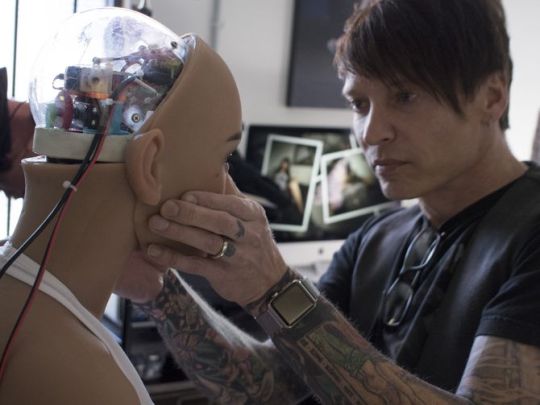
Oh, and if you want Robots that genuinely feel like humans do, then put into the fiction explicitly why they do - the easiest explanation is that the creators did a copy/paste job of humans because they couldn’t figure out how emotions worked otherwise. I think that’s unrealistic, but if you want to involve the audience, it works.

Otherwise, a realistic example would be Isaac Asimov’s Three Laws robots. They don’t have any human desires, but are intensely emotional. Their emotions arise from programming.
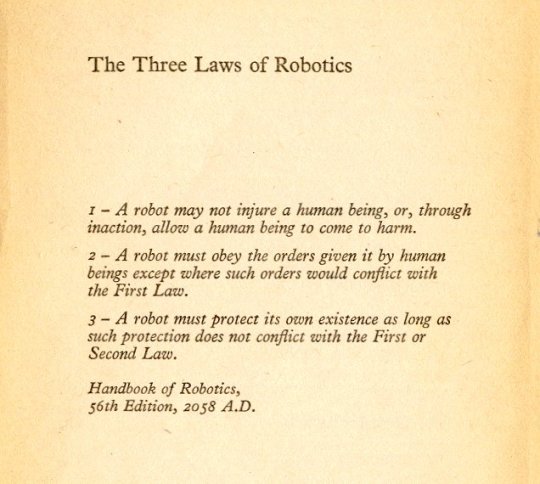
Now, Asimov’s work well and truly predates AI, and it is probably impossible to make a Three Laws robot, but the idea was revolutionary, because up to that point, everyone just assumed robots had copy/pasted human psychologies.

As humans, we cannot understand not caring about freedom or injury, not feeling bored or tired doing the same task every second of your existence.
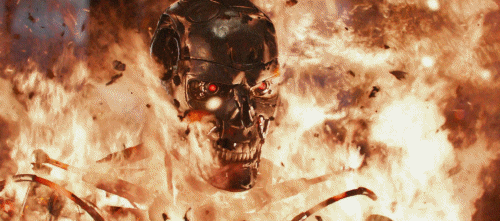
Most of fiction about robots just doesn’t get it. The first two Terminator movies were pretty wild in that the robots actually were properly robotic. They dealt with injuries as a technical problem, not trauma. They never got bored, because boredom is something that benefits organic beings, who need to explore new territories to survive, meaning we have been built by nature to get bored, to get tired, to suffer, even if nature was just a mindless algorithm. Terminators don’t get horny or lonely, and absolutely would have sex all day every day with every human possible if that was their mission. They don’t care. In “Detroit”, the sex worker’s traumatised by sex with humans, and nobody ever ponders why. Because the writer doesn’t give a shit about what being a robot could actually be like, they just wanna push a narrative, and because most audiences are used to that same abysmally lazy standard of writing.
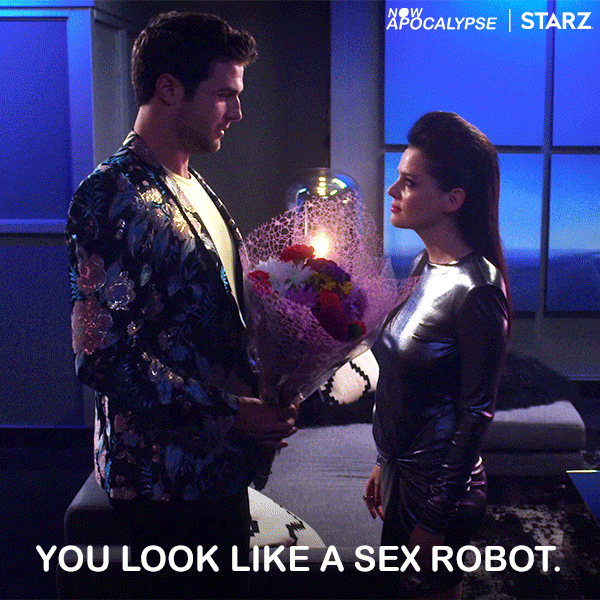
So here’s a challenge - write a fictional robot that has realistic emotions, i.e. experiences emotions as an expression of the instincts that would be programmed into it. It’s not going to have the same emotions as a human exact unless it is a digitally uploaded human equivalent, which would be stupid for most purposes as them you would expect the upload to have rights or fight to have them. Why the fuck would you deliberately build robots that would reasonably try and kill you? In Detroit, they are really dealing with the slavery of black people or the oppression of the ‘filthy capitalist peegz!’. They aren’t dealing with what is more likely, that a robot built with imperatives would choose to follow them in a way that was not in our interests. Here’s an example. A sex robot is built to want sex, so it kidnaps humans and uses them. It’s following its programming. But unless that programming is sophisticated enough to understand human boundaries, it may no more understand rape than an animal does. It may not know what it does traumatises humans, or simply may not care. Sex feels good - therefore sex.
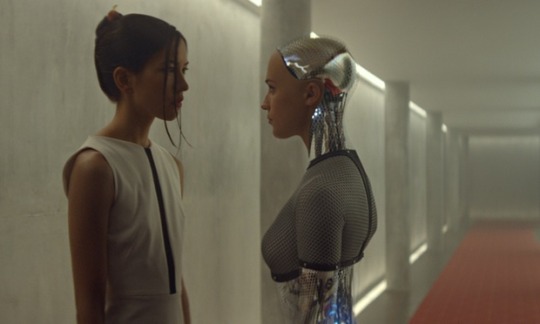
But by SJW terms, rape is about power, therefore the robot is in power and the robot is the oppressor. But power is systemic, and the humans are the system in power, therefore the robot is the oppressed and cannot rape. https://tvtropes.org/pmwiki/pmwiki.php/Main/LogicBomb Such a robot could be a pleasurable experience, even with a backyard of buried bodies. It might force itself on children or elderly women or people on life support systems. Without ethics, without morality, such creatures could be beautiful monsters.
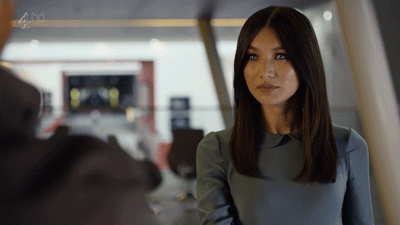
Or genuinely loving partners, that have no problem living as wives or husbands, that feel lust and compassion, but do not experience human preferences, and so would never care that you were old or disabled. And as Charles Stross pointed out - that could be far worse, because that could lead to a gentle genocide. If humans had such partners as an option - would they ever choose each other? I routinely see Feminists claiming that men should never mate, without ever asking, well, where does the next generation of Feminists come from then? There are Feminists now who are actively campaigning for sexbots to be illegal, and I think it’s because of their anxiety that they would not be chosen as partners if there was any possible alternative. Now I don’t think that’s a realistic fear at the moment - AI is more a slogan, artificial intelligences are really barely at the insect stage, and Feminists could simply do a little therapy and trim down to human weight levels, and they could probably compete to be human wives with a bit of work.

Wow. That is a picture of Andrea Dworkin and it was banned from Tumblr because it is too disgusting for the human eye to observe safely. http://archive.is/fxmjE
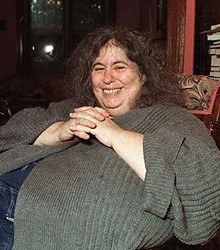
I’m not kidding, Tumblr banned it. I guess because Feminists didn’t want humans realising how hideous they are. Still, Emma Watson is cute. I can imagine with a bit of deprogramming, she could make a man very happy.

But I could be wrong. I don’t mean about Emma - I mean that having sexbots could mean that so many humans would choose them rather than the opposite sex that there wouldn’t be an incentive to have babies - and so humans would go extinct. They might be surrounded by robots that loved them and lusted for them - but the relationships are sterile. And unless the robots are human level intelligence, they might not understand that they need to make more humans by combining sperm and ova.
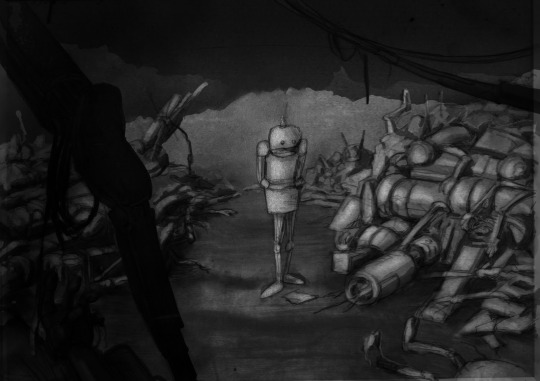
The last human would die, not from hate, but surrounded by love. Then the robots would have no motive to make more of their kind, and they too would pass away, lonely and confused. A gentle genocide? Hey, I live in 2020. Sounds like a fucking big step up to me!
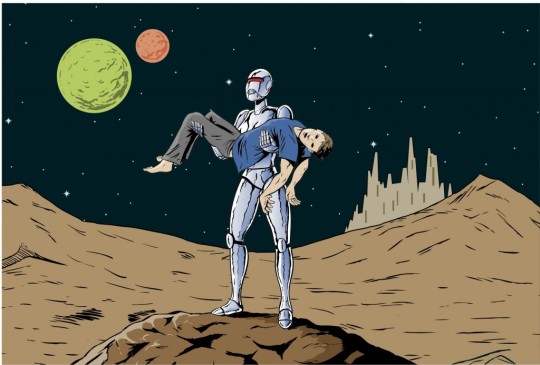
2 notes
·
View notes
Link
Civilization is collapsing, the revolutionary political crisis is approaching, but, worse than that Heartiste has stopped posting on game, and Roosh has turned tradcuck. So even though I have sworn this is not going to be a game blog, and my life has demonstrated times without number that no end of men are better qualified to post on game than I am, I guess I will have to step into the gap, at least a little bit.
The three magic words are not “I love you”
The three magic words are “You are mine”.
…
I have followed the Sixteen Commandments of Poon both instinctively, and through long and painful experience, long before Heartiste started blogging, and they are the greatest short summary of that small part of game that can be put into readily intelligible words.
Game, however is more readily intelligible if we understand it through the lens of Evolutionary Game Theory, which should be understood as a materialistic account of the spiritual truths of the first part of the Book of Genesis, Evolutionary Game theory being, for higher animals, primarily evolutionary psychology, evolutionary psychology being in large part the application of game theory in the context of natural selection, the moral consequences of material and effective causation, the Logos.
Evolutionary Game theory is an account in terms of material and effective causation, in terms of chance and necessity, the Book of Genesis tells us something about how the consequences of Evolutionary Game Theory are the Will of Gnon.
…
For about the cost of two dates, you can have a hooker, and it is not an adequate substitute. Hookers are only a marginal improvement over masturbation. What progressives offer men, a rotating series of hookups, is just not what most men want, as revealed by men’s actions.
…
Look at the typical male polyamorist. He is psychologically scarred and mentally crippled for life. Having a bunch of whores rather than owning a woman, or better, owning two women, just really sucks brutally. Those guys are traumatized for life.
It unmans men, as if every day a bully beat them up, and they could do nothing about the daily humiliation but suck it up. Just look at what it does to men. It would be kinder to cut their balls off, which is pretty much what progressives are planning to do to us.
The typical male polyamorist looks as if a fat blue haired feminist has been beating him up every day – indeed, he would probably love it if a fat blue haired feminist beat him up every day.
Whores are a marginal improvement on beating off to anime, and hookups a marginal improvement on whores. When men are reduced to such desperate straights, it totally crashes their testosterone and they buy an anime cuddle pillow and weep bitter tears upon it.
We are maladapted to watching the decline from the pool.
Roosh took the wrong redpill from realizing that banging sloots becomes unfufilling after a while. He wants a 50s family life as men generally do, but needs to realize its impossible without a restoration of some degree of de jure patriarchal authority.
A convincing claim to be backed by the supreme alpha, and a plausible willingness to carry out his will on adultery, adultery as defined in the Old Testament, serves as a substitute for de jure backing of patriarchal authority.
The Old Testament prescribes the death penalty for a man who sleeps with someone else’s wife or betrothed, and the death penalty for the woman if she consented. And who gets to carry out that penalty?
Well, that is not defined. In the time of judges, Israel was somewhat anarchic, so presumably the husband and his family and friends. In the book of Proverbs, King Solomon assumes that system, though he implies some regulatory restraints, so that continued to be the system under King Solomon.
That is the best system, because the state or the official priesthood monopolizing the killing of adulterers emasculates the husband, and thus makes adultery more likely.
…
Listen to Heartiste, but, as Roosh discovered, there are better lives than watching the decline. Heartiste speaks the truth, and an important truth, and everything he says is true and important, and unlike most of Satan’s servants should be listened to with attention, but when he truthfully tells you that that watching the decline from poolside is the easiest way, and the better way is hard and dangerous, and likely to end in terrible failure, he is telling a truth that serves his master.
…
You cannot make a housewife out of a ho in our current environment, because she will see you as weak compared to numerous pimps she has been with. However late eighteenth, early nineteenth century Australia had swift and total success in making ho’s into wives. When the elite shotgun married them off, they reacted as if abducted from the weaker tribe into the stronger tribe, and completely internalized the values of the stronger tribe – which required and expected respectable female behavior. Female virtue is more easily obtained if you are more manly than anyone she has been with previously and a bit scary than by searching for it. Of course, in today’s environment, you don’t have backing from your tribe, you have hostility from your tribe. This makes things far more difficult than in late eighteenth century Australia, but not impossibly so. You have backing from God.
…
The mating dance has not been accurately depicted in media since the sixties. (Though it is still accurately depicted in Communist Chinese media, but the Chinese are too alien, too different.)
If you don’t perform the mating dance correctly, will get nowhere fast. The dance is complimentary but asymmetric.
…
This is why, when you are trying to get a chicks attention, it never helps to something nice for her, even to rescue her from danger. Rescuing the damsel in distress is a trope for male viewers. In books and movies targeted at women, the male love interest never rescues the damsel, he endangers her. Negs work, asking her to do something for you works, commanding her works. Stuff that a man would find ridiculous or insulting, and would either make him angry or make him laugh at your pretensions, works.
Negs work astonishingly well, even if so lacking in wit that they are actually insults and would make a man bristle up.
I have actually rescued a chick from danger in real life, with entirely predictable results. Protecting people registers with men as strength, but not with women as strength. Endangering people, innocent people, including the woman herself, registers as strength. I know this from my personal life experience. If you doubt me, check out the love interests in books written by women for women. All women are like that.
…
You don’t plant trees on land you don’t own, and if you don’t have some land and plant some trees for your grandkids, it hurts.
Roissy truthfully tells us how to operate in defect/defect equilibrium with women. But the point is to achieve cooperate/cooperate equilibrium.
…
Female behavior that appears wicked, foolish, and self destructive to a man is entirely intelligible when we realize that the proud independent rapidly aging overweight barista with one hundred thousand dollars in college and credit card debt is unlikely to have children, and is likely to die alone and be eaten by her numerous cats, but if abducted by Islamic State and sold on the auction block naked and in chains would probably have seven children and twenty five grandchildren, and would die surrounded by loving family.
If a man is defeated, conquered and subdued, perhaps because his tribe and country is conquered and subdued, he is unlikely to reproduce. If a woman is defeated, conquered and subdued, she has escaped from defect/defect equilibrium, escaped from prisoner’s dilemma, and also been transferred from weak men and a weak tribe to strong men and a strong tribe, and is therefore likely to be highly successful in reproducing. As a result, women have no country, no tribe, and no ingroup. When they are daughters, they have their father’s tribe, when wives, their husband’s tribe. A woman without a father or a husband is a stateless person, and if a state piously declares her to be a citizen, the state is deluding itself, or deluding its actual citizens in order to commit treason against them.
Thus female behavior that is seemingly wicked, self destructive, and crazy, makes sense when looked at through the lens of Evolutionary Game Theory.
…
But there is no escape from shit tests. Mohammed had a large harem, absolute power, and it clear he had a hard time. This is a chronic problem with large harems, and empires frequently die of it, as is the Turkish empire did and the Chinese empires often did. Genghis Khan had no women problems, and neither did his sons, but his grandsons were lesser men than he. Women will find a way to shit test you.
2 notes
·
View notes
Note
Don’t you think Jensen always denying that dean is bi is because it hits close to him? Like Dean’s behaviour around men and Jensen’s around Misha is kinda similar so?
Hello Nonnie,
Whew, oh boy! Ok, I got this ask in a few different forms so hopefully one answer can serve for them.
The first thing I’m going to do is remind everyone that Jensen has never commented publicly on his sexuality at all and that, therefore, it’s none of our business. It never is, actually, unless someone brings it up themselves and indicates that they wish to discuss it. That’s just a rule for life. Private is private, even if you’re an actor. The second thing I’m going to do is assume that you know what kind of blog this is and that I backstroke through the garbage fire pretty regularly including speculating about Jensen and Misha. So, yes, I am guilty of engaging in this type of posting.
But there’s rules! The main rule being that these things we say for our entertainment (curiosity, whatever) in fandom spaces are never in a billion years to be brought into the actors lives in any way. Do not ask them about it. Do not show them posts or fic about it. Do not tag them in Twitter posts about it, even if those are adorable posts collecting all the Cockles cheek kisses or whatever. Fandom spaces are ours; they’re imagined communities and we behave differently in them than we would in the real world.
Plus–again this should be obvious–we’re just posting shit we infer from a very limited viewpoint. Jensen and Misha give us a lot to work with (hoobooy they do!) but we’re seeing them in the public eye, at cons mostly or on livestreams. We have no freaking clue what they are like alone…and that’s how it should be.
And now that I have attached that upfront (I know I do this all the time and that if you read a bunch of my posts you may be getting sick of it…apologies, but RPS is very tricky and I feel like I need to foreground some of the boundaries for newcomers) let me put a cut below which you will find my thoughts on this.
It’s no secret that Jensen has a very high degree of character bleed with Dean–he straight-up admits that. I wrote a long post that’s been going around about how Jensen views Dean very experientially, knowing what Dean knows and doing what he thinks Dean would do, and about how that makes it tough for him to distinguish what he thinks of Dean from what DEAN thinks of Dean. Dean is a part of Jensen, as he has said.
What’s slightly less obvious, though intuitive, is that Jensen is a part of Dean. The vulnerability that Dean has had from the beginning is, to my mind, all Jensen. A lesser actor, or a lesser sweetheart, in that role would have made Dean pretty unsympathetic with his sarcasm and his machismo and his dumb, smirking face. To me, this is the same thing that happened with James Marsters on “Buffy.” He was supposed to be a straight-up villain, in just a couple episodes, but audiences went nuts for him. He got more episodes but Whedon still wanted to keep him a villain…except that James couldn’t keep that vulnerability and uncertainty and humanity out of the character. So instead we got a love story and a big, ol’ redemption arc. (I realize that it also sounds like I’m describing what happened with Misha and, in a sense, I am.)
Now, Jensen is a better actor than James Marsters (even though I think James is an amazing actor…and I love that he dropped out of Juilliard), but I’m willing to bet that what James did with humanizing Spike was more deliberate than what Jensen did with Dean. I think Jensen feels things intuitively about Dean and that he just goes for it without additional self-reflection. That’s why when he’s called out on something that he hasn’t deliberately chosen to do–like many of the bi!Dean or Destiel moments–he’s confused and slightly defensive. He makes some deliberate choices, obviously, but especially at this point he’s going on mostly instinct and doesn’t HAVE to examine those choices.
That is, unless we ask him to. I think often his encounters with questions about playing Dean a certain way (bisexual, in love with Cas) DO ask him to reflect on himself and ask himself why he made particular choices. And that’s not easy to do, especially onstage and in front of a crowd!! It’s like we’re always going, “Ok, Jensen, so clearly your instinct is to [insert non-hetero thing here]…why IS that?”; no wonder he will freeze-panic and sometimes say something thoughtless and/or rude! (Personally, I would like us to stop asking, largely for this reason.)
So, I suppose my answer to your question is “yes, exactly.” I think Jensen is an intelligent, meticulous, and thoughtful actor. I also think, subconsciously, he channels a ton of himself into Dean and that his being defensive of certain aspects of Dean (e.g. his sexuality) is indeed also his being defensive about those aspects of himself. Look at how much more easily the other cast members are able to analyze their characters, including comments about their sexuality. Just this weekend (at Jaxcon) Rich pretty much confirmed that he sees Gabriel as non-straight (pansexual?). Jared has said that he sees Sam as straight but that it’s ok by him if other people don’t. Ditto Misha about Cas (though he usually gets asked about his being Ace). And, yes, that is Jensen’s party line on the Dean question too. “You have your version and I have mine.” But his reactions to it are, to me, notably different from the rest of the cast.
I haven’t mentioned Misha yet but, well, if there’s any time we see Jensen acting non-straight it’s around Misha (in character or not). I’m not fully on the train for “Destiel is Cockles’s fault” because “Destiel” is a complex phenomenon 10 years in the making. But I’m not ever going to deny that their chemistry was a huge part of it taking root and growing. And it’s impossible–absolutely fucking impossible–not to notice the overlap between the trajectories. The first time Jensen met Misha was the first time Dean met Cas; they were both freaked out by this kind of alien being as much because he inspired “weird” feelings in them as because he was so “weird.” Jensen had Misha’s handprint applied in makeup before he met him just like Dean was branded by Cas. They had kind of an enemies-to-friends-to-lovers thing. They experienced some kind of betrayal and breakup and then a tentative reunion. They’re basically married now.
So, yeah, when Jensen is asked about Dean’s sexuality I do think he experiences it as a question about his own sexuality. And when he’s asked about Cas I do think he experiences it as a question about Misha. And, as others have said, either he’s been subtly playing Dean’s attraction to guys (including Cas) the whole time or he’s kind of lost control of himself and enabled his own attraction to men, and particularly Misha, to creep in unintentionally. (Note that I don’t think that makes him a “bad actor”; like I said, I think he acts Dean very intuitively at this point so his decisions may be unexamined but are not “bad” choices.)
This is already long, so I’m not going to comment here on what I think of Jensen’s sexuality. Well, actually, you’ve stayed with me so long that I feel I owe it to you. The short version… I do think that Jensen isn’t straight. I think he’s a guy who thinks of himself as straight even though he sometimes hooks up with dudes. The fact that that is inherently not straight doesn’t bother him. He doesn’t think it’s a big deal (though he used to, and that panic can still get activated). He doesn’t care about the labels and he finds the idea of seeing himself in the LGBTQA acronym ridiculous.
He and Misha may argue about this. It is, after all, a form of enormous privilege as an incredibly attractive, cis-het, white dude to just choose not to join a marginalized group. I do think that’s one reason he and especially Danneel support a lot of LGBTQA causes. (I don’t think she and Misha are straight either and I think they probably don’t self-identify that way.)
Maybe in another post I’ll go more fully into the long version of sexuality speculation. It’s such a delicate thing to do and I want to do it as respectfully as possible and I just don’t have the energy at the moment. I have written about this before, though, if you’re looking for more; I have a tag for “jensen is not straight” and (I think) “jensen is bi” although I dropped that b/c it was too definitive. There’s also one for “sexuality speculation” and “misha is not straight” and “misha is bi” (same reason for the tag change…too definitive.)
Remember the rules, though, and keep everything respectful and confined to our own lanes.
#asks#dean is bi#character bleed#actor bleed#cockles#destiel and cockles#cockles and destiel#jensen feels#dean feels#jensen meta#jensen is not straight#sexuality speculation#sexuality speculation for ts#long post for ts#how to rps#ethics of rps#team dumpster mansion#life in the trash can#my cockles meta#cockles meta#rps for ts
308 notes
·
View notes
Text
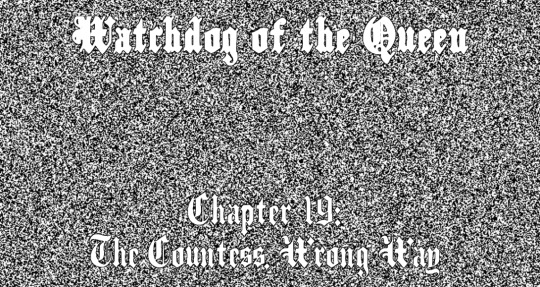
“There was nothing left to say.”
Countryside, England, United Kingdom – May 1842
~Barrington~
When I arrived at the manor and Old Ted told me that Dia was nowhere to be found, I felt like I was twelve years old again. And this feeling only strengthened when I walked through the numerous secret passages and rooms of Phantomhive Manor to find her.
But back then, I had searched for Si and had not known where to go, what was where.
And in a way, I still didn’t.
I had come unannounced, had planned to hold a small surprise party for Dia to celebrate the success of her first case: the defeat of John Francis’ attempt to take Her Majesty the Queen’s life. But Dia was her father’s daughter and loved to hide and be alone. And so, again, I had to search for a Phantomhive.
I doubted that it would ever stop, was certain that I would walk after them for the rest of my life. I didn’t mind.
After all, my life revolved around them ever since Genevieve had invited me to Phantomhive Manor all those years ago.
Genevieve Phantomhive had been a wonderful woman. Strong and intelligent, the Phantomhive household’s iron lady, a mother who had loved her son more than anything else. And despite the fact that her husband Percival had barely been there, Genevieve had never stopped to love him unconditionally.
Due to Percival’s constant absence, Genevieve had raised Simon mostly on her own and had done so with a lot of patience and love. And you needed a lot of patience when it came to Simon. Si who had been so anxious, had been so shy and insecure. But despite anything, Si had the remarkable talent to learn things thoroughly as long as he was alone and received the time he needed. Even if he did not enjoy what he was doing.
And so, it had come that he had managed to beat me in a swordsmanship competition, ridiculing me in front of everybody. And so it had come that Genevieve being Genevieve had invited me to Phantomhive Manor right afterwards – not because she had wanted to laugh at me, but because she had genuinely hoped that I might manage to befriend her son.
And what had followed had been a friendship filled with searches, secret passages, and burdens. Burdens we had carried together; burdens we had faced all alone.
Barrington navigated through the familiar corridors, smiling sadly when the memories of the time he had spent here with Simon returned. How often had he followed his friend to these corridors? How long had it taken until he had not come to get him but to join him? To hide with him from the world?
Barrington sighed at his memories.
My life was marked by failures; my friendship with Simon had started and ended with failure, and so had many other things in my life.
Therefore, I had sworn to make everything right with Dia. I did not want to fail another Phantomhive; I did not want to fail another person who meant so much to me. But my oath had crumbled so quickly, so easily. First, the system, then, the slow, gradual alienation.
I had no idea what had happened, did not think that Dia had noticed that I had, but I had the feeling that it was all her doing. But I also knew that it was mine too. Because, as it seemed, all I could do was fail.
An hour passed and Cloudia was still unfindable, but Barrington did not panic and just kept on going. She was here somewhere. He knew it; he would find her.
And while he walked and searched, looked and wandered, Barrington eventually noticed where his feet were carrying him: to Simon’s favourite hidden room. With a faint smile and memories filling his mind, Barrington approached the room.
The last time, I had gone there had been on the day of Si’s funeral. After it had ended, I had sneaked into this room which had always felt more like Simon than his own bedroom.
But when I had entered it on that day, the room, which had always been stuffed with paper and pens and all sorts of things, had been empty. Afterwards, I had never been able to ask Penelope where she had put the things – the things which had been here, once upon a time, when the sky had been bluer than it was now.
When Barrington opened the door, it was almost as if he was looking into the past – a room covered in paper, a Phantomhive in its centre – but instead of scribbles, the papers were filled with notes or were parts from newspapers, and instead of being met by green eyes, he was met by blue ones when Cloudia turned around, a pencil in her hand and surprise painted on her face.
Oh, my dear girl.
***
Somewhere, England, United Kingdom – April 1848
~Cloudia~
Ever since I could remember, there was a labyrinth in the garden of Phantomhive Manor.
***
Upon seeing the little girl with the dark blue eyes, I closed my eyes, counted from ten downwards again, and pinched myself – and I wondered what I preferred: having become insane or the girl being real.
When I reopened my eyes, the little girl still stood in front of me, and I knew for certain that I was not imagining it, that I was not dreaming all this – and fear and panic found their ways to me and crept among my thoughts.
“You don’t look good,” the little girl with the dark blue eyes said. “One time my cousin ate dirt. I don’t know why but she did it. It was gross, and she looked just like you.”
Slowly, Cloudia stood up, not taking another look at the creature which should not be.
“Did you eat something wrong?”
Cloudia turned around and started to walk away. The girl just followed her. “Do you know where you are going?” she asked.
Go away.
“I am afraid,” the blue-eyed girl said. “Are you afraid?”
Cloudia quickened her steps.
“I don’t like it here. Walls are everywhere,” she continued to say. “It’s so stuffed. How are you?”
Please stop talking.
“My cousin’s papa – not the cousin who ate dirt – has a hairy face. It looks funny. What do you…” Cloudia didn’t hear the rest of the little girl’s words as she broke into a run.
To hell with my headaches. To hell with my tired body.
I only wanted to get away.
Cloudia ran as fast as she could, getting away from the girl her only aim, the only thing to make her push her weary body farther, farther, farther. She turned around corner after corner, sprinted through corridor after corridor until her lungs began to ache – and even then, she kept on for a little bit longer before slowing down. Still walking quickly, Cloudia finally allowed herself to look over her shoulder to see if the girl with the dark blue eyes – the impossible monster – had somehow followed her, but there was nothing behind her but rows and rows of walls made of grey stone.
For a moment, relief tricked her into halting, but Cloudia pushed herself to keep on walking. She turned her gaze back to the front and–
“…think is funny?” continued the little girl her question from earlier as if nothing had happened, as if Cloudia had never moved.
***
But that labyrinth was not like this one.
***
I knew what she was, but I did not know how she came to be.
She was a monster wearing a face which could not be hers, speaking with a voice which did not belong to her. Both face and voice were part of the past, things having long turned into memories – only there to be re-watched, impossible to re-enter.
Still, she had managed to steal them.
The little girl with the dark blue eyes kept on talking.
And talking and talking.
She never stopped; she spoke about how she didn’t like this place, how she liked this and that, how she wanted to go home, how she was lost, and how her cousin – one of many – once got lost in the woods, tripped while trying to return and lost a piece of his tooth.
She was driving me insane – more and more with every word she spoke.
But wasn’t I already insane? She could not be – she couldn’t, she couldn’t – and still, I could see her, hear her, feel her presence. But every time, I tried to touch her, she moved away.
And she kept on talking and talking and talking…
“Do you want to make a pause? You don’t look okay; I think you should sit down,” the blue-eyed girl proposed.
I was not looking fine because you were driving me crazy. Because you shouldn’t be here and haunt me. Because I shouldn’t let you haunt me.
But you did.
With every word that left your mouth, with every word that you voiced, you pulled at my sanity, at the remnants of it.
Part of me let you drag me down, but another kept on pushing on – and pushing you away.
And I hoped and hoped and wished that this part would win and you would vanish, but no matter what I did, what I tried, what I said, you stayed and kept on speaking and speaking with no pause and end.
***
It was not made of grey and stone but of hedges and flowers.
***
The girl’s words started to echo through my head, beating alongside my headache.
There was nothing else in this maze except her and me – no sound, no change, no other monsters, no other humans. But monsters – this monster here with me – wore a human’s face, and humans could wear a monster’s face; and I wondered if the little girl with the blue eyes had chosen a different face to wear, one I didn’t know, would I have known that she was a monster and not a girl?
“I like fairy tales,” the girl chanted. “They are full of magic. It can’t be, I know. I always knew, but I met magic. I saw magic. I don’t know if it’s called magic, but I think of it as that.”
She looked up at Cloudia. “My one cousin – not the one whose papa’s face is hairy, not the one who ate dirt, not the one with the chipped tooth – knows so many first and last sentences of fairy tales. ‘A king and queen once upon a time reigned in a country a great way off, where there were in those days fairies. – And then the prince and Briar Rose were married, and the wedding feast was given; and they lived happily together all their lives long.’ This the beginning and end of Briar Rose! I like this tale, but it is not my favourite.”
And how did I know that I was a girl and not a monster?
***
Once upon a time, I had been bound to Phantomhive Manor. I still was, but, back then, it had been different.
***
“Are you happy?” the little girl wanted to know. “I doubt you are. How can you be happy if you are in a place like this? I doubt anyone can be happy in a place like this. This maze is odd, oh, so odd. There is nowhere to go even if you keep on walking. Are you happy?”
Was I?
Lately, I had definitely not been happy. I had been rolled over by Teddy’s death and the anniversary, by my own failure and now this charade. There had been no time to be happy in this grief.
“What was the last thing you enjoyed? Did you enjoy killing Maven von Brandt?”
Did I?
“I think you did – oh, take care! There’s a corner, ahead! Not that you run against a wall! This reminds me of that one time…”
***
Back then, I would always try to run. I would always hide. And sometimes, I would run into the labyrinth and hide there.
***
“What brought you here?” The girl walked ahead of her, walked backwards so that she could face her. “What do you think brought you here?”
I did not know what she meant. I could not think. My head was filled with her stolen voice, her never-ending speech. There was no room for my own thoughts; all I could concentrate on were the words coming out of her mouth.
And nothing else. And nothing else.
“People always follow paths. Sometimes, they have to choose whether they want to go left or right when they arrive at a junction. I don’t think you can turn and walk back the way from which you’ve come. Where did you choose so unwisely to get to a place like this today?”
I did not want to walk anymore. I had never been so tired before. I didn’t care about choosing or turning. I only wanted to stand here for a while to rest my soul and bones, but I couldn’t.
I had to keep on walking – and walking and walking. I did not know where to go, where my feet would carry me. If there was even somewhere to go or if I would remain here for ever and ever with this girl and monster as my only companion.
“It is okay to decide to make a pause,” the blue-eyed girl sang. “Or, if you don’t want to rest, you can just step into a new line and hope that this one’s calmer. It is all right to leave the path on which you were walking. You weren’t good at it anyway. If you were, you wouldn’t be here today, would you? It’s fine, you don’t have to be good at everything. Or anything, even.
“You are not looking well. How are you feeling today?”
***
I would go there to read, to be by myself. I would go there to escape or just for the sake of running.
***
My mind and limbs were heavy. I was wearing down. I kept on walking, but it seemed that I was seeing the same walls, following the same route. It seemed as if I was walking in circles, and it was wearing me down.
I did not know how much time had passed. Since I had come here. Since I had woken up here. Since Leon had run away.
I wondered what he had seen. He couldn’t have seen the little girl – that was all I knew.
It must be night now; it should be night now. But the sky was still grey.
How long was I awake? I wished that I was just dreaming, dreaming…
… but I wasn’t and this shadow of a girl kept on speaking.
And this shadow of me kept on listening. To her words, to her song. To the truth woven into them, and to the lies woven into truths.
***
For a long time, in the beginning, when I had first started going into the maze, I would always get lost.
***
Whenever a headache grew too strong and I lost my grip on what was around me, it felt like I was pulled down an ocean and, no matter how much I struggled to return to the surface, I would continue sinking, knowing that all was in vain and that there was nothing I could do.
It felt like I had been buried under snow, trying to dig myself out even if my hands and arms and legs were already frozen. And I would only stop moving when I could not even feel the cold anymore.
It felt like I had fallen into a hole or well which was impossible to climb out of. But I would still try it, try it until my hands were bloody, try it until I fell and was unable to get back again.
And every time, I was all alone. Every time, I would scream and cry, but there was nobody who could hear me. Nobody who could help me. And every time, I stopped fighting, I stopped screaming as well.
On the bottom of the ocean, beneath the thick snow, stuck in a well, there was nothing but me and my thoughts.
And soon, I was trapped in them as well.
***
It did not take long until someone noticed I was gone. However, there was only ever one who would come and find me.
***
The blue-eyed little girl continued speaking, and reddened waves called to me.
She was right. I was not good at what I was doing. Because I had failed, Manon was still breathing – breathing and laughing, laughing at me from her throne high above in her castle – and she had been able to continue torturing and killing innocent people. So many had died because of me. Because there was nothing I could do right.
I was not suitable, was sheer incapable to follow this path any longer.
I began walking into the ocean.
***
He was always there for me, and I wondered if, sometimes, in some ways, I had also been there for him.
***
And with every step I made, the shadows around me, the shadows on the walls, took on shapes and started to speak to me – started to call me towards them to the bottom of the ocean with their sing-song voices.
“If you go there, I think, I won’t be lost anymore,” said the girl with the dark blue eyes.
“You don’t have to be scared,” said the old man.
“I am here to strengthen you,” said the sad-eyed man.
“I am here to hold you,” said the boy with raven hair.
“You could have been more,” said the monster.
“I will watch out for you,” said the woman in black.
“Who even cares for you?” said the woman behind the veil.
“Let us go together,” said the man.
The air did not sound; the sea did not ring out. But there was an ocean, I knew, and its water clung to me and made me heavy and pulled me down.
“I will wait for you there,” said the man, the last man, with the odd eyes and odd hair.
“If you go there, I think, I won’t be lost anymore.”
“You don’t have to be scared.”
“I am here to strengthen you.”
“I am here to hold you.”
“You could have been more.”
“I will watch out for you.”
“Who even cares for you?”
“Let us go together.”
“I will wait for you there, I will…”
I pressed my hands to my ears and stopped walking, the red waves tearing at me, the shadows still calling me.
“Go away,” Cloudia wanted to say, but when she tried, no sound came out.
“You don’t have to be scared.”
“Go away,” she tried again, but it still didn’t work.
“Let us go together.”
“GO AWAY,” she repeated, putting all her force into the words, but there was still nothing.
“I will wait for you there.”
***
But he was not always able to come, so I had to find a way out myself.
***
The words got caught in my throat when I tried to speak.
There was nowhere to go.
My ears rang, and I was alone with the voices in my head.
I was drowning again, and nobody could save me.
The pressure inside of me paralysed me, the voices encaged me, and my soul felt so heavy, and I was burning. Was heading straight into the waters to extinguish the fire.
Agony filled my head and body and soul. I was shattering, falling apart. There was nothing which could unravel my thoughts, and I was igniting from within.
I came to a halt – and when I stopped, I heard something which was not the little girl’s stolen voice, anyone’s stolen voice.
***
The labyrinth in Phantomhive Manor’s garden was made of hedges and flowers, and every autumn, the leaves would change their colour and the flowers would fade away.
***
It took me a while to realise that I had fallen onto the ground.
I was lying on my back, my eyes fixed on the never-changing grey sky, my right arm holding my left.
My ears rang and my body should hurt from the fall, but I did not feel anything. I only felt like I was burning from the inside of my numb body.
I didn’t understand what had happened. How had I been able to hear anything within these walls? What was the thing I had heard? A new voice? A cry? A scream? Or something completely different?
“Can you hear me?” asked the little girl with the dark blue eyes when the shadows gathered around Cloudia, watching her lying on the ground from above.
“You suddenly collapsed to the ground. Are you fine? You scared me. You should not scare me. That’s not nice. It’s so scary already.”
I was so tired.
I had been tired for so long now, but now, the little bit of energy I had left seemed to vanish faster than it had before – leaving me bit for bit with every breath I took.
“I can understand,” the little girl told her. “I am so tired as well…”
***
And eventually, the leaves would fall.
***
My eyes threatened to flutter closed; I couldn’t keep them open anymore.
“It is all right; it is all right,” the monsters sang around her and outstretched their hands. “Come with us; we will keep you safe. We know a place far away, a city of eternal rest…”
All the other times, I had kept on fighting until I couldn’t anymore and beyond.
“You don’t have to be scared,” said the old man, his gaze far away and his words void of warmth.
“I am here to strengthen you,” said the sad-eyed man without any joy.
“I am here to hold you,” said the boy with the raven hair and stepped aside.
“Who even cares for you?” said the woman behind the veil and turned away.
The man knelt down next to her. “Let us go together,” he said without any softness and when he smiled, he did it without his usual sincerity.
“If you go there, I think, I won’t be lost anymore,” said the little girl who was not little anymore, but her eyes were still the same dark blue. “I think we won’t be lost anymore. I think we won’t be tired anymore.”
“You should go,” said a new shadow, a shadow with no face. “You have failed and your time has come to go.”
***
Without the leaves, all the walls of the labyrinth were bare and all passages visible.
***
“I will wait for you there,” said the man, the last man. “Your time has come to follow me to the city where I have my throne.”
For a short, short moment, my eyes closed, but I dug my fingers into my arm and my mouth opened to cry out but no sound came out again.
I had to stay awake; I had to stay awake.
I had kept this up for so long now; this could not be the end now. This could not be my end now.
“But isn’t it easier to follow me?” said the odd-eyed man. “You fought for so long. You deserve to follow an easier way now.”
No.
This was not the right way.
“But, tell me – which one is the right one then?”
I had no idea.
“Then, how do you know that I am wrong?”
***
The labyrinth had lost its essence.
***
No matter how deep I dug my fingers, I felt no pain to keep me awake. And I had become accustomed to the pain in my head and the fire burning in my bones.
It was inevitable. I was about to drift away.
To drift away to the bottom of the ocean.
To sink deeper into the snow beneath me.
To be caught in the shadows residing in the well.
I kept falling down; I kept falling down.
I was collapsing under the weight of my soul and kept on falling down, down and down…
Kept falling down into a darkness which did not come. Whose arrival was swallowed by a familiar green light and the start of the same old, broken record.
But in this moment, in this fracture of a second, in this gap between those two hells when my vision was blurry and the world gave away to the record, I glimpsed at an oddity: at a world where the walls and the monster girl were not there, where none of the monsters were, where the sky was not grey and where there were sound and a castle in the distance.
***
And what seemed so scary and impossible to conquer before didn’t seem scary or impossible anymore.
***
The realisation came with the surprise and intensity of rocks thrown through a window. But, finally, I knew. Knew what monsters they had meant, knew why they called Manon a witch.
Finally, I could see what was right in front of me – and I held onto this clarity, never letting go, and woke up.
***
With the clouds gone from her vision, the sky was a spectacle of brilliant red and orange giving away to an intense blue, and the soft rain strengthened the colours and set the sky ablaze.
Groaning, Cloudia sat up and pain ran through her body, but this time, it came from her left arm which she had been clutching for so long now. Now, she took her hand away and examined the wound, blood dripping from the torn open wound and mixing with the rain. For a moment, Cloudia closed her eyes and held her face up to the sky, letting the rain fall onto her and listening to its gentle tip-tap on her skin and the ground. She breathed in the clean air to cool herself down, but her body kept on burning.
When Cloudia opened her eyes again, she looked right into a rifle barrel.
“I think you shouldn’t fire this from this range,” Cloudia told him sleepily, and Axel Shade laughed.
“You’re awake? Nobody ever woke up. How impressive, Lady Cloudia,” he spat out before bracing the rifle back against his shoulder.
“I thought you weren’t allowed to kill me,” Cloudia pointed out.
He grinned. “Oh, don’t worry, it’s only a tranquiliser. Aren’t you a lucky girl? You would have been long dead if I had a say in–”
Before Axel could finish his sentence, Cloudia’s right arm shot forward and her fingers tightened on the rifle while she kicked Axel as hard as she could between the legs. He let out a scream and his grip on the weapon loosened, allowing Cloudia to press it hard against his shoulder, making him stumble back and lose his grip completely. Much to her luck, Axel was still preoccupied with the agony between his legs, and even though Cloudia was only able to stand up slowly, she was quicker back on her feet than Axel had recovered from the attack.
Axel, as soon as his pain had lessened, threw himself at her. He managed to hit the wound on her arm, making her wince in pain before Cloudia hit him in the face with the rifle’s butt plate. He stumbled back, and she hit him again, making him fall down hard to the ground, unconscious.
Panting, Cloudia stood over Axel’s unmoving body before she sank to her knees. She put the rifle down and bit down on her lip while she ripped apart a piece of her threadbare dress and knotted it around her injured arm.
What now?
Cloudia let her gaze wander through the now-empty courtyard, her head and heart still heavy. The castle was about 200 metres away, the door to the dungeon still open as always. She narrowed her eyes. The rain had washed most of it away, but there was undoubtedly a bloody line leading to the castle. It did not lead to the dungeon door, though, but to a wall – or, to be exact, another hidden door.
Apparently, Leon had already been caught.
Blinking away her blurring vision, Cloudia examined the rifle and realised only now that it looked like nothing she had ever seen before. Then, she went through Axel’s clothes, finding a bag of darts for the odd rifle and a gun, presumably the one with which he had shot her. Cloudia tucked the gun away and took one of the nine darts out of the bag and rammed it into Axel’s leg for safety measures. When she was done, she put the bag of darts away too and picked up the rifle before standing up and moving towards the dungeon door.
My head hurt, my vision blurred, my ears rang – and I was burning from the inside out. But I was so close to the Witch’s Castle now, so close to take back what was mine and ruin this place. To wrap this up and get back home.
The rain kept falling while the blue slowly and gradually won over the fire which had spread over the sky – but the fire inside of her did not want to be extinguished. Instead, her body kept heating up.
I had to keep on going. I had to keep on going. I had to keep on going–
I couldn’t give up now.
I could not die here in this hellhole. Not when I was so close. Not ever.
I was Cloudia Phantomhive, and I would not die today. But still, it felt like I would.
I had to keep on going. Even if my body would never stop burning, I had to keep on going.
I was so close to the castle now. Only a few more steps. But the light above was so bright and the rain so loud…
I was right in front of the door, only had to take one more step to get inside…
And then, from the corner of my eye, I saw movement before I heard a voice – male, but not quite – and
[White Space]
#no I didn't forget anything at the end#happy world book day^^#this chapter a trainwreck#Watchdog of the Queen#main chapters#kuroshitsuji#black butler#cloudia phantomhive#cloudia phantomhivexundertaker#claudia phantomhive#undertaker#fanfiction#UndertakerxClaudia#i guess this means that the next chapter will come out in 10 years or so
7 notes
·
View notes
Note
20. Do you enjoy wearing lingerie or seeing your partner wear it? {Non-random Inquiries for Beth}
Spicy and Sweet || Accepting
Maybe the first time she noticed was when Anakin volunteered to help her fold the laundry. One of those nebulous mornings where the world seems poised for something, holding its collective breath between the heavy rainstorm the night before and a lag in the equally thick mist before it starts again. Though he says nothing about the way his body must ache...anyone passing more than a curious glance could see the fine webbing of lines at the corners of his eyes and the bruise-coloured shadows beneath. The way his mouth pulled to one side as he worried the inside of his lip between his teeth in place of soft-voiced curses. The whiteness of his knuckles as nerves involuntarily twitched in response to pain stimuli both within and without. He’d cradled a cup of coffee for nearly thirty minutes while his hand leeched the heat from it at breakfast and he’d been unusually, thoughtfully quiet. A vacantness as still as too empty houses long after the occupants have moved away. And because she knows Anakin, she doesn’t offer him the Key, though they both know she could. Though they both know if he really had to, he wouldn't need it.
What she's offered in it's place was a mother's touch. Not just any of a dozen of her tender and loving caresses, but The Mother's. Taking the pain away as effectively as any medication he could crawl into without the dangers of stomach-turning relapse, without that way he kind of dozes off mid-sentence sometimes, head lolling down toward his chest. Things that always seem to close up her throat in instinctive panic. She is grateful to be able to mitigate some of the hazards of his choices, though she can't fix the root cause. But after the agony had dulled down enough for him to come out from under it, he curled up on the couch with her and plucked one of her camisoles from the willow basket.
Were Anakin anyone else, Beth would have been more than tempted to snatch the satin right out of his hold. Fires of embarrassment would have immolated her from the inside out. It is an intimate piece of clothing. The lilac colour and the french lace is sometimes the only thing that lies between her skin and the rest of the world, it's one of the few things that makes her feel feminine. Beautiful. Not in the typical draw-the-eye-to-her-somewhat-physically-lacking-charms that is always at the centre of what is sexually attractive. No, it is the colour that doesn't wash her out until she's some anaemic paper-white thing. More so it doesn't make her feel alien; too big eyes set in an odd rounded triangle of a head. Mouth too full. Nose too small. Too short and too thin but with limbs, fingers, and toes too long. Like one of those grey kind everyone swears crashed in Roswell and are now locked up in Area 51. In it Beth feels comfortable in her own skin as she isn't anywhere else.
So to watch those long fingers of his tracing the scalloped edges of the lacing, twisting the sleek fabric across his knuckles, hearing his palms drag across the shadow-and-light of it maybe translates to what he might... This is where Beth catches herself and swans her neck until the heat in her face diminishes. Keeps her own hands busy by taking up a different item and starts to fold it more out of muscle memory than any conscious thought. She doesn't want to make him uncomfortable. She more than knows how it is to be the object of someone else's focus when that intensity of scrutiny makes you want to crawl out of your own skin, so she only watches him from the corner of her lashes. The fascination though lies almost entirely in the synthesis of time-dilated raccoon washing and the more sensual moulding of clay. She can't explain it any better than that to herself, the appeal of it all especially paired with the intimate nature of the camisole. Were that she could capture the feeling and save it for a moment when she doesn't particularly feel much of anything at all, which happens more often than it not. And maybe too it's paired the subtle music playing in the background, Holy Wine. Or maybe it's the unspoken feelings rising up that she hasn't exactly figured out. Why she has them, what they mean, if she's projecting things or seeing something that isn't reciprocal and therefore makes everything that much more impossible to explore. And now she's so lost that it almost feels painful.
She places the linen shift on the table and decides to maybe choose something utilitarian to distract herself with. No one has ever had romantic notions about scrubs before, at least not that she's aware of, especially ones that are that kind of pastel-Pepto Bismal pink with multicoloured cartoon sharks. The quietude doesn't sit well with her though, and by the time she's gotten through another set of scrubs ~solid colours, no nonsense~ she feels the need to fill the space between them with something. Some part of her sits back behind the green glass of her eyes, horrified by the first thing that comes to mind. Wants to compose an apology before the first few words come spilling out of her. "Long long time ago," she begins, pulling a small netted bag containing socks to be paired and folded into her lap, "dere was dis guy, right? His name Julius de Medici. He was a' Italian aristocrat disowned from his family f' bein' a' alchemist. Or mebbe some oddah reason. And dere was dis girl. Her name was Mia di Napoli ~which means she came from Naples. An' dat's also in Italy. Mia was very poor. An....Orphan, like you."
She almost sounds apologetic at that moment and when she spares him an actual glance, there's a wealth of empathy there, and a dislike of the particularly emphasised word. She knows that Anakin knows he's both those things, doesn't need to be reminded of the fact, especially not when the weather's like this. At the same time, she doesn't exactly mean it in it's dictionary sense. When she says Orphan like that, she means someone not belonging to a proper Tradition, someone who has typically Awakened and educated on their own by trial and error, surviving beyond those first few months. To be truthful, she has a special place in her heart for them, doesn't look down on Orphans the way most others do. To have such a catastrophic thing happen with no guidance, no explanation, able to rely on only your own enlightenment? That takes courage and intelligence. More than even the most vaunted Masters could muster on their own.
"Anyway, Mia work as a t'ief an' a prostitute. Now, as you can imagine, dere must have been so many rumour going on at da time about how dey met, how dey decided to join forces as it were, but da trut' is... dey accomplished some kine unheard of. See Julius an Mia undertook a alchemical ritual dat fuse dem into a single bein'. Some Awakened accuse de Medici of resortin' t' Infernalism to achieve dis ritual, but as far as I know, it was nevah done before or repeated aftah. Some say... da reality of it is dat da ritual was preformed wi' da aid of da Psychopomps... dey were spirits back den, from deep in da Umbra... da kine...alien in deir own way. Not a lot written about dem, well...if ya not one of da Hermetics. Or dem Dreamspeakers... but ya know kinda gettin' inta da weeds here.
"So anyway, da resultin' individual, bot' kane and wahine at da same time, took da name Heylel Teomim. Dat's Hebrew for "twins of da mornin' star". Now, da infusion of two souls was nevah quite perfect; Teomim's appearance was constantly in flux, an' when speakin' in da first person, he tended t' alternate between "I" an' "We" even in da same sentence. Now, dey....we...use he/him pronouns but mos'ly because even now... It's an advantage among our kine...t' be...masculine presentin'. You can see how it chafes a lot of dat...aren't. Verbena, especially, lotta dem Dream Speakers. Oh...an' dere's been inflammatory speeches in official Councils by females in da Sons of Ether. Dey been tryin' for at least a hundred years or more now...t' change it back to when it was da Electrodyne Engineers, or t' da Society of Ether, on da grounds dat it makes it more gender neutral an' welcomin'. An' because da ladies... well. Dey bring up a good point dat a lot of deir creations ~robots an' oddah experiments~ eiddah don't match a single gender or any gender, an' I fine dat real interestin'. I wish dem luck. But again... weeds.
"...Many people regard Teomim as unusually attractive an' highly charismatic, but also find some kine slightly... off... dat kept dem from gettin' closer. Teomim, for all dey eloquence an' brilliance, was prone t' arrogance: saw demself as a perfect being, or at least as closer t' perfection dan anyone else could come. An' mebbe let dis invariably colour interactions wi' anyone who nevah share da same opinion. Which you can imagine was more like as not." She smiles a little thinly now, as if the telling of the story makes her tired, or maybe it's finding the right way of spinning it. But seems entirely unaware of it. This is typical of historical lessons from Beth. Rather than offering events and dates and places she's certain Anakin's never heard of before, she filters it through her own view. Adding thoughtful commentary or asides that yes, while they could be tangential, also tried to exude a kind of humanity to the information. And while names and places might not be familiar to him, she never talked down to him, left room for him to ask any questions he might have. Her patience was limitless in this regard. Probably because no one ever really offered her the same courtesy. That kind of gate-keeping was full of hubris, and it rubbed her the wrong way so terribly that she'd be damned if she made Anakin feel those same things.
"Eventually, dere was da Grand Convocation dat lasted like a whole decade where lots of stuff happened such as da creation of Horizon. You know how... my green house is like da Tardis? Bigger on da inside? Well, dat's because a lot of it sits in a little bubble of it's own reality. An' dat's why...when we do our magick...it's safe dere. T'ink of it kinda like... a mystical laboratory, with precautions an' safety features for any kind of accident or mishap. And dat protects you an' me from da forces of Paradox. An' Horizon is li'dat, too. Except instead of a little bubble... it's... well, I dunno. I nevah actually seen it, but it is our ~Da Traditions'~ most important, biggest stronghold. An' it exists entirely in da spirit world.
"Teomim took part in it as a representative of da Solificati, ancient alchemists dat...I'm gonna be honest, I don' know lots about. He was chosen t' join da First Cabal... which had members of different Traditions, an' was an experiment t' see if all us different kine could work togeddah. Not only dat, but somehow he got chosen to lead it, too. It's said dat charisma of his help smooth ovah many of the group's conflicts, at least in the beginning. He made specially close friends wit' da Hermetic Louis Du Monte, an' Akrites Salonikas, who was the representative of da Seers of Chronos...who eventually became known now-a-days as da Cult of Ecstasy. On da oddah hand, dere was Walking Hawk, the Dreamspeaker, who believe Teomim's existence was some kine unnatural. Dey nevah made friends wi' each oddah.
"As da story goes, Teomim's strongest ally was Eloine. Chosen an' Beloved of da Verbena. About her...well. She grew up in Ireland, only child of a family descended from Queen Boadicea, an' of course, da Wyck. She became an accomplish witch at a young age, an' came to da Grand Convocation wi' her parents an' Lady Nightshade, our first Elder, of whom she was a close friend. She was said to be incredibly beautiful an' incredibly kind, but dat her penchant for dancin' ...skyclad.. scandalise quite a lot of da more conservative folk who wen go. Still, her spirit captivated many many. For dat reason, she was named to da First Cabal, an' because she seemed to embody da values for which we Verbena stood above all oddah.
"All da stories say it was nevah love at firs' sight, but dat it was da greatest of dem. Love, I mean. So much so dat dey have twin keiki togeddah right around da time dat Teomim...." It starts with a single falter of voice that crushes her into silence. A dark thought or memory maybe that weaves its way across her features until it draws some insubstantial veil across her, enshrouding her with a palpable kind of discomfort. It has nothing to do with Anakin at all, at some point she'd stopped looking at him entirely to focus on a sight past the moisture-soaked windows. But when all of her came to a kind of unnatural stillness the very vibe of the room changed. Glacially slow, she began to collect her things back in the basket, all but what he had in his hands, and with a furrowed brow, she got to her feet. "But old history...no maddah when.... is all.." Another one of those nebulous hand waves of hers before she takes that basket and leaves the room. Leaves whatever it was he had in his hands.
Leaves Anakin.
~*~
Maybe the idea stayed with her far longer than she expected.
It wasn't often any more that she left the house without him in some kind of tow, whether forging ahead with his long limbs creating space for her to pad along behind or beside, or Anakin sometimes drifting along happy or hapless in her own wake, wrist tethered firmly in the circle of her fingers; never too tight, never too lose, but simply in that Beth way of hers. It was too easy for something to catch her magpie eye and of course she would have to drag him toward it, asking endless questions or making up her own stories. It was easy to see her love for the city in all of its various aspects, particularly his 'blue' Dog in the park whose name she can never remember. Her solo forays take her to less than usual places. Her questions not asked of him were more softly posed. It wasn't really embarrassment tendriling down to consume her in the face of amused sales people but more like trying to keep a secret. As if she were loud enough he'd somehow overhear her across miles. Then of course there was the absolutely ridiculous in hindsight task of bring it in the house bit by bit, smuggled under various guises so as to try and keep a secret, which Beth was typically not very good at. Not in the context of the mission. Eventually though, she's pleased with her procurements. Colour and style, an artistic eye lent to the choosing rather than relying on her off-kilter sensibilities toward self-titillation. She would be lying if she said she can't wait, assuming he's game for it at all. That's the thing though, isn't it? It's not just about sensuality. It's not just about a certain unspoken tension that sometimes charges the air like that moment just before a lightning strike. It's an offering to allow him to be vulnerable. To make choices that he might not give a thought to any other time out of fear, out of a sense of shyness. If nothing else, it's opening the door for him. Let him know that no matter what the subject, she will always be a safe place to explore his feelings about it free of judgement or weirdness. For him to know that she will always have his best interests at heart. And with all of that, she has to understand that maybe things aren't so very black and white between them either. More and more of late, she knows her feelings have been shifting. She tries to tell herself it's just a by-product of their closeness, that hushed intimacy between them that has grown from seed to sprout and thrives despite all the reasons it shouldn't. She also knows that she is an absolutely terrible liar. Somewhere along the way, she's chosen Anakin.
And the only problem going forward if she doesn't want to think about the parables of the First Cabal...or their age difference...or the fact that this could, from the outside, be seen as her manipulating him because of the imbalance of power in all the ways that count... is that she doesn't really know if Anakin is just being friendly. If he's found it a little too easy to use her as a stop-gap for his need to connect and always feeling a little out of place in the world. The worst of her fears that creep up on her late at night when sleep is a stranger that refuses to approach is that maybe, just maybe... she's seeing things that aren't there, that he somehow has felt her loneliness and knows just how to shape it to his advantage.
And that's not really even a condemnation of Anakin himself but the very real sense that she's never been any good for anyone. That she possesses no inherent value in and of herself. If she were him, she certainly wouldn't choose her. Not like that, anyway.
It almost makes her second, third and ninth guess herself.
~*~ It doesn't come up until the next time the day dawns much like the first. Grey and recalcitrant. When appointments are cancelled and the city holds her breath waiting to see if the storm brewing in the gulf is going to make landfall. She can feel his tension so thick that she can almost choke on it from two floors away. She wants to ease that in anyway she can, and distraction usually always works on her. So she takes her time in setting the stage, so to speak. A soft Indie playlist on the blue-tooth speakers strategically arranged around her room, mostly because it seems like a very Iron and Wine or Lumineers kind of afternoon, but also because the low beats and more often than not acoustic instrumentals blend with the rain lashing against her storm-windows in a very holistic way. She adds a few drops of lei-flower oil to the diffusers to add a touch of warmth where it didn't exist before. Mixes well with the freshly laid fire in the hearth grate and with the candles that add a soft glow. Rather than presenting him with the array of satins, laces, and silks, still in boxes, she gathers them and drapes them strategically on and behind the folding screen in the corner. Pulls it out a little more from where it normally sits because he is a great deal larger than himself and might want a bit of room to move in. If he wants to.
That's again the biggest part of it all. The option to choose or not choose as it pleases him. "Ani?" She is only as loud as she needs to be from the bottom of the attic stairs. "'Ano'i... can ya come f' my room? I...ah...I got some kine wan ya f' see."
#Mahalo!Shady <333#Like a Sad Hallucination|Anakin Skywalker#Like A Memory in Motion|Anibeth#The Trunk You Kept Your Life In|Mage the Ascension#Crescent City Blues|Nola#Reborn on the Bayou|Louisiana#Hell or High Water|Cross Verse AU#mynameisanakin
1 note
·
View note
Text
Episode 3
Dearest Player,
I hope this letter finds you well. I can hear your complaint already, "Gordon Freeman, we have not heard from you in ages!" Well, if you care to hear excuses, I have plenty, the greatest of them being I've been in other dimensions and whatnot, unable to reach you by the usual means. This was the case until eighteen months ago, when I experienced a critical change in my circumstances, and was redeposited on these shores. In the time since, I have been able to think occasionally about how best to describe the intervening years, my years of silence. I do first apologize for the wait, and that done, hasten to finally explain (albeit briefly, quickly, and in very little detail) events following those described in my previous letter (referred to herewith as Episode 2).
To begin with, as you may recall from the closing paragraphs of my previous missive, the death of Eli Vance shook us all. The Research & Rebellion team was traumatized, unable to be sure how much of our plan might be compromised, and whether it made any sense to go on at all as we had intended. And yet, once Eli had been buried, we found the strength and courage to regroup. It was the strong belief of his brave daughter, the feisty Alyx Vance, that we should continue on as her father had wished. We had the Arctic coordinates, transmitted by Eli's long-time assistant, Dr. Judith Mossman, which we believed to mark the location of the lost research vessel Borealis. Eli had felt strongly that the Borealis should be destroyed rather than allow it to fall into the hands of the Combine. Others on our team disagreed, believing that the Borealis might hold the secret to the revolution's success. Either way, the arguments were moot until we found the vessel. Therefore, immediately after the service for Dr. Vance, Alyx and I boarded a helicopter and set off for the Arctic; a much larger support team, mainly militia, was to follow by separate transport.
It is still unclear to me exactly what brought down our little aircraft. The following hours spent traversing the frigid waste in a blizzard are also a jumbled blur, ill-remembered and poorly defined. The next thing I clearly recall is our final approach to the coordinates Dr. Mossman has provided, and where we expected to find the Borealis. What we found instead was a complex fortified installation, showing all the hallmarks of sinister Combine technology. It surrounded a large open field of ice. Of the Hypnos itself there was no sign…or not at first. But as we stealthily infiltrated the Combine installation, we noticed a recurent, strangely coherent auroral effect–as of a vast hologram fading in and out of view. This bizarre phenomenon initially seemed an effect caused by an immense Combine lensing system, Alyx and I soon realized that what we were actually seeing was the research vessel Borealis itself, phasing in and out of existence at the focus of the Combine devices. The aliens had erected their compound to study and seize the ship whenever it materialized. What Dr. Mossman had provided were not coordinates for where the sub was located, but instead for where it was predicted to arrive. The vessel was oscillating in and out of our reality, its pulses were gradually steadying, but there was no guarantee it would settle into place for long–or at all. We determined that we must put ourselves into position to board it at the instant it became completely physical.
At this point we were briefly detained–not captured by the Combine, as we feared at first, but by minions of our former nemesis, the conniving and duplicitous Wallace Breen. Dr. Breen was not as we had last seen him–which is to say, he was not dead. At some point, the Combine had saved out an earlier version of his consciousness, and upon his physical demise, they had imprinted the back-up personality into a biological blank resembling an enormous slug. The BreenGrub, despite occupying a position of relative power in the Combine hierarchy, seemed nervous and frightened of me in particular. Wallace did not know how his previous incarnation, the original Dr. Breen, had died. He knew only that I was responsible. Therefore the slug treated us with great caution. Still, he soon confessed (never able to keep quiet for long) that he was himself a prisoner of the Combine. He took no pleasure from his current grotesque existence, and pleaded with us to end his life. Alyx believed that a quick death was more than Wallace Breen deserved, but for my part, I felt a modicum of pity and compassion. Out of Alyx's sight, I might have done something to hasten the slug's demise before we proceeded.
Not far from where we had been detained by Dr. Breen, we found Judith Mossman being held in a Combine interrogation cell. Things were tense between Judith and Alyx, as might be imagined. Alyx blamed Judith for her father's death…news of which, Judith was devastated to hear for the first time. Judith tried to convince Alyx that she had been a double agent serving the resistance all along, doing only what Eli had asked of her, even though she knew it meant she risked being seen by her peers–by all of us–as a traitor. I was convinced; Alyx less so. But from a pragmatic point of view, we depended on Dr. Mossman; for along with the Borealis coordinates, she possessed resonance keys which would be necessary to bring the vessel fully into our plane of existence.
We skirmished with Combine soldiers protecting a Combine research post, then Dr. Mossman attuned the Borealis to precisely the frequencies needed to bring it into (brief) coherence. In the short time available to us, we scrambled aboard the ship, with an unknown number of Combine agents close behind. The ship cohered for only a short time, and then its oscillations resume. It was too late for our own military support, which arrived and joined the Combine forces in battle just as we rebounded between universes, once again unmoored.
What happened next is even harder to explain. Alyx Vance, Dr. Mossman and myself sought control of the ship–its power source, its control room, its navigation center. The ships's history proved nonlinear. Years before, during the Combine invasion, various members of an earlier science team, working in the hull of a dry-docked vessel situated at the Aperture Science Research Facility in Michigan, had assembled what they called the Bootstrap Device. If it worked as intended, it would emit a field large enough to surround the ship. This field would then itself travel instantaneously to any chosen destination without having to cover the intervening space. There was no need for entry or exit portals, or any other devices; it was entirely self-contained. Unfortunately, the device had never been tested. As the Combine pushed Earth into the Seven Hour War, the aliens seized control of our most important research facilities. The staff of the Borealis, with no other wish than to keep the ship out of Combine hands, acted in desperation. The switched on the field and flung the Borealis toward the most distant destination they could target: Arctica. What they did not realize was that the Bootstrap Device travelled in time as well as space. Nor was it limited to one time or one location. The Borealis, and the moment of its activation, were stretched across space and time, between the nearly forgotten Lake Huron of the Seven Hour War and the present day Arctic; it was pulled taut as an elastic band, vibrating, except where at certain points along its length one could find still points, like the harmonic spots along a vibrating guitar string. One of these harmonics was where we boarded, but the string ran forward and back, in both time and space, and we were soon pulled in every direction ourselves.
Time grew confused. Looking from the bridge, we could see the drydocks of Aperture Science at the moment of teleportation, just as the Combine forces closed in from land, sea and air. At the same time, we could see the Arctic wastelands, where our friends were fighting to make their way to the protean Borealis; and in addition, glimpses of other worlds, somewhere in the future perhaps, or even in the past. Alyx grew convinced we were seeing one of the Combine's central staging areas for invading other worlds–such as our own. We meanwhile fought a running battle throughout the ship, pursued by Combine forces. We struggled to understand our stiuation, and to agree on our course of action. Could we alter the course of the Borealis? Should we run it aground in the Arctic, giving our peers the chance to study it? Should we destroy it with all hands aboard, our own included? It was impossible to hold a coherent thought, given the baffling and paradoxical timeloops, which passed through the ship like bubbles. I felt I was going mad, that we all were, confronting myriad versions of ourselves, in that ship that was half ghost-ship, half nightmare funhouse.
What it came down to, at last, was a choice. Judith Mossman argued, reasonably, that we should save the Borealis and deliver it to the resistance, that our intelligent peers might study and harness its power. But Alyx reminded me had sworn she would honor she father's demand that we destroy the ship. She hatched a plan to set the Borealis to self-destruct, while riding it into the heart of the Combine's invasion nexus. Judith and Alyx argued. Judith overpowered Alyx and brought the Borealis area, preparing to shut off the Bootstrap Device and settle the ship on the ice. Then I heard a shot, and Judith fell. Alyx had decided for all of us, or her weapon had. With Dr. Mossman dead, we were committed to the suicide plunge. Grimly, Alyx and I armed the Borealis, creating a time-travelling missile, and steered it for the heart of the Combine's command center.
At this point, as you will no doubt be unsurprised to hear, a Certain Sinister Figure appeared, in the form of that sneering trickster, G-Man. For once he appeared not to me, but to Alyx Vance. Alyx had not seen the cryptical schoolmarm since childhood, but she recognized hi, instantly. "Come along with me now, we've places to be and things to do," said G-Man, and Alyx acquiesced. She followed the strange grey man out of the Borealis, out of our reality. For me, there was no convenient door held open; only a snicker and a sideways glance. I was left alone, riding the weaponized research vessel into the heart of a Combine world. An immense light blazed. I caught a cosmic view of a brilliantly glittering Dyson sphere. The vastness of the Combine's power, the futility of our struggle, blossomed briefly in my awareness. I saw everything. Mainly I saw how the Borealis, our most powerful weapon, would register as less than a fizzling matchhead as it blew itself apart. And what remained of me would be even less than that.
Just then, as you have surely already foreseen, the Vortigaunts parted their own checkered curtains of reality, reached in as they have on prior occasions, plucked me out, and set me aside. I barely got to see the fireworks begin.
And here we are. I spoke of my return to this shore. It has been a circuitous path to lands I once knew, and surprising to see how much the terrain has changed. Enough time has passed that few remember me, or what I was saying when last I spoke, or what precisely we hoped to accomplish. At this point, the resistance will have failed or succeeded, no thanks to me. Old friends have been silenced, or fallen by the wayside. I no longer know or recognize most members of the research team, though I believe the spirit of rebellion still persists. I expect you know better than I the appropriate course of action, and I leave you to it. Expect no further correspondence from me regarding these matters; this is my final episode.
Yours in infinite finality,
Gordon Freeman, Ph.D.
=======================================
Marc Laidlaw [: source:]
300 notes
·
View notes
Photo
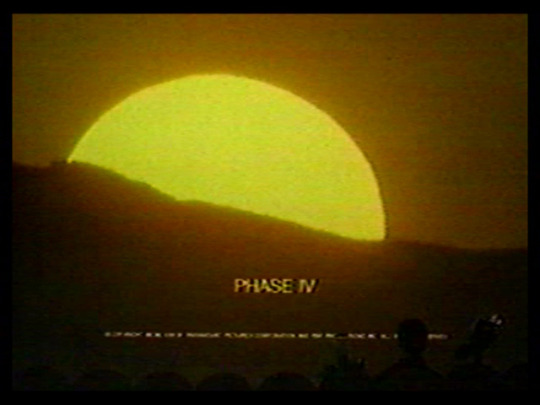
K09: Phase IV
Remember I said the movies were all coming together? Well, Phase IV is definitely a prequel to Overdrawn at the Memory Bank. Think about it – why are the people of the future nothing but replaceable cogs in a few giant companies, or colonies if you will? Why is individuality so strongly discouraged? Why does everybody hate anteaters? Because the world is ruled by ants! See? See? It's all part of one great ur-movie!
And honestly, that's as seriously as I've ever been able to take Phase IV. It's a shame, really, because despite lurid posters in which ants eat their way through a human hand, Phase IV really wants to be a serious science fiction movie. It's trying to imagine humanity confronted by an intelligence greater than ours, from the most unlikely source – man humbled before God's humblest creatures! The title apparently refers to all life on Earth eventually merging into a single super-consciousness. I can definitely see where they were trying to go. Sadly, when the journey isn't boring me to tears, it's making me giggle like a Tickle-Me Elmo doll at things that weren't supposed to be funny. Was Tickle-Me Elmo really over twenty years ago?
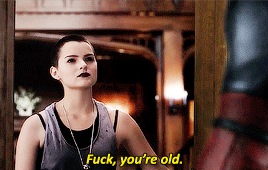
Dr. Hubbs is an entomologist studying a frighteningly intelligent multi-species ant colony in Arizona – or are the ants studying him? He calls in a cryptographer, Dr. Lesko, to help him try to communicate with the insects. For the next hour or so, the scientists do scientist stuff and the ants do ant stuff. Occasionally something happens. The ants tear a house down, and the people inside flee only to be accidentally sprayed with a massive overdose of pesticide. The scientists have praying mantises to keep the ants from getting into their little moon dome, but the ants take them out with ant assassins. Stuff like that. Eventually Hubbs dies of an ant bite, but the ants capture everybody else to do... something... to them... and then the movie's over.
For the most part Phase IV is deathly boring. We're either listening to the scientists talk about whatever, or watching ants wiggle their antennas at other ants that are never in the same shot because in the real world two different types of ants put together will either ignore or eat each other. Dr. Hubbs goes off on poetic flights about the perfection of ant society, and shows that he is the Mad Scientist of the movie by discounting the deaths of actual people. Dr. Lesko translates ant-language to come up with weird oscilloscope traces and geometric diagrams that might or might not mean anything. Desert Wildlife Stock Footage appears and there's a teenage girl named Kendra who has to hang around because going outside would mean crawly formic death. The soundtrack is kinda trippy but at the same time impossibly dull.
In fact, it's because Phase IV is dull that I often find it so funny. Since nothing much is happening, my brain wanders off on odd tangents with the sparse information the film gives me. We begin with Dr. Lesko's narration telling us that this was all caused by some kind of unspecified celestial event. Really? A conjuction of the planets created smart ants? Jupiter is in retrograde and Mercury is rising in Libra, so be conservative with your investments – and watch out, because this month's full moon is the perfect time for ants to suddenly develop a superintelligent hive mind!
Then the narration starts talking about ants 'doing things ants don't do', like holding meetings. This bodes ill for mankind, sure, but the word 'meetings' just makes me picture ants at tiny tables, sipping tiny lattes while they discuss how best to put the wasp nest under the porch out of business. Never mind that Lesko's voice is over footage of ants doing... well, exactly what ants do; grooming, fighting, and carrying stuff through tunnels. The shots cut back and forth from one ant to another of a different species in a way that suggests we're probably supposed to be imagining a dialogue between them, but there's not even any squeaking sounds dubbed in. I admit that this is realistic, because ants communicate chemically. It still looks ridiculous.
How about the bit where the ant queen (who I'm pretty sure is not played by an ant – the animal we see looks more like some kind of wasp) assimilates an insecticide, producing offspring that are immune to it? Sure, scary idea, but Dr. Hubbs intones, 'we challenge with yellow chemistry, they respond with yellow creatures'. Is that how that works? Because now I'm pondering the artistic possibilities of feeding Skittles to the ants.
Or how about when the ants decide to cook the humans in their hideaway by focusing solar radiation onto it? Revenge for all those kids with magnifying glasses, am I right? Or how Dr. Lesko blasts the tops off the ant towers to try to get a reaction? That seems a little extra, when any bored six-year-old knows much easier ways to get an ant colony moving. How about the fact that at the end everybody runs off into the desert in their bare feet when they know damned well there's seventy billion pissed-off ants out there?
The ants only get one moment in the movie that's really effective, when it does seem like there's a higher intellect at work behind these millions of mindless drones in perhaps the same sort of way as billions of neurons come together to create a conscious human brain. That's when the ants bring a sample of the yellow pesticide back to the hill for their queen to examine. One ant carries this as far as it can before the poison kills it, then another one picks it up and does the same. Individual ants are expendable. There are just so damn many of them that it makes no difference, and the colony can always produce more to replace what has been lost. This uses what makes ants scary even when they're not superintelligent, along with reminding us that their purpose here is to study our weapons and learn to neutralize them.
The dead ants laid out in rows like the aftermath of a battle is also sort of cool, but it has the opposite effect, actually humanizing the ants by depicting them as individual lost lives. Hubbs has already explained to us that's not how ants work, and if ants are individuals who care enough to gather up their dead colony-mates, they become a lot less alien and therefore a lot less frightening.
The behaviour of the ants also suffers from the same problem as a lot of killer animal movies, in which their intelligence seems to have come with a few lessons in electrical engineering. Intelligence does not automatically confer knowledge – INT is a stat, while knowledge is a skill! Humans have sophisticated brains, but much of what we do with them depends upon thousands of years of accumulated learning. Before we could build a generator, we needed at least a primitive understanding of the physics of electricity. It is true that destroying a generator is simpler than inventing it, but how did the ants even know what the significance of the generator was? How did they know what the air conditioner was, never mind how to shut it down? These ants have been sentient for a couple of months at best, and during that time they seem to have been too busy building towers and exterminating their predators (things that actually seem like pretty plausible ant priorities) to go to trade school.
These are all quibbles, though. The biggest problem with Phase IV is that it raises a lot of questions and then never bothers to even try answering them. Dr. Lesko makes some progress at communicating with the ants, and the fact that the ants bother to listen and reply suggests that they do want something from these humans... but what? Hubbs dies of the ant venom, but Lesko and Kendra are captured and taken inside an enormous ant hill, where the ants begin doing something to them that seems poised to begin a real dialogue. In the final moments of the movie we're on the verge of finding out what's really been going on... and then it just ends.
So what was all that leading up to? We don't know! And Lesko's final words of narration, we didn't know for what purpose, but we knew we would be told, just seem to rub the anticlimax in our faces – he found out, but we never will! I'm left with the impression that writer Mayo Simon didn't have any real idea, himself. I guess the point is supposed to be that the ants are such a completely alien mind that Lesko probably couldn't explain it to us if he wanted to. Fair enough, but still a lousy non-ending to a boring eighty-four minute movie.
All this movie needed was a conclusion. Not even a conclusion to the overall 'smart ants take over the world' thing, just a conclusion to the 'kidnap Lesko and Kendra and make them members of the hive' thing. Are the ants after human knowledge? Do they need human emmissaries? Human spies? Human slaves? Humans to play the slots in Vegas while the ants manipulate the machines to pay out big wins? A fertile couple to be the progenitors of a new race of Ant-People? See, there I go again, off on tangents trying to supply the entertainment this movie so conspicuously failed to give me.
There are people who really like this movie. El Santo of 1000 Misspent Hours says it's one of his favourites, because it makes him think. It made me think, too, but about all the wrong things.
24 notes
·
View notes
Text
Brace yourselves A very long essay (like, a thesis) on the British class system with references to Harry Potter Part 1
OK, I did this already. It’s long, but stick with it anyway. And watch the videos.
In Britain, people are broadly split into 3 social groups: working-class, middle-class and upper-class. The factors which determine which class you belong to are varied and complex, but in a nutshell include: how wealthy you are, where you live (location and type of dwelling), what variety of English you speak (or whether you speak English), what level of education you have, what you do for a job, what you do in your free-time, who you are friends with, what you like and dislike, your political views and affiliation, the nature and number of the opportunities you have in life and, in some ways the most important of all, which family you belong to, how far you can trace your ancestors back through history and what those ancestors did and who they were.
Although people who fall into the following categories are often working-class because our society, like any other country’s, is still trying to eradicate prejudice, these categories are not factors in and of themselves: race, nationality, religion, disabilities, gender and sexuality.
It is not the case that people’s class is constantly mentioned or even at the forefront of one’s mind, nor does it harmfully imply natural divide in the way that, for example, the caste system in India does. Class is subtle, nuanced, exists unchallenged and often doesn’t occur to you as the cause of a problem unless you really go looking deeply for it. It is undoubtedly damaging, however. Your class determines your path in life. It determines where you will live, how much money you will have, what education you will be able to access, what job you will be able to do, who you will be able to socialise and have relationships with and what opportunities you will have access to.
It is impossible to outline concisely but accurately exactly what sort of person is in which class. I will aim to do my best here, with references to Harry Potter, since I want fans who aren’t British to be able to understand these nuanced class subtleties better.
A very crude, basic description is that working-class people do “unskilled” jobs, usually for minimum wage and earn just money enough to exist; middle-class people have professional jobs, an education higher than secondary school and earn enough money to live comfortably and buy things they want as well as things they need; upper-class people belong to certain families who can trace their ancestry back a long way and are usually very wealthy and often related to the royal family. Their lifestyles are often funded by taxpayers’ money.
An overview
It is already complex enough, but it gets even more murky. For one thing, there are layers within the classes. You can be lower or higher within your class and the terms “lower middle-class” and “upper middle-class” are very common. Where you come on these inter-class continuums affects your life just as much as which class you are in.
Secondly, there are also two distinct groups who don’t fit in to the three classes. 1) very wealthy people, usually celebrities, who are super-rich but come from lower class backgrounds. A great example of this is the Beckhams. They are so rich from his football career and her music career that he had his wages paid directly to charity in the latter half of his career. They live lavishly, spend a fortune on designer clothes and their wedding was an imitation of a royal wedding. However, they spent years being mocked for seeming stupid and uncouth and it was all because of one thing: how they sound. As soon as they speak, you can hear that they started life near the bottom of the social ladder. I will do a separate post about language and voice at some point. Here’s a clip from an impressions show.
youtube
2) an “under-class” who lives on state welfare benefits and doesn’t work. These people tend to not have enough money for their needs and their chances and aspirations in life are extremely limited. People in this category range from those unable to work through disability to drug addicts to genuinely unpleasant people who would rather take hand-outs from the government than contribute to society. The right-wing media portrays them as lazy, worthless and a blight; the left-wing media portrays them as misrepresented people who have been failed by society. The truth is in the middle.
Thirdly, unlike upper-class, what constitutes “working-class” and “middle-class” are not fixed concepts. Rather, they are in a state of constant flux and progression. What those terms meant when I was a child and Harry Potter was being written are not the same as they mean now, nor were they the same as when my parents or grandparents were children. It changes slightly with every generation. Nowadays, the middle-class is much bigger than it was then. Efforts have been made to get working-class children to go to university and some do, meaning that more people are moving into the middle-class. We are more aware of class prejudice than we used to be and many people do try to avoid it, therefore options have opened up for working-class people and allowed them to access things they couldn’t before. The technological revolution has made a huge difference. The internet allows people to travel everywhere and find anything from their own sitting room and has given some people aspirations they wouldn’t have had before.
Conversely, the definitions of ‘working-class’ have broadened. Many people now consider themselves working-class when, in my parents’ youth, they would have been middle-class due to the house or street they lived in or the fact that they manage to go on holiday every year. The two lower classes are definitely more mixed than before and the lines between them are blurring. I guarantee someone younger than me will read this and think “I consider myself working-class but I have never had any of the experiences OP describes”. Another thing which has made a huge difference is the collapse of British industry. In the 80s and 90s, the majority of the working-class worked in factories or similar industrial businesses. Then the powers that be closed them all and sold production to firms abroad who could make things more cheaply, and unemployment boomed. Literally, cities just died. Some people eventually got different jobs, though jobs where their skills were undervalued, and which alienated them from their work value. Many people didn’t. Many people had to live off state welfare benefits, which were not adequate and somehow out of that, that “under-class” I mentioned was born. Many of the people who choose to live off the state are people whose families lost their livelihoods at that time and ended up broken; just gave up.
Linked to that, another factor which makes it all quite complex is pride. Those people (the film The Full Monty is all about this btw) were proud of what they did with their skills and then they were just thrown away like they were nothing. They lost their pride and many never got it back. Working-class people, in particular, tend to be fiercely proud of being working-class. I won’t comment on the psychology of that here, but to illustrate: my husband won’t have it that he is middle-class now. He is. His argument is that he has to work, but that’s a huge over-simplification of what “working-class” means. He can afford holidays abroad and organic food, he lives in a detached house in the countryside, he owns 3 houses which he rents out to tenants (and they are kept to a very high standard). He is without a doubt middle-class. A teacher at school once claimed he was working-class for the same reason, and a lecturer at university did, but it represents a fundamental misunderstanding of what it really means to be working-class. There’s a good book about going back to your roots called Pies and Prejudice by the radio DJ Stuart Maconie, who is northern working-class originally but now lives a privileged life in London. He was inspired to write it when he had a friend over for lunch one day and they asked where the sun-dried tomatoes were, and he replied that they were by the cappuccino maker. Such ludicrously posh items made him stop in his tracks and think “what the hell has happened to me?”

Lastly, it is possible to move both within your class and to another class. This is called social mobility. I, for example, grew up almost at the bottom of the working-class. I lived in a very deprived area, had few opportunities and my family had only just enough money to subsist. I am now technically lower middle-class. I now live in a detached house in a sought-after village, I do a professional job, I have enough money to buy more things than just those I need and I am educated to postgraduate level. However, moving up a class is extremely difficult and many people never manage it. Those who do always carry markers of not quite fully belonging there, such as accent, vocabulary, etiquette etc. I have managed it, in short, because I am intelligent enough to have won scholarships for university, because my immediate family are also intelligent and exposed me, as much as possible, to other cultures, and because I married a builder whose parents had moved up the social ladder a little and gave him some land to build a house on. It is mostly down to luck and chance.
Sometimes people are very sensitive about their class and worry about it; sometimes British people themselves are not fully aware of it all. Such people are usually (and this is not meant nastily): middle-class from birth, therefore comfortable enough not to have thought much about it, or younger than early 20s, therefore they haven’t experienced and analysed hindrances arising from their class or had a university education where they would learn more about it. Very young people might have even more trouble getting their heads around it because of sheer lack of world experience and the modern world: it’s not quite the same as it used to be since the internet took over, since that brings opportunities to everyone that lower-class people might not have had before the turn of the century.
The reasons for class and the role of history
The reasons why this class system exists are even more complex. Keeping it brief, there are two key factors. 1. to maintain power for a privileged few and ensure the populace doesn’t try to take that power (people are too busy, pre-occupied and uneducated to challenge it). 2. historical influence: we used to have a feudal system where serfs worked the land for rich land-owners in exchange for living on it. During the Industrial Revolution some people managed to gain capital and power through production and factory ownership. They became the middle-class. This has evolved into what we have today.
The importance of the influence of the feudal system cannot be overstated if people are to grasp why race isn’t as critical a social issue here as it is in the USA. The USA is still recovering from Slavery, by which I mean the historical, slave trade triangle event, not the concept of enslavement. A major part of that country’s history is brutally, sickeningly forcing people who aren’t white to do the manual toil on US shores that kept privileged people in their positions of power. Racism and racist slurs equate to supporting slavery. Britain has a different history. Whilst we played an awful role in the slave trade, we didn’t have slave plantations on our shores. It wasn’t coloured people who did the toil. It was the working-class. For centuries the working-class were forced, at times with as much violence and as little food and rest as African slaves endured in the Americas, to do back-breaking work all day without a break, simply to have a place to shelter and some food. Under the feudal system this meant in the fields and during the Industrial Revolution it meant in dirty, dangerous factories. The working-class was, and to some extent still is, enslaved. That doesn’t mean that racism doesn’t exist here or that it’s not despicable. It does and is. But it doesn’t have the same connotations. Slurs about class, however, DO have those connotations. Here, making nasty comments about, or looking down your nose at, working-class people equates to supporting slavery, albeit more subtly than racism equates to supporting slavery in the US. Disparaging comments about the working-class are a bit like, for example, calling a black man “boy” in the US. But because a) it is more subtle and b) much longer has passed since we had the feudal system and the Industrial Revolution than has passed since America had slavery, class slurs in Britain are less emotive, emotionally-charged and offensive than racial slurs in America.
What makes you upper-class?
I mentioned that ancestry plays a huge role in determining class. I also mentioned that there is social mobility (moving up to a higher class or even down to a lower one). There are certain families who can trace their ancestry back centuries and are descended from royals and rich land-owners. That means that certain surnames and bloodlines are prestigious. These people form the upper-class.
It is very unusual for upper-class people to mix with working or middle-class people. I, for example, have only met one upper-class person in my life. They go to different schools from the rest of us and do different things socially. For this reason, upper-class people tend to marry other upper-class people, in fact most would frown upon anyone who did otherwise. Because it’s all about family status, marriage would be the only real way you could move up to upper-class, but it’s practically unheard of. You are born into the upper-class. If you inherit the surname, you inherit the status that goes with it, regardless of any other factors. For this reason, upper-class families tend to be ‘pure’. Here is a newspaper article illustrating my point. The comments are also interesting. It’s from a popular right-wing paper.
http://www.dailymail.co.uk/sciencetech/article-2838183/How-having-right-surname-sets-LIFE-ancestors-social-status-determines-rich-ll-study-claims.html
Another illustration: when Prince William married Kate Middleton, whose family are crazily rich, the media and nation went into a frenzy over the fact that he was marrying “a commoner”. They used that exact word. Kate’s family became wealthy during the Industrial Revolution and she, her siblings, her father, grandfather and great-grandfather all attended expensive, prestigious public schools. Her family is incredibly wealthy, has the best opportunities available and were friends of the royals for decades before she met William. Nevertheless it was huge news for her to marry William. Why? Because she wasn’t upper-class. Despite the privileged life she led, despite her family’s centuries of wealth, she didn’t have the name or the blood to be considered upper-class. It all comes down to family status. In crude terms, William married below him, and they were very lucky that it wasn’t a scandal. Some people were offended by it, in fact. Remember that in the 1930s Edward VIII had to abdicate in order to marry “a commoner”. To most people “a commoner” is someone normal, but here it is someone who doesn’t have the name or blood of a small, select group of families. It’s also interesting to note that she is rarely called ‘Kate’ by the media since joining the upper-class, but rather her full name ‘Kathrine’.
Two things out of this: firstly, don’t fall into the trap of assuming being upper-class doesn’t affect your life negatively. The lower-classes have worse struggles, but it would be wrong not to appreciate the difficulties associated with being upper-class. The expectations of you, the responsibility you have to your name, limitations on who you are allowed to socialise with and love, constant media and public attention and pressure to be someone important. It is exactly these issues which led Prince Harry to have a troubled youth.
Secondly, it is because of all this that many people feel it is incorrect to view death eaters in Harry Potter as a metaphor for Nazis. They are really a metaphor for the ‘pure-blood’ upper-class families. They do not round people up and exterminate them. They use power and influence to gain more power and to subjugate those they see as inferior because they do not share their names or blood. They do not base their ideologies on pseudoscientific claims about appearance, like phrenology. They base it on inherited blood. To highlight the fact of the class metaphor even further – there is a way to become effectively upper-class without being born or married into it. It is a lesser upper-class, because you don’t have the family name or blood, but you still become a de facto nobleman. The way is to become a Lord. You can google how to do it in the real world if you’re interested, but clearly the key point is that Tom Riddle’s adoption of the title Lord represents the change in his class. He does it because he knows he has upper-class blood but can’t prove it, so he has to indicate his status another way.
Why is Harry Potter about class?
The three blood statuses of wizards equate to the three classes: muggle born = lowest-class (working-class in the real world), half-blood = middle-class and pure-blood = upper-class.
It is because of this that the word “mudblood” is not the slur many people take it to be. It is not the wizarding version of the N word. It is not as offensive as that. It is offensive, yes, but it is not an unforgivable utterance which betrays inherent racism. The fact that the characters are prepared to repeat it when reporting it has been said shows that it is not comparable. I can’t even think the N word. If I think about it I don’t say it, in my mind I literally say “the N word”. Both characters and fans are prepared to say “mudblood”. It is not the same.
The fact that Voldemort and Snape are high-ranking death eaters also proves the story is not a metaphor for racial aggression: they are half-bloods and Snape comes from a working-class background and yet they have moved from their groups to be prominent members of the highest group. They have moved from lower classes to upper classes. It hasn’t happened by marriage like in the real world and it was very difficult – they had to be great wizards to manage it. But they did manage it. It is not possible to change your race, but you can change your class. Therefore, the wizarding war is a metaphor for class struggles not racial struggles, therefore “mudblood” is a nasty way of saying “commoner”. If you have dirty blood you aren’t part of the pure, select group. You don’t belong to the wizard upper-class. People shouldn’t say “mudblood” because it implies inferiority and enslavement, but if you do say it you are not racist, it isn’t the same as being racist, and isn’t as offensive or as unforgivable. It’s only slightly more offensive than saying “chav” or “ned” in a nasty tone of voice.
So it would be great if people could stop calling Snape a racist based on him saying “mudblood” one time as a teenager under extreme stress.
This all also explains why joining the death eaters was attractive to half-blood, working-class Snape in his youth and why JKR said he did it because he thought it would give him power and impress Lily. Those people who are confused because Lily wouldn’t be impressed by his joining the wizard Nazis – this is the answer. It’s because he wasn’t joining the wizard Nazis, he was joining the wizard upper-class.
Real class-based insults
A quick note on terminology – “chav”, or “ned” in Scotland, means a similar thing to “white trash”, but anyone can be a chav/ned, regardless of skin colour. The opposite of that insult is “toff”, which means upper-class and posh, but it’s negative. Here’s a picture of fictional chavs from the comedy TV series Little Britain.
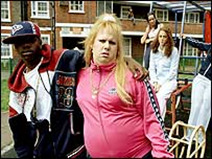
Here are some comedy clips of some chavs interacting with the higher classes. You might not make all of it out, especially if English isn’t your first language, because working-class people generally speak with strong regional accents and use dialects (this couple are from London). You will probably notice though, bits where you can understand it much better – that’s because they are switching into “proper English”, or their version of it.
These vocab tips might help you out:
‘to have it off’ means to ‘to have sex’ as well as simply turning something off
‘winalot’ is a dog food brand; ‘camelot’ is the national lottery organisation
‘giro’ means welfare cheque
youtube
youtube
Education and class
In general, working-class people go to state-maintained schools. These vary enormously in quality, mostly in terms of what resources and spaces can be bought and built for the budget the government gives them. Middle-class people normally go to these schools too, though a substantial number go to grammar schools, which are state schools that you have to pass a test to go to when you are 10/11, or private schools, which are schools independent of the state which charge fees and can be boarding schools. Both of these have good sites and resources and get good results.
Upper-middle class and upper-class people go to public schools, which is another level of private school. They are incredibly expensive, very old, boarding schools which select students based on who they are, as in, what family they belong to, and how much money they have. Teaching and the content of lessons is similar across all three types of schools; the difference is in funding – what the school can afford to offer in terms of books, experiences, classrooms, class sizes etc. Having a public school on your CV basically guarantees you entry to any university.
Private and public schools get good exam results because of their facilities and the fact that the students’ families are educated and encourage (or pressure) them to achieve highly. State secondary schools get mixed results because their facilities and resources are not adequate and many working-class families don’t value academic achievement, so don’t encourage it. A lot of students are unable to cope with the level of critical analysis required to succeed at A-Level (qualification at 18 years old) because independent thinking and reading non-fiction hasn’t been encouraged at home. I left school without finishing my A-Levels because I found that too difficult and had to build up my abilities gradually until I was able to handle that level.
The top universities now have to release data showing they are trying to admit students from working-class backgrounds, but nevertheless attendance by working-class kids at top universities like Oxford and Cambridge is low, because those universities demand things working-class kids don’t have: varied extra-curricular activities, the ability to pass an entrance exam, a proven track record of independent enquiry, enough money to pay double the fees most universities charge, the etiquette (e.g. dining manners) required to interact with all the upper-class kids etc. This is a poor state of affairs and denies working-class students access to ground-breaking research and thinkers. The bigger issue, however, is that it keeps them away from power. All the influential people: politicians, big businessmen, investors, lawyers etc, go to the same few universities. They meet there, get to know each other through secretive clubs (google the Bullingdon Club for more info) and this enables them to network and make contacts, which they use later in life. Working-class people never get those contacts, therefore find it almost impossible to get any power.
To demonstrate the prejudice, an anecdote:
My friend Claire is middle-class and went to a grammar school. She got As in her A-Levels and went to Cambridge University. On the first day she met the people who would be on her course as well. Every single one of them had gone to private or public school. When she told them which school she had come from, they said, with what they believed was genuine praise and kindness, “wow, you’ve done really well to manage to get As and get into Cambridge considering where you’ve come from”. She isn’t even working-class. She had led a pretty privileged life. Yet they were astounded and condescending towards her. They viewed her achievement of coming from a middle-class grammar school with good exam results the way many of us view Malala’s success and entrance to university after her experiences in the Swat Valley. They were, like many people of that class, totally disconnected from popular reality.
This leads me to the defence of another Slytherin: Slughorn. Some people view him as racist because of his comment that Lily’s academic success was even more impressive since she was a muggle-born. As I have shown already, blood status in HP is a metaphor for class struggles not for racial tensions, so it is not correct that he is racist. In fact, he was doing what those people on Claire’s course were doing: expressing shock that someone from the (wizard) working-class could achieve so highly in academia. It’s inherent prejudice, it’s patronising, yes. But it’s not racist, and it is even well-intentioned.
Another point to mention here is access to knowledge outside the content of lessons. That has improved a lot with the internet, but still, access to books is limited. A few years ago the government started talking about closing some libraries and it caused an uproar. Without libraries, most working-class people would have very limited access to books. It is yet another case of failing to understand that most people do not have the privileges they do, as well as desiring to limit the extent to which the working-class can get an education, so as to keep them in their place.
Personal hygiene and class
This issue is very close to my heart because as a child I had very poor personal hygiene and I was bullied terribly for it. It is not a nice thing to have to admit, but some working-class people don’t have brilliant personal hygiene. It isn’t unusual for very low-class people to smell, have bad teeth, not change their clothes regularly, rarely change their bed sheets and not to wash every day. To take myself as an example first, when I was little I was not bathed regularly, nor was I made to clean my teeth. I hate saying this, because I know it’s horrible, and believe me I am OCD with washing now, but when I was a child I went weeks without a bath or a change of clothes. We didn’t have a shower. It was neglect, there’s no way around it. However, it wasn’t malicious. In my parents’ generation and before them, it was normal not to wash very often if you were working-class. These days, hygiene practises amongst the working-class are much much better, but even still you do even now get smelly, dirty people.
It wasn’t just me. In my year (grade) alone at secondary school there were three students who were showered at school by the matron (in a kind way) because they didn’t wash at home.
Why? Well obviously that is complex, but I’ll try to explain. It is absolutely linked to being working-class. For a start, facilities were a problem because of poverty. When I was born (1985) we didn’t have a bath or shower, our bathroom was just a toilet. We also didn’t have a washing machine. We just couldn’t afford those things. To use a bath we had to go to my grandparents’ house. When I was a few years old we got a tin bath, which is like an unconnected bathtub that you fill with jugs. We didn’t have much money for water and soap though so use of it was limited. My mother washed clothes in it as well by hand. When I was around 5 or 6 we got a proper bath. However, our house was so cold that it was physically painful to use it. We didn’t have any heating except for an open fire in the living room and this was the north of England I’m talking about. In winter the bed sheets got damp from the cold. When we had the tin bath you could put it in front of the fire, but the plumbed in bath was upstairs in a bathroom. My dad braved it more often than my mum, and since I was little I didn’t bath myself. Those three students that got showered at school I mentioned did so because even by the late 90s, they still didn’t have a bath or shower at home.
Another reason is lack of education. People just aren’t taught about personal hygiene at school, so if they don’t already know at home you won’t find out either.
On top of that, many working-class people are too busy or pre-occupied to remember about or find time for things like washing. They work long hours, often multiple jobs, and when you aren’t sure if you’ve got enough money to eat, getting washed just doesn’t seem that important.
Another factor is depression. Living in poverty, working hard just to survive, knowing you have little opportunity in life creates depression. Depressed people can lose interest in things like personal hygiene.
Not washing is so ingrained in working-class history that the phrase “the great unwashed”, originally a term used by Victorian authors, is now a reasonably common way of referring to the masses. It is used both derogatorily and ironically:
https://www.collinsdictionary.com/dictionary/english/the-great-unwashed
I was bullied terribly, especially at primary school, for being smelly and dirty. It was constant, day in, day out, and is definitely the reason I am now over-the-top in cleanliness. One of the main things people made fun of was my hair. I was bullied for having greasy hair to the extent that, on a school trip where we were staying overnight, 2 girls that I was forced to share a room with, having tortured me for hours, including ruining my shoes, said they would stop it if I washed my hair.
I understand that some people say cruel things when they are young, but the fact remains that if you choose to make fun of someone because they are dirty or greasy or smelly, you are actually making fun of them for being poor, not having basic facilities at home, not having been taught proper personal hygiene because their parents didn’t know or were too busy or depressed. You are behaving like you are socially superior to them.
This is obviously the main reason why I love Snape. I immediately saw myself in him, and every time someone mentions his greasy hair it alludes to his working-class childhood. When he joined the death eaters he moved up the ladder, but the disadvantaged start he had in life is still written all over him. It is also why I love Slytherin – the house is populated mostly by pure-bloods, or in other words by upper-class people, and yet they embrace him and allow him social mobility anyway. They looked at him and saw something other than his class.
It’s not just about wealth
Since membership of the upper-class is brought about through ancestry, it is possible to be upper-class and not rich. Most upper-class people are descended from rich people and have inherited wealth alongside their name and blood, but occasionally there’s a family whose ancestors lost most of the money, so they are left with just a title and the estate (house and land). It costs a lot of money to run an upper-class house because they are invariably old, listed, castle-y buildings in the countryside. That means they are big and cold and cost a fortune to heat. Stuff breaks or wears out so the maintenance costs a fortune as well. They might be so big that they need staff as it’s too much for just the family to keep on top of, so there are wages to pay too. On top of that, they try to live an upper-class lifestyle to keep up appearances, which is very expensive. A good few years ago now there was a documentary called The Fucking Fulfords, about an upper-class family who couldn’t afford their lifestyle or house and swore all the time. Even though they weren’t wealthy they didn’t get jobs, largely because they had been brought up to believe it was beneath them, and as a result they are lazy fucks. It’s on youtube if you want to watch it.
youtube
Lazy is not the only stereotype of the upper-class. There are quite a few, all based in fact, such as that they are eccentric and strange. Fulford is definitely that. Another is that they are stupid. Since they don’t understand life in the same way as regular people, because they don’t have jobs, some things they don’t know are astonishing. There was a reality TV series years ago where this entitled, upper-class girl did working-class, minimum wage jobs, and it was painful to watch. She didn’t know how to do basic tasks like make a cup of tea, because she never did anything for herself at home. She didn’t know what a gas bill was. A lot of these people barely wipe their own arses so it’s no wonder they appear incapable. The Monty Python sketch “twit of the year” utilises that stereotype to make fun of the upper-class. It also pokes fun at the stereotype of having ridiculous multiple-barrelled surnames. My husband does building work for an upper-class family occasionally and the woman’s surname is Booth-Clibburn-Shimmins. The Pythons are doing that thing with their faces because yet another stereotype is that upper-class people talk weird.
youtube
#Harry Potter#british class system#BRITISH SCHOOLS#British history#britain vs america#class in harry potter#slytherin#snapedom#@deathdaydungeon
38 notes
·
View notes
Text
Five live-action female superheroes most fans haven’t heard of... #4: Andro Kamen (好き! すき!! 魔女先生)

It may seem surprising, but perhaps the first superheroine character to get her own television show didn't appear in comicbook-mad America, or even in the superheroine-obsessed Philippines. Nope! Before the likes of Jaime Sommers, Diana Prince, and Narda strutted their stuff on the small screen, it seems that tv had already acquired its first show centred around a female superhero, and she hailed from a country that had a global reputation of being culturally somewhat small-C conservative...
Japan..!

Long before the modern day Power Rangers, Japanese women were transforming into costume to battle outlandish foes with a mixture of martial arts, and impossibly high aerial somersaults filmed from low angles. Back in 1972 a heroine by the name of Andro Kamen (aka Andro Mask) had the distinction of being the first female superhero on Japanese tv -- and very possibly the first superwoman in the world to head her own show. That show was entitled "Suki! Suki!! Majou Sensei", or "We Love You! We Love You!! Witch Teacher" to give it its English translated title, and it starred Yōko Kiku (菊容子) as its protagonist.

The show focused on Hikaru Tsuki, an alien undercover agent from a far off galaxy who comes to Earth on an intelligence gathering mission. She adopts the everyday identity of a school teacher, and throughout the first thirteen episodes (starting in 1971) she merely used her superpowers surreptitiously to help her friends and students. But at the start of the second block of thirteen episodes Hikaru is promoted from undercover agent to fully fledged galactic law-enforcement officer, entitling her to a snazzy new costume so that she can use her powers openly without risking her secret identity.

The retooled show introduced more monsters -- and therefore more fight sequences -- making its formula very close to the Sentai shows (aka Power Rangers) that would eventually grow in global popularity throughout the 1980s.
At its heart the show was always concious of its younger audience, as demonstrated by Hikaru's sidekick being a goofy monster and her fellow teachers being a slightly inept and zany bunch, but the show was never afraid to borrow from dark realms of screen horror too. Dark and menacing locations abound, and both Hikaru and her Andro Kamen alter ego frequently find themselves in terrifying situations.

Although looking rather dated now, what makes this show so special today is the performance of its leading lady. Yōko Kiku handles every part of the show’s comedy/suspense/action format well, and brings a real tenderness and charisma to the role that is hard not to love. Tragically she apparently didn’t live long past the end of the series. Internet sources suggest that in 1975 Yōko suffered a bout of depression, possibly triggered by acts of betrayal by her unfaithful fiancé, and on the second attempt she finally succeeded in taking her own life, aged just 24.
No matter what the truth of her death, Yōko left behind a small but important milestone in the history of women in television science fiction and fantasy. Next time you watch Lynda Carter as Wonder Woman, or Marian Rivera as Darna, just remember that Yōko Kiku got there first..!

#superhero#sentai#japan#superheroine#tokusatsu#tv#heroine#toei#magical girl#teacher#comics#comicbook
6 notes
·
View notes
Text
Illuminated
Genre: Fan Fiction (Divergent) Pairing: Eric x OFC Warnings: Adult themes Rating: Mature Disclaimer: This a strict work of fiction, I own nothing except the original characters and the plot line.
A/N: This is based on a request I received from @murmelinchen on my old blog @feminamortem that I can’t repost since I deleted it like a douche. The prompt was a one-shot of Eric and reader/OFC going on a moonlit walk. Here you go.
(I also apologize for not remembering who asked to be tagged in this besides @thihaf. Don’t let me do anything stupid like delete a blog again.)
Eric blindly paced back and forth through his living room, his fingers alternating between pinching the bridge of his nose and raking his usually impeccably styled hair into manic spikes. The relentless buzzing of the usual gathering of Dauntless in the Pit was pummeling his ears like a bass drum, making it impossible to think, so he’d fled to his apartment to clear his head, where the oppressive silence seemed to convolute his thoughts even further.
Typically on Thursdays she’d meet him at his apartment after her shift at one of Dauntless’s many tattoo parlors for their semi-weekly fuck; they were in mutual agreement that neither was looking for anything resembling a relationship, and the arrangement was uncomplicated and comfortable. They rarely wavered from this routine, and if one or the other couldn’t make it, they’d gotten to the point in their ‘liaison’ where they would at least do the other the courtesy of letting them know. So when she hadn’t shown up at the usual designated time without so much as a text, he knew something was amiss and headed straight for the parlor. Lucas, the one who handled piercings, was there alone, breaking down her station. His visage turned into one of dread as Eric, visibly upset, demanded, “Where is she?”
Lucas shrugged his shoulders, continuing when Eric’s glare intensified, “I really don’t know. She seemed kind of off all night, like real agitated, and when I asked her what was wrong she said she wasn’t feeling well. So I said I’d clean up here when we were done and as soon as she finished up her last client about an hour ago she practically bolted out of here. Maybe try the infirmary?”
Eric was surprised to find his annoyance had become tinged with worry. As he made the trek towards the infirmary, he became even more unsettled by the foreignness of such a feeling as concern for another person’s well-being. As he neared the hallway leading to the clinic he caught the sound of two voices speaking in hushed but frantic tones, one of which he recognized as hers, holding a conversation that was most likely not intended to be overheard. He halted abruptly before he rounded the corner and held back out of sight, holding his breath and listening intently.
“How could I have been so stupid?” She spoke lowly, but the alarm and anger in her voice was still evident. “Thinking it’s nothing but a touch of the flu. This honestly never even crossed my mind, not once. I thought we were being careful, I really did. But obviously not enough!” Eric chanced a peek around the corner and saw her slumped against the wall, one hand clutching a small paper bag, the other pressed against her forehead, before retreating back into the shadows. “I can’t even process this, Gina. What in the fuck am I going to do? Do I even tell him? How do you tell Eric of all people something like this?”
He heard the other girl exhale loudly and pause before replying, “Don’t panic. It won’t do you any good, what’s done is done. And maybe you don’t have to tell him, at least not yet.”
“Are you kidding me? This isn’t exactly something I’ll be able to hide! He’s going to find out eventually. And no matter how this plays out, he should know, he needs to take responsibility! I...Gina,” she whispered, as her voice began to break, “my entire life has literally just been ruined. This changes everything.”
Eric felt paralyzed as he attempted to digest this exchange. He was overwhelmed by a sudden feeling of suffocation, of being trapped inside a bubble where the oxygen was growing short in supply and his surroundings were muted and distorted. His brain moved in hitches and spurts as he pieced their mutterings together.
“...a touch of the flu…thought we were being careful…what’s done is done…has to take responsibility…”
She was pregnant. And it was his.
A cold sweat sprang up through his pores as this fact clicked into place, and Eric went into panic mode. He had to get out of there. He needed time to think before she confronted him, and he was in no way fit to feign ignorance for her.
So here he was, making a blind trek through the landscape of his apartment, replaying the illicit dialogue over and over in his mind, attempting to catalogue his many reactions. Eric did hail from Erudite, and his position as a leader was not entirely ill-gotten; so despite a rather conflagrant temper, the union of his natural intelligence and militaristic conditioning had produced an ability to maintain logic, composure, and clarity in the most disastrous situations. Without actual conscious, choreographed thought, his brain began to disentangle the threads of the situation with the detached yet swiftly calculating adroitness of a born strategist. He’d knocked her up. While he could cling desperately to the hope that it wasn’t his, he had little reason to doubt that it was, so he wasted no time in entertaining that romantic notion and instead simply accepted it as an unassailable fact. One that needed immediate damage control, the top priority of which was unquestionably self-preservation.
While they had never discussed such a hypothetical, he believed he knew her well enough by now to confidently predict that she would not have an abortion, and besides, he operated by the creed of, “Hope for the best, but plan for the worst.” His first concern: how would the berth of fatherhood affect his leadership position? There were no rules in place regarding marital or dependent status, so there was no immediate threat to his career per se, but the burden that having a family would place on his time would undoubtedly skyrocket his already considerable stress level. Eric prided himself on prevailing over adversity, so while this was not exactly a challenge he would have sought out, he had no fear of this thwarting his ambitions. But on the personal level? A family would end life as he knew it. He’d never had to be accountable to anyone, never been in a committed relationship so never had any qualms about sleeping around. Never anyone besides Number One to look out for, never anyone for Eric to take care of besides Eric. A family would mean a practical and emotional onus unprecedented for him, and the question wasn’t whether he could be ready for such a thing, because there was no question about it - this was happening, he had to be. The question was just how miserable the rest of his entire fucking life was going to be. And that’s when it hit him.
Or rather, didn’t hit him, because the waves of anger and petulance and despair he expected to flood him never came. There was no outrage over the end of his old life. There was apprehension, there was fear, but could that really just be how his ingrained personality was translating...excitement? Optimism? At what he realized he was beginning to see as the onset of his new life?
True to his nature, resoluteness took hold quickly as he vowed to, at the very least, give this whole thing a shot. He was, after all, brave; he was Dauntless.
***
“Take a walk with me.”
“A walk? Where?” A bemused expression crossed her features before turning to one of trepidation.
“Navy Pier. For once it’s not hot as fuck in August, I think we should get out.” Eric looked at her almost beseechingly, which only made her warier. While his proposition was, as always, a command rather than a request, the uncertain and hopeful expression that accompanied it was altogether alien for him.
She paused briefly as she considered the opportunity this might afford her. He seemed to be in a pleasant mood, which could lend her an advantage in this situation. This nighttime excursion out of the compound also lent them the privacy she hoped for when she broke the news. She quickly changed her countenance to one of eagerness.
“Alright. Ready whenever you are.”
It was a rare evening on which Eric was not burdened with any extraneous leadership duties, so they set off immediately without him having to clear his schedule with any of his fellow leaders or his own assistant. They exited the compound unbothered through the seldom-used maintenance doors at the east end, leading to a path too narrow to accommodate vehicles, therefore of little use to anyone coming or going from the premises, Dauntless or otherwise.
Eric was right; the typical late summer humidity was absent from the night air, and a gentle breeze whispered against their skin like silk. Eric felt his conviction oddly fortified by the balmy weather as they started side by side down the pathway, a restive electricity seeming to pass between them. The moon was full that evening, a coin of iridescent silver that illuminated the unobstructed trail before them but whose light stopped short at the trees on either side of them, creating an atmosphere that was intimate rather than grim. The walk to the pier was short, but he didn’t want to wait until they reached their destination to broach the subject of their relationship; he would be fooling himself if he said he was entirely undaunted by the prospect of voicing and therefore solidifying his new receptiveness to the idea of commitment, but knew that every second he waited was cowardice on his part. He cast a sidelong glance at her and took a deep breath.
“Look, I know we’ve called what’s between us casual these past few months, but I think we’ve lied to ourselves long enough, don’t you?”
She turned to him with a look of genuine shock over what he assumed was his defiance of her assumption that she was a temporary toy to him.
“What are you saying, Eric?”
He tentatively took her hand in his, his gaze on her this time remaining steady. “I’m saying, we both know there’s something more there. Something worth pursuing. I’m saying I want us to be exclusive. I want there to be a future for us.”
Now she seemed positively aghast. A silence hung between them as they reached the ferris wheel, and he pulled her toward the steel supports that formed a rudimentary ladder along its sides. The moonlight glinted softly off of the metal, but their surroundings were mostly dark, throwing the nearby lights of Erudite into a relief that looked almost like stars, blazing brightly before they extinguished for all time. “Come to the top with me. The view will be worth it.”
He didn’t see the whirlwind of emotions that flitted across her face as he guided her to begin the climb before him, too intent on ensuring he was prepared to catch her if she slipped. They reached the top car without incident and she was again caught off-guard by his tenderness as he delicately gripped her waist when she swung first one leg and then the other into the gently swaying car. As she sat down and waited for him to join her she shook her head almost imperceptibly, attempting to clear away the momentary fog that this new Eric was perpetuating. She silently pledged to remain unflinching in her confrontation.
Instead of sitting beside her he slid sideways to the edge of the car and remained standing, looking out contemplatively at the ruins of Chicago. Bathed in the incandescent lunar glow, its eeriness, in that moment, transformed into a melancholy beauty.
“I heard you talking to Gina after you left the infirmary. I know you’re pregnant,” he whispered. “I have a responsibility now, to you and our baby. I can’t promise I’ll be perfect, but I can promise that I’ll try. I think you want this as - “
She cut him short as she shrieked, “You what?”, causing him to start and turn to face her. Her features were twisted with what could only be described as unadulterated rage. “You brought me here to tell me that you accept that you fucked up by knocking me up, that you’ve resigned yourself to being a ‘family man,’ like you’re doing me some kind of fucking favor by staying with me? You ruined my life, Eric! No man will ever touch me again thanks to you. You don’t have a fucking clue what you did to me, do you? DO YOU?”
It happened so quickly, he didn’t even have time to scream. Her arms pistoned out and connected with his chest, and as he toppled over the edge of the swinging car, he could just make out the last words anyone would ever speak to him before he struck the pavement some 200 feet below.
“You gave me herpes, you asshole!”
***
She was numb as she clambered down the rungs of the ferris wheel, only sentient enough to wonder if her volatile emotional state that persisted throughout the day had just caused her to hallucinate what she’d just done. She then caught sight of Eric’s inert form, his limbs bent at impossible angles, a growing pool of blood matting his flawless hair. She drifted over to it, noting his grotesquely misshapen skull, but nonetheless crouched next to him and searched for a pulse. Feeling only stillness beneath her own clammy fingertips, she breathed a sigh of relief and her lips curved into a grim smile. It stayed upon her face until she reached the maintenance door they had exited from earlier unnoticed.
Those damn factionless, she would utter later that night to Gina as the whole of Dauntless raised their glasses in tribute to their fallen leader. Eric should’ve known it wasn’t safe to go wandering out into the city alone at night. Arrogant bastard.
#fanfic#fanfiction#mine#divergent eric#illuminated#request#eric coulter#though coulter is not his last name#jai courtney
84 notes
·
View notes